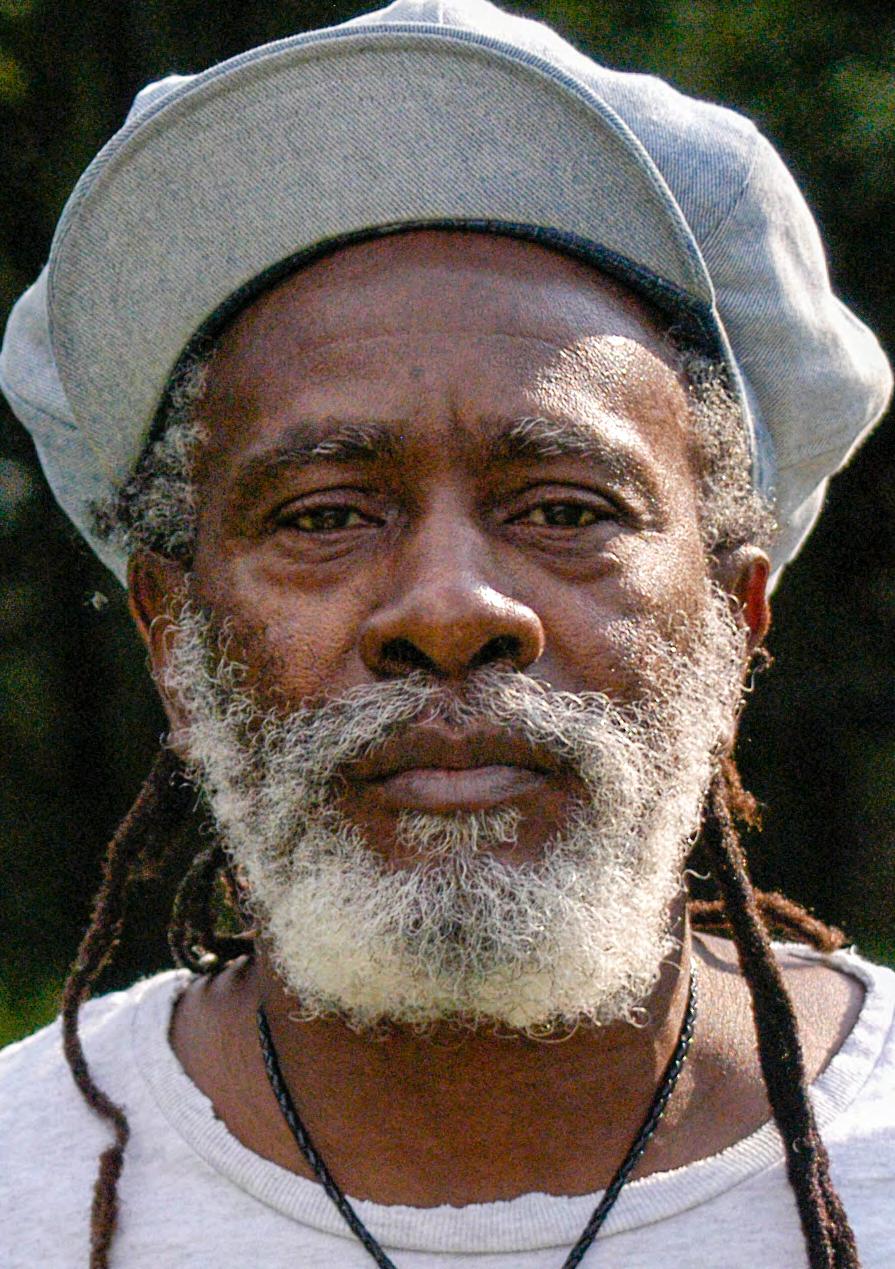
FESTIVILLE 2022 SUMMER 2022 130 FESTIVALS REGGAEVILLE FESTIVAL GUIDE INTERVIEWS LION D SAMORA MEMORIA OMAR PERRY GUSSIE CLARKE THE MOVEMENT BURNING SPEAR CLINTON FEARON TANYA STEPHENS UB40 ALI CAMPBELL FEAT

BACK TO NORMAL

Oh, what a joy to go out and link up with people again after two years of restricted meetings and online events! As countries learn to deal with the global pandemic, more and more places and locations open up for events, including our beloved summer festivals. That’s why, for the first time since 2019, we will have a printed edition of Festiville once more (available only at SummerJam in Cologne). Both versions, online and print, list 130 festivals all around the world. As always, we advise you to check our daily updated agenda @ REGGAEVILLE.com for news and additional details.
BACK TO STAGE
While all artists are excited about being back on festival stages and able to deliver their music live, the return of Burning Spear is a special occasion that we honour with the cover feature. The veteran will be on his first real tour since 2010 this summer, including dates in Europe and the US, and Reggaeville managed to ask him a few questions about this and future undertakings.


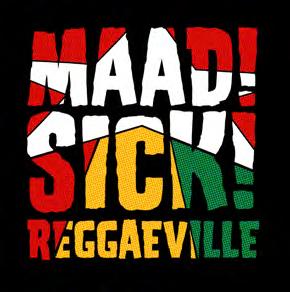
Other celebrities we spoke to in this issue are UB40 feat. Ali Campbell, who reveals details about the new album Unprecedented that features some of the last recordings of the late Astro; as well as Tanya Stephens, talking about her upcoming album Some Kinda Madness; and the famous producer Gussie Clarke. His interview gives you a little preview of our upcoming YouTube Interview Series Take Me Places
BACK TO MUSIC
With a total of ten interviews, this Festiville is filled to the brim with exciting behind-the-scenes-stories about artists and their new albums, and the following are backed up with a review of the release in question: Clinton Fearon (Breaking News), Memoria (What Goes Around), Lion D (All In This Together), Omar Perry (Life), Samora (Chameleon) and The Movement (Always With Me). We’ll also have a look at the new releases Playing For Change Band (The Real Revolution), Mista Savona (Havana Meets Kingston 2) and L’Entourloop (La Clarté Dans La Confusion). Many artists have used the lockdown efficiently to create a wide variety of music, ready for your ears!
BACK TO YOU
We gladly entrust this magazine to you now, hoping that you’ll enjoy the read. Also, we want to take the opportunity to thank you for every like, share and comment you left and continue to leave on our platforms – it is this interaction that carried us through the difficult times. Looking ahead, we see sunshine, live music and dancing people, and we fervently hope that one day soon this becomes the normality all over the globe, be it in Ethiopia, Yemen, Myanmar, or the Ukraine. It’s up to ALL OF US to make this summer a summer of peace, unity and understanding!
EDITORIAL 3
INTERVIEWS


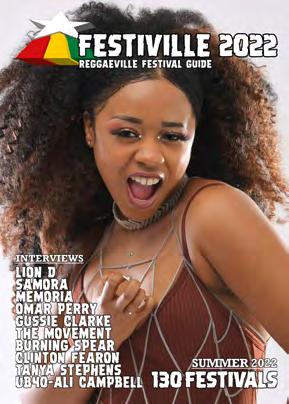






4 CONTENT
Alex Barron-Hough (UB40 ft. Ali Campbell)
Alex Sorin (Omar Perry)
Augusto Stahlke (Memoria)
Chance Rajkowski (The Movement)

GAFO (Lion D)
Jeff Preis (The Movement)

Joser Cavada (The Movement)
Julian Schmidt (SummerJam, Burning Spear)
LiviPix (Lee Scratch & Omar Perry)
Prince Agyemang (Samora)
Steve James (Tanya Stephens & Diana King)

Steve Topple (Bob Marley Experience)
Ursula ’Munchy’ Münch (Gussie Clarke)
Valentin Campagnie (Clinton Fearon)

CONTENT 5 INTERVIEWS 6 SAMORA 22 OMAR PERRY 36 CLINTON FEARON 54 MEMORIA 68 LION D 118 UB40 FEAT. ALI CAMPBELL 130 THE MOVEMENT 142 TANYA STEPHENS 156 BURNING SPEAR PHOTOS 78 SUMMERJAM 108 BOB MARLEY ALBUM REVIEWS 102 L‘ENTOURLOOP 104 MISTA SAVONA 106 PLAYING FOR CHANGE FESTIVALS 80 JUNE 84 JULY 94 AUGUST 100 SEPTEMBER & OCTOBER FEATURE 110 TAKE ME PLACES: GUSSIE CLARKE PUBLISHER REGGAEVILLE.com EDITOR-IN-CHIEF
PHOTOGRAPHERS
Julian Schmidt - julian@reggaeville.com
AUTHORS / EDITORS / TEAM Angus Taylor,
Gardy
ADVERTISING advertising@reggaeville.com IMPRINT FESTIVILLE 2022 DOWNLOAD PAST EDITIONS @ REGGAEVILLE.com/FESTIVILLE/ Copyright © 2022 Reggaeville.com All rights reserved; reproduction in part or
is strictly prohibited without
consent or authorizati-
the publisher.
within Festiville Magazine are
contributors and are
publisher.
Björn Fehrensen
Stein, Gerry McMahon, Marox, Steve Topple, Ursula ’Munchy’ Münch, Veronique Skelsey LAYOUT Peter Pusch
whole
prior
on from
Opinions and views expressed
from
not necessarily shared by the
INTERVIEW SAMORA

FEMALE EMPOWERMENT
HUMAN CHAMELEON
BY GARDY STEIN | PHOTOS BY PRINCE AGYEMANG
Female power! Samora is a force to be reckoned with. A multi-faceted, iridescent and, most of all, self-made artist who knows what she wants and works hard to get it. Born and raised in the tiny South American country of Suriname (which is inhabited by less than 600.000 people), she pursued her dream of becoming a singer in the Netherlands –undeterred by parental dissuasion, financial hardships and fake friends.

Her album Chameleon is a perfect reflection of her versatility, and the apparent ease with which she handles songwriting, performance and vocal delivery hopefully serves as inspiration to many others out there.
Reggaeville had the pleasure to talk to Samora and learn a lot about her background, personal heroes and the stories behind the Chameleon songs.
I was born and raised in Suriname, I lived there until the age of 14. Then I moved to Europe, to the Netherlands, to study music back in 2006. I wanted to make music, that was the main goal, so I did some auditions for schools. I think I was five years old when I knew I wanted to make music, and the thought never left my mind. So, I was just pursuing the dream in the Netherlands, but I really had no clue how to do it. I didn’t know what style or which side I wanted to go to, so eventually I ended up registering for a competition, I remember it was Flavorland, it
was only for bands and back then I was just performing with DJ, so then I started my first band to enter the competition. We did the audition and I won the show, and from that I got more serious in finding bookings, producers, a direction for music.
I kept going until 2012, only doing shows, and then I decided to take a break to focus on what genre I’m going to do. The thing is, as you can see on the name of my album as well, I love music so much that I literally cannot choose! Like, I know you have people that traditionally just love one style of music and it’s one style that speaks to them, but for me, I love pop, RnB, funk, I can listen to any
Let’s talk about your provenance first… where do you come from and how did your journey bring you to Europe?
INTERVIEW SAMORA 7

8 INTERVIEW SAMORA
type of album and get my inspiration out of that, so I just started making pop music and funk music, I could not find a direction. Then I met this producer called Dutch Flavor, and he said, “You really love reggae, you love pop, you love all these genres, then let’s just put it all together!” I thought this was the most brilliant idea, so we came with the first song called Mama Said. I think that was back in 2015, and lots of people had to get used to it because it was pop with reggae and other influences, so they didn’t know how to place me. I think it took the audience, the media, the people around me at least two years to really see like “Oh, this is really her style, we like it.” And from there, the whole concept Samora basically existed and grew into what it is right now.
And is Samora your real name?
Yes, that’s my real name, I’m born with the name Samora! I’m bad at band names… to be honest, the first time I told my band that I had a name, I said “I will call us the Butterflies!”, but the guys said “No!!! There is no girl in this band, and you are gonna call us the Butterflies?” (laughs) I was bad at finding names, I tried one more week to find a name, but then I said “I cannot find something that fits, so we will just take my own name, Samora”, and somehow people don’t really realise that it is my name, so I’m very lucky that the name sounds like a band name as well.
Yes, it’s unique! What were your musical influences when you grew up in Surinam?
All music that I wasn’t allowed to listen to! (laughs) I grew up in a very singing family. On my father’s side, one of the best singers in Surinam was one of my uncles, Max Nijman, so I was seeing lots of shows, I saw them playing in bands and doing music and stuff. And from my mother’s side I had to go to church every Sunday, and I had my uncles and my aunties, they were lead singers everywhere! I grew up at home with gospel music and just normal radio songs, and, without my mother knowing, I was listening to all the music I was not allowed to listen to.
You know what’s so funny? I got a Bob Marley album, and I listened to it and at first, I was like “I don’t like this, I don’t understand nothing!” And then I got a Buju Banton album and I was sold! I was so in love with this music, I thought “Oh this is so good!”
And I knew my mum was going to kill me, so I would wait until she went to work at night, then I would put it on and listen to the flow and everything… Those were my two albums that I had, and then I listened to songs that are not really on the radio, like Celine Dion, Whitney Houston, this singer called Selena back then, I was super fan of her as well, the pop genres, and lots of reggae, literally every style of reggae. Some songs I don’t even know their names and I’m like “I know this song from when I was five years old!”
I think since I was young, I still listened to lots of variations and different styles of music. From my mum I wasn’t allowed to really make music, she thought like you know music is not the thing you should do, but because I loved singing so much, she placed me in a gospel choir. I was eight or nine years old, and from there I started to learn how to sing leads, how to warm up my voice, how to sing in groups, how to harmonise, so I got the basics for singing in the choir before I moved to the Netherlands.
Did you move there with your parents?
I moved with my mother and my sister. My parents were divorced when I was two years old, so I grew up mostly with my mum. She just asked us what we wanted to do, I wanted to do music, my sister wanted to become a doctor, so my mum sacrificed to come to the Netherlands … and eventually we both did it, my sister is now doctor assistant and I’m doing music!
Did you learn to play an instrument as well?
Yes, I had to learn an instrument for graduation. My favourite instrument is the bass, I really love bass a lot, so I picked that for graduation. Unfortunately, I also love to have long nails (laughs), so after a year I said this
INTERVIEW SAMORA 9
might not be handy for me, but I do love the bass. I think as a kid the bassline was the first thing I always heard in a song or remember or follow. And also, if I can hear it and do it with my mouth, then I can also play it and I don’t need to read nothing in order to play the lines, it felt easy and kind of natural for me to do it, but I haven’t played bass since 2013.
You really do a lot! I read that you are not only writing the songs and singing them, but you also edit your videos, you design as well… is this something you taught yourself?
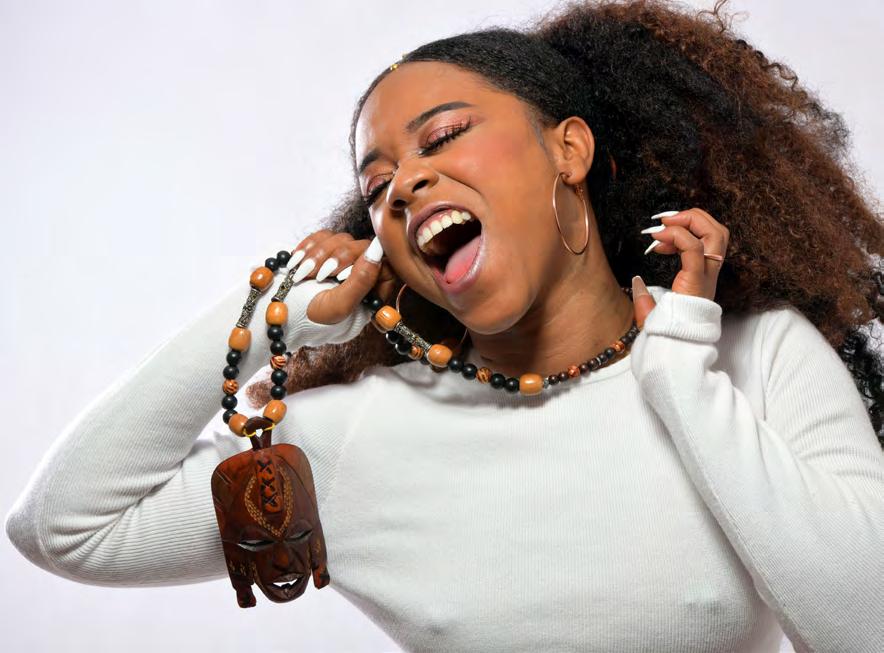
It’s something I had to teach myself during the years. I think it started with helplessness, feeling helpless around 2014/15 when I was trying to find my style, everything was so expensive! I was a student, I was working full time, I was paying the school, and it was hard for me to find people who believed in my product. People were more like “If you want to do something you have to invest, so the video will
be €1,000, the cover will be €500… this will be that… “ The prices were overwhelming for me and it brought me to a state where I said, “I’m gonna make my covers myself, design my website, I’m gonna do everything myself!” So I just started to practice on YouTube with lots of films, then I started making my website, my logo, I designed on paper, there was one girl who helped me with the logo, and beside that I did everything myself. Even managing, because I noticed that I would work twice as hard as the people around me… when I said “I don’t like this or that on the cover”, it would take 2 or 3 weeks before things would happen, so all of this just pushed me to do this stuff myself until 2019. I fully managed myself with shows, booking, recording, releases, just everything.
Wow, respect! That’s a lot…
That was really a lot, yes. And then, after my album release, I basically got so busy… the year before I had a tour with Open Season
, 10 INTERVIEW SAMORA

and then I met Res Staudenmann and I felt that he was the male version of me, someone who doesn’t stop until the work is done. The order and structure and communication, everything was just so perfect, so I called him around December 2018 and asked him to consider becoming my manager. He wasn’t a manager or anything like that, but for me he was a walking manager, I was like “You got skills!” And he said, “Ok, because you are so passionate and you work so hard, it motivates me to invest my time in your work as well.” So we teamed up and then everything started to go really fast from 2019.
I think sometimes people are meant to meet to make things happen. I also saw that you design clothes as well… Yes, I’m busy with my merchandise, some hand-made clothes that I’m also designing right now. If you go on the website you will find t-shirts, pants, sweaters, bathing suits, just everything with the Samora logo. This is stuff that I like to wear, and people always ask me “I want something like this!”, so now it’s there for fans, friends and strangers to order it.
You will definitely have a lot more fans with your new album, so let’s talk about Chameleon now. When did you start to work on that? I started to work on Chameleon last year. The eight releases that I did last year were songs that were supposed to be on the album as well, but due to the lockdown there was so much I had to tell, so much I had to let out… I think I wrote 27 songs, and we decided to pick out the strong songs to prepare the people for the album release. That was last year with some singles, until the end of the year I did the song with Turbulence that was the first single from the album. So, let’s say 12 months I worked on writing the album and preparing everything.
How about the production, did you work out the tracks with the producers or did they send them to you?
Because I’m working with Res and Kiro, they know me like the back of their hands, they
know what I like, they know specifically “This song will fit Samora well.” Somehow, every time they send me an instrumental, I’m like “Wow, I want this!” They would send me the instrumentals, and wherever I am, on the bus, on the train, just anywhere, as long as I have my earplugs and a pen and a paper I can start writing. So, from there I worked on my lyrics, and what happens, it motivates me when I work fast, most of the times I work one or two days on a song, it’s seldom that you see me work seven days or more on a song, unless I really want to go deep into a song or unless it doesn’t feel right yet with a melody. It also motivates them to give me a next track and a next one, and before you know the album is done!
Which was the first song you finished?
The first one was Pon The Front Road.
Oh, and now it’s the first one on the track list as well! I think it’s a great way to start, so much energy… a livication to the ladies, right?
Yes! You know, I love to use art in music, so with Pon Di Front Road it’s a sad and inspiring story at the same time. I was reading an article about a dancehall dancer in Jamaica, Bumper, and due to a stunt, she sadly passed away in a club. But the thing was I was so impressed by her lifestyle, she was a single mum that really looked wealthy and good, and I was asking myself where all her money came from. She would literally make $2,000 or $3,000 a night, only for dance battles! And she worked herself from a single mum who had nothing to a lady who was living in a big house and was living the good life, so that inspired me a lot. I just noticed in this moment that it doesn’t matter what you do, you can be good in anything on this planet and make yourself a well-established person, so that’s why Pon Di Front Road is written like that. I was really impressed by her, just from dancing, I didn’t even know that was possible.
It’s a very empowering song… as is Precious, a very powerful song for the sisters out there,
12 INTERVIEW SAMORA

INTERVIEW SAMORA 13
and it’s the only video out so far, right?
Yes, Precious is now the first video that is out. The second video that will be out is Tears, and then the third is Pon Di Front Road, we also shot a video for that, so this will be out as well.
Did Precious have a special inspiration as well? Is it a message you missed growing up maybe?
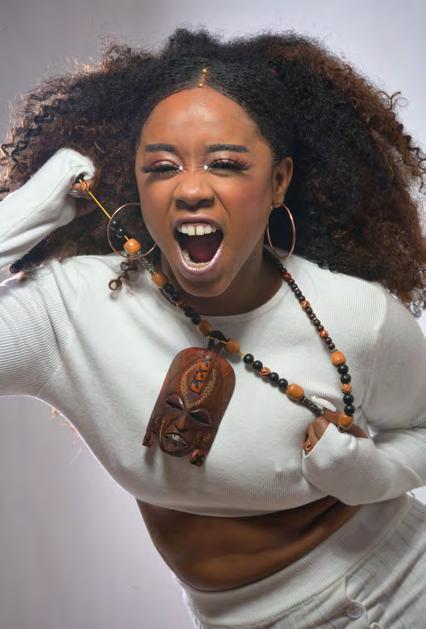
I grew up in Suriname, and the majority of the people living there are black. Sometimes when I said I want to become a singer, everyone will laugh and say “Ha, this doesn’t exist, we Suriname people we are not up there, it will not happen!” And the more people would say that, the more I wanted to prove them wrong, because it’s what I feel. The second thing that inspired me is that the majority of the girls that are following me on Instagram and social media are black girls, and I get lots of nice DMs from them. Most are like “You are a Queen, you are so fabulous, I wish I could do what you can do!” and I am like “You can do what I can
do! You really can!” and it’s like other people inspired them, and you also inspire me by the small things you are doing, and if you feel like you want to live from your talent, you can do it! And then the story comes, “No, we are born in a society where black and white…” and the whole argument starts, and I’d be like “Don’t focus on that, it is so easy to play the victim!” I get it, lots of people are the victim as well, but what do you do? You have to rise from that! So based on that, what I was experiencing in conversations, sometimes I could get through to someone, sometimes they were really stuck in their mindset like “No, this is how life is for me, you don’t know what discrimination is, your skin colour is not as dark as mine…” It would become a useless conversation, so I thought maybe the music will help, a song will help. I started writing it and the chorus just came out, (sings) and I was like “We have to record this!” I’m happy I inspired a few, I got a lot of DMs from some unexpected girls as well, so it did inspire some people already and it might inspire some more.
Definitely! It’s just starting to be known, it sure will reach more. Another song that I find very personal is Tears, you already mentioned it. Is it a personal story that you want to tell people?
Yes, it definitely is… you know, I sometimes look back to where I come from and I feel thankful, blessed, the feeling is indescribable. Like I told you, it was a big struggle for me from 2014 to 2018 to really find the audience, it took lots of crying, I had a few deals with labels and managers that went wrong, everything would just go the hard way. With this song I just wanted to write that down, the tears and the pain and changing this pain into motivation, it took a lot of me to do that. I was lucky enough that I never came to the point where I would give up, I would just scream at myself sometimes “You have to work harder!” (laughs)
In the beginning, when you listen to the song, it’s almost like I’m singing about someone who is breaking my heart, but that’s from the
14 INTERVIEW SAMORA
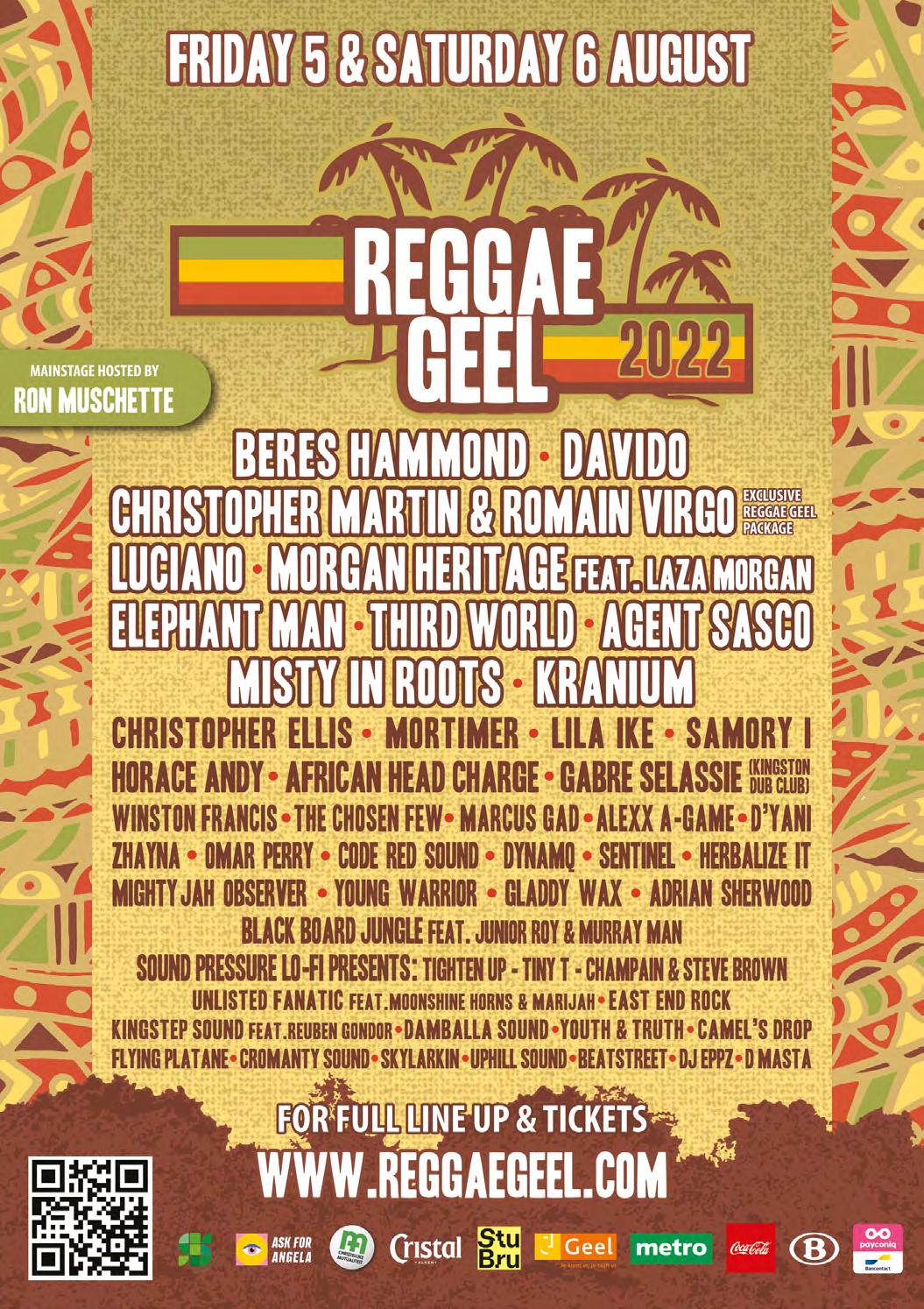
people around me who made lots of promises and it didn’t happen. They don’t realise the impact that it left on me, even though I went on, even though it felt like nothing happened to me, it did break me down, it did make me cry, it did make me sad… so, yes, the tears that I cried to be where I am today… I was a drama queen for a while! (laughs)
“The more I felt pain the harder I worked!” I really love that quote on your IG! Let’s talk about the features next, there are so many people on your album… are these contacts you had before or did you request them especially for the album?
(laughs) Let me first say this, back in 2009 in the Netherlands, I had a really hard time to study, coming from South America to Europe and all that. I had a playlist with Lutan Fyah, Turbulence, Anthony B, Gyptian, almost all the names on the album, they were on my playlist. And their voices motivated me to go through the hard classes and adapting to the European style. So I said to myself “I wanna work with my heroes first, I don’t wanna work with features because it’s gonna make me famous or whatever.”, I didn’t have nothing like that in my head, I just thought these
guys are my heroes! I started with Lutan Fyah, I remember being his number-one-fan, I loved his style, his music, everything. Then Turbulence as well, the song Never Knew was on repeat. Gyptian, Anthony B as well…. And I just know in my heart that I’ll ask them and it’s gonna work. I don’t know how I knew it, I just felt it. For example, with Turbulence, I was taking a powernap once, I was sleeping and I woke up and I just had this voice in my head saying “Today is the day! If you contact him today…” and one hour later he was on the phone with me, so… yeah just based on the connection that they didn’t know that I had with them, and when I approached them, each one of them was so amazing, lovely, respectful, and especially open to just work with me without any hesitation or trouble, so it was just flowing so well.

Did you meet Dr. Ring Ding in person? He is a German artist, so I am interested in that connection…
(laughs) Dr. Ring Ding, oh I love this guy, his energy! When I am around him, I just smile constantly, I cannot stop smiling. With him, it was 2019 or 2020, I was invited by a DJ to open up his show, he had a tour and this big guy coming in, and he was so funny! I just couldn’t stop laughing and at the end of the tour he said, “We will make a song together!” So when we were working on My Way, it is a ska beat, I wanted that for diversity, I thought I need someone that is the master of this, someone that fits in there, and then it was “Dr. Ring Ding!” so I sent him a WhatsApp…
What about Jah Mason?
Same, I also listened to his songs when I was young, My Princess Gone… there was this radio host that was coming to Switzerland, and because she would play me every week in her show, since 2019, I said to her, “I really would like to thank you, so if you gonna be here, come and sleep at my place and we will eat and go out.” And then she said, “I have a really good friend I think you should work with, he’s called Jah Mason” and I was like “Woooow yes!” (laughs)
16 INTERVIEW SAMORA
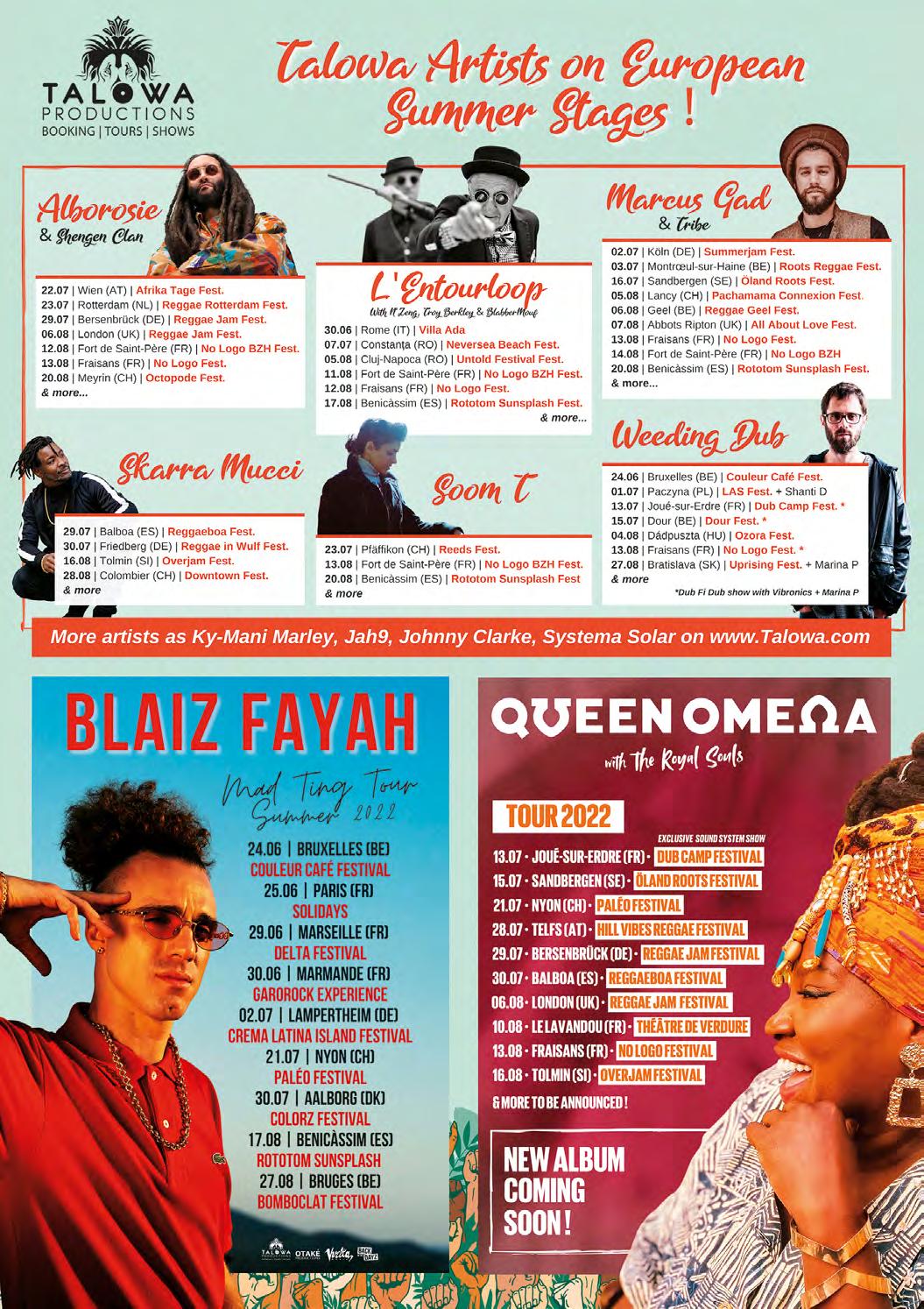
I like this song very much, Let Them Go, this idea to let go everything negative…
You cannot stay angry or sad, you go through the process and then you really have to let it go! It was also a perfect subject for Jah Mason, so we blended really nice.
I have to admit that I didn’t know the other three features… Tuffarapha, Guillaume Hoarau and La Tifa. Can you introduce each one of them briefly?
Yes sure! Tuffarapha is a producer from Switzerland I met in a club, I’m very impressed about his music, about the way he works, his instrumentals. He is also a singer and rapper. We decided to do a song together, Too Bad.
And Guillaume Hoarau?
He is a footballer! (laughs) A footballer that just loves reggae music. He’s been a good friend as well; we had a few sleepovers and live performances… this guy can play any

instrument! He plays football, but for me he’s just a born musician, so we just make a song together, Take It Easy.
And now La Tifa… I know there is a Dancehall singer called Tifa from Jamaica, but that’s not her, right?
No, that’s not the same. La Tifa is from Columbia, I got to know her on Instagram, she just has a wonderful voice and a beautiful energy. I got a song from a Portuguese producer, and while I was busy with the song, I was like “I haven’t worked with a female yet”, so I was searching for something exotic and she was the first that came to my mind that was not in my style or my range… you know, she makes reggae but with exotic language, and that is what made it so attractive for me.
And for the listeners! She sings Spanish, Guillaume French… that’s beautiful! I also wanted to ask about your mother language, do you ever sing in Surinamese?
18 INTERVIEW SAMORA
It is basically Dutch, you know, because Suriname was a Dutch colony. I think it’s the only country in South America that speaks Dutch! (laughs)
Do you ever sing in that language?
It’s not my thing. I tried it and people liked it, but my heart is not really there.
There is so much to discover on this album… what made you call it Chameleon?
It’s called Chameleon because it’s about different emotions, different feelings, different things that happen and also the styles are so versatile, that’s why I named it Chameleon.
Is there a song that you want to mention especially?
I think one song I like a lot is Rise
I love your vocals on that, you go so low! Yes… I’m so versatile, I can do dancehall, reggae, roots, and when I make dancehall music, I mostly have to let the steam out, so with Rise I was really able to say the stuff I sometimes don’t want to say, to just let it out.
My last question… can you name three people or projects or NGOs you think are really worth supporting?
I have billions! (laughs) I would say one of the singers I love a lot because of her fire is Sumerr, she’s a Jamaican singer, I really like her. A singer who is really cute, sweet, with a beautiful heart that’s Zoe Mazah. I follow her music, but it’s her softness and her personality that sells it to me, I really like her a lot, she is amazing.
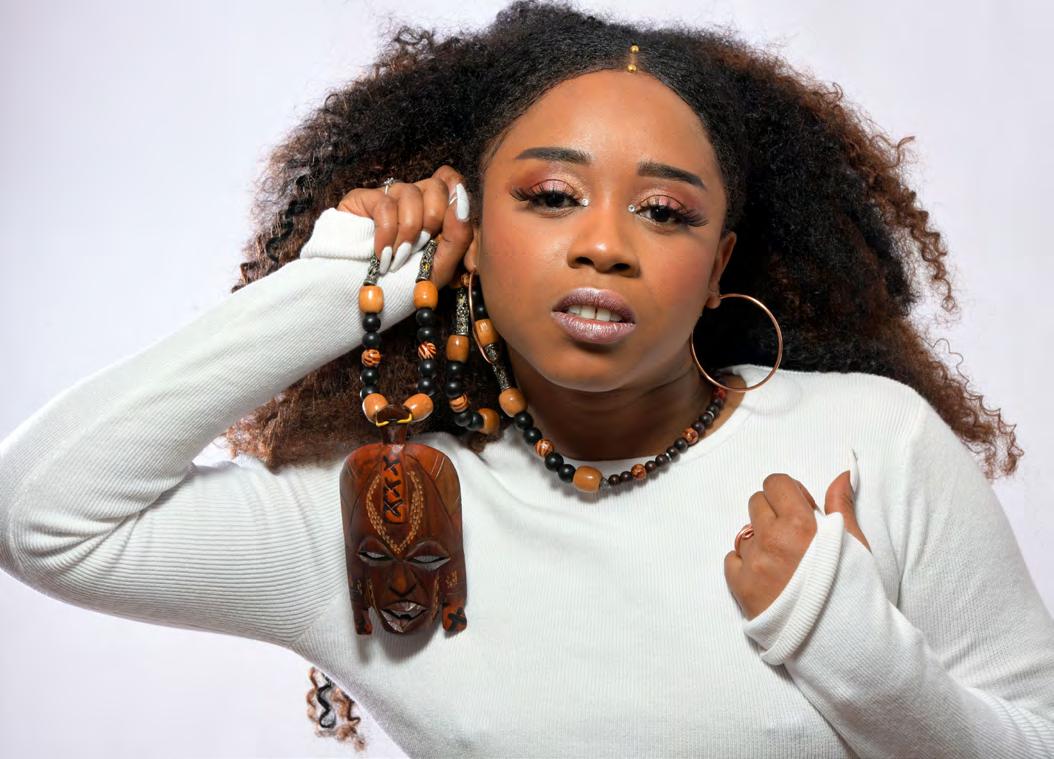
INTERVIEW SAMORA 19
Me too! I’m a big fan!
Let me see… I also have a singer from my country, Miss Anj, she is going through the same things I’m going through, taking the same steps, and I’m proud seeing someone from my country in this category, cause when it comes to the reggae scene and you check how many Surinamese girls are there, you’ll find two or three, and most of them are not really active no more. I think I am one of the most active Surinamese singers at the moment. So, Miss Anj, she is coming this or next year with her album.

Thank you! I also love what Res did with the Female Reggae Voices riddim, I love this togetherness!
Support is so important! I’ve noticed myself that I wouldn’t see these girls really following each other before the Female Reggae Voices came out, you know, the industry really puts us against each other and then later they say “Why do women not support each other?” I think the support has to start before we even make it. We see each other, we know we are there, we see the releases, it just takes your personality to press like and say “Keep doing what you’re doing, I’m doing the same.” With this said, I think I am following over 20 female artists, and if they have something out, I will always have them in my story, whether they like my stuff or not! It’s what I want to do, my tribute to the industry for the females.
Is there anything you wish to add? Chameleon is my new album, and I’m super proud. It’s an album made from the heart, without thinking in a strategic way. I hope with this album people will enjoy a nice summer feeling, winter feeling, any time of the year. I hope it inspires others that are busy with their album as well to go ahead and finish it. I hope to get good reviews, also some strong feedback in case people say “I would have done that differently”, maybe I will consider it, maybe not. I am happy where I am right now, also with the support, also with you! When Res said Reggaeville, I was so happy because I wanted to do an interview with you guys for a very long time, so from the bottom of my heart I really want to thank you. It feels like this album brought a blessing for me as well, so thank you! I like your interview too, it was humble and respectful, you made me feel really easy, thank you for that!
Thank you also for your time and your music!
20 INTERVIEW SAMORA
SAMORA - CHAMELEON June 3, 2022
All eyes and ears on… Samora! This superwoman from Suriname has spent the last few years honing her skills, meeting the right people and steadily building her empire. What the crucial combination of talent, determination and connections can lead to is now revealed by her new album Chameleon

Just like its namesake, it oscillates between different vocal flavours of singer Samora and a host of top-level guests and various colours of music, fusing bouncy Afro-Caribbean styles with highend European productions by Res Staudenmann and Kiro MusicMaker. They are responsible for most of the 13 tracks on the release, giving it a recognisable sound.
Starting with a banger, Samora makes it clear from the beginning that she is serious. Pon Di Front Road, fittingly subtitled Independent, is a powerful affirmation of her self-made success, inviting fellow females to proudly step into the spotlight. Similar in tempo and message, Precious is a shout-out to all black girls out there: “Black girls, big batty with the small waist, curls. Melanin, brown skin, we are the winner we are not the victim!”
Other tracks in this fast-paced category are Never Thought and Rise. Less musically elaborate, the latter gives Samora ample opportunity to vent her anger at certain people who didn’t keep their promises, and her voice reaches remarkably deep.
The intimate Tears, produced by Upsetta Records/Loud City Music, the singer lets us in on the hardships she encountered along her journey, sounding emotional and almost vulnerable, but at the same time stating that she’ll nev -
er give up: “The only way we strike back is with my success!”
Seven great artists share the mic with Samora, and all of them bring a special touch to the playlist. From the pacy ska-tune My Way with Dr Ring Ding via Tuffarapha on Too Bad to the beautifully laid-back Reggae I’m In Love featuring La Tifa from Columbia, the guest singers not only contribute their own vocal flavours, but also different languages. Thus, the aforementioned La Tifa sings in Spanish, while the footballer-turned-singer Guillaume Hoarau casts a spell over us with his passionate French expression in Take It Easy
Passion comes in with the remaining three names, too, all of them well-established artists from Jamaica. First, Jah Mason joins her on Let Them Go which sings about the need to let go of evil vibes and feelings within and around you. “When I walk is with my head up high, lioness I conquer, me no follow no hype!” Next, we hear the ever-delivering Anthony B on a love song called All The Way in which Samora showcases her full vocal potential once more. And, as all good things come in threes, Please Be Mine features a fantastic Turbulence. The bubbling tune was the first single release last November and was greatly received so far. Sweetness!
A final surprise is the unusual riddim of German producer SoundCham. His contribution Is There Any Left plays with trap beats, acoustic guitar lines and bewildering sound effects on which Samora soars in a lament of waning love. Feet-shuffling, head-nodding and goose bumps are guaranteed with Chameleon, a wild and exciting ride through genres, styles and voices.
by Gardy Stein
ALBUM REVIEW SAMORA 21
INTERVIEW OMAR PERRY
REFLECTIONS ON LIFE

A LEGACY TO MAINTAIN
BY STEVE TOPPLE | PHOTOS BY ALEX SORIN
It has been a turbulent few years for Omar Perry: losing his older brother Marvin in 2019, and then the death of his father Lee ‘Scratch’ Perry in 2021. All this came in the midst of producing his new album, prophetically entitled Life. The project, which started during the pandemic lockdown, sees Perry sweep across genres and styles while delivering a multitude of messages about life, the world and the system. But how has it been for him growing up in the shadow of his father’s legacy? What has the path into music like? And how has the sudden death of Lee changed his outlook? Reggaeville caught up with Perry to find out all this and more.

This is your first interview with us – so for the readers, tell us: how did you get into music as a career?
It’s something that expanded throughout my life. It began from birth: I grew up in the Black Ark Studio - one-minute things were all right and then things start going a little bit downhill. My father destroyed the studio and things started going in a different direction. He stopped singing and producing – well, he was still singing but he stopped producing and stopped doing any kind of production. But in those days before all this happened, I used to play drums in the studio when I was much smaller, with my brother Marvin. He was more the singer but we’d both come with the ideas. We’d sit and we’d write some stuff and we make up things and put things together. So, we made a group between me, my brother and my sister – the Upsetta Juniors. We started doing some small performances around Jamaica, and then one day we said “You know what, let’s start to produce some artists”. But eventually we thought, we’re producing all these trackswe should do something for ourselves. So, we wrote a song called Positive Vibration which my brother sang and I was the backing. But, you know, life goes and things happen and eventually we stopped doing music.
In the late 90s I left Jamaica and went to the to the UK, and after living there for a while then I left and went to the Gambia. There, I started to be a DJ. I never even knew I would be a DJ, because I wasn’t really the frontman - it was my brother who was the person who leads, I was just like at the back. I enjoyed [performing] but without the limelight part of it!
So, in Gambia somebody came to me and said “I’m gonna open up a club and you will be the perfect person who can be a DJ”. I’m like “I’m not a DJ - why would I want to do that?”. But I thought I’m going to take up the brethren’s offer – and this is where everything starts. So, then I start to play music
23
INTERVIEW OMAR PERRY

24 INTERVIEW OMAR PERRY
- normally I’m not a DJ, so for me if I choose to play music for my personal self it would be strictly consciousness, pure positiveness, messages. This is how I found a way to create a vibration: by sending one message from one song and just keep the message going. And then it’s like you know what the story is about, you know exactly where I’m going and how I’m presenting the music.
The show in the club becomes one of the best things going on in the Gambia area – and then boom! I met another brethren and he say “Yeah, you want to come and do something on the radio station?” And bam! Two-twos I find myself sitting in the radio station being a DJ. I couldn’t believe it; this was a bit scary because this was not really my experience - so everything can be a little bit ugh! And then boom! The radio show takes off like a rocket – it’s the number one radio station, really turn-up, really bad.
So then after I left Gambia and I came back to the UK, I start to be a DJ-slash-freestyler: play the vocal, turnover everything and start to run it. This is how I start to find my way in Europe – I started playing Germany, France and all these European countries. But one day I think I really want to change from being a DJ and be more on the front-line. As I said, I’m not really the front-line guy. But by going through these experiences, it taught me a way of how to look at the people, know exactly what they want and entertain them through music. So, I take upon myself that same character even in my performances. And then I met a brethren called Stepper Gillion who had a group named the Homegrown Band. And he asked me “Hey, do you have any songs out?” and I’m like “No, uh… I never did anything like this!”. He said “I’m gonna work with you, we’re gonna work together, we’re gonna start something”. And this is where it is my first album came from which is Man Free. And then I made another album called Can’t Stop Us which was really one of the toughest albums I ever made.
But even then, I’m doing all these things and I still don’t want to be too much in the limelight. I think I can blame myself for that. So sometimes I don’t really make that effort to really push myself out there. I have my family and really, I want to focus and spend more time with them; grow my kids the right way. It was a little difficult for me during my childhood. It’s not easy to have a father who is an artist, because everybody is loving him but then you don’t have much time with him. Yeah, he’s a star but he’s a father - you want to have more time with him. So, for me maybe in my mind I’m like ok I don’t really want to drift too much into the big part of entertainment and make sure that I share some part of me with my kids. Because I want to see them grow up and I want to teach them and I want to make sure that I’m there to guide them. That was something that I chose.
Surely the easy option would actually have been to be a frontman off the back of your father’s fame?
It wasn’t an easy decision [not to be a frontman]. But growing up, life it was really hard, especially when you don’t really have the parent that you want them to be, guiding you. It is like you end up growing up by yourself. So, for me I knew that if I had gone full force, I wouldn’t have time to spend with my family, to watch them grow, and I didn’t want that cycle to repeat. I wouldn’t be available the time that they would want me and be available to the time that they need me. So, I’m doing it halfway: I’m doing it but I still reserving my time to make sure that I can really spend it with my kids.
The thing you mentioned about being easier because of who my father is? Because of this thing that I’ve I went through I did not want to use him as my front. So, I chose a different road and I chose to try to do it myself, in my own way, and try to develop myself on my own. I want people to know me for me, not know me because of who my father is. Because then if they’re going say “Oh, here
INTERVIEW OMAR PERRY 25
comes the Scratch person” then that will put him in in front of me; it’s him they’re more talking about than me. So, I chose the direction that when you see me, you mention me first and then you say he is the son of that man.
Your new album, Life, is extremely eclectic in terms of styles and genres. Was this intentional?
In my mind I always wanted to do some stuff like this, but I never got a chance to really go for it and figure it out. One day Benwah sent me a mail: “Hey Omar I have some riddims
I would like to send you; maybe you’re going have a future album and stuff - if you want you can listen”.
So, I start to listen to some of the tracks he sent me and I said “This is weird” because the tracks go from reggae and start to change genre - and I was like “Whoa - this is exactly what I want to do”. So, I said “Okay send me send me two riddims”; he sends me two, then I’m like send me two more. Well, he sends me six and in about three days I send him back songs on all of them. Ben couldn’t believe it that I work so fast!

26 INTERVIEW OMAR PERRY
BENWAH & OMAR PERRY

It was really a special moment for me because it made me reflect, during the pandemic and this coronavirus business - it really made me understand a lot of stuff. Sometimes in life you just keep moving, and running up and down, and stuff – so sometimes you miss something because you’re not sitting down, not really focusing on yourself and your surroundings and what’s happening. At that moment, it really gave me so many vibes in my head. So, by the time I’m starting to get the riddims from Ben, all my thoughts that’s in my mind and the things that I’m thinking about, the things that I’m seeing in the world and the things that I’m seeing in my own life, I projected this - like everything was just jumping right out of my head.
It was a pleasure for me to do such an album - I think for me this is a highlight of my career; right now, here. I love where I’m at.
You’d worked with Benwah before on Man Free, hadn’t you?
When he sent me the tracks, he never told me it was him. I didn’t know. When the album was built, I wasn’t in the studio because it was Steppa who arranged everything, got the riddims and I just came in the studio to put down my voice - and I just met him once. When I found out I was like “What?!?”. It’s like a full circle: what goes around comes back, really from the beginning to this time. I couldn’t believe it. It is like a real destiny that you never planned.

I was really shocked. I was like “Where you been all my life, I’ve been waiting for something like this!”. We really clicked. It took us roughly about two years, from the time I gave him everything - because there was no rush.
So, for me it was a good vibe. The next thing was Baco Records came in when we’d
28 INTERVIEW OMAR PERRY
finish. We never made the link with Baco before, the link just came just when the album finished. Then, the featured artists are another story. I have a track with Marcus Gad. I’ve been sitting down listening to a lot of stuff from Marcus. I love his spiritualness, the way his voice is and where he is. Then I realise he’s working with the same booking agents. Next thing, I realised he comes from New Caledonia – and about 15 years ago I went to New Caledonia and I spent some time there for a few shows. I’d never been to that side of the world before and it was really uplifting and eye opening for me. I love the vibes. I love the country. I love the people.
When we’re doing the album, I’m saying to myself “Which kind of artist I would like to
have to feature”. It didn’t take me too long to reach Marcus. We started to talk about New Caledonia, the conscious vibes, very positive. I told him I have a track I’d like him to be a part of and that was it. He said “Send me the track instantly, don’t even bother to hesitate, send it to me now”. I mean, I didn’t even lift a finger!
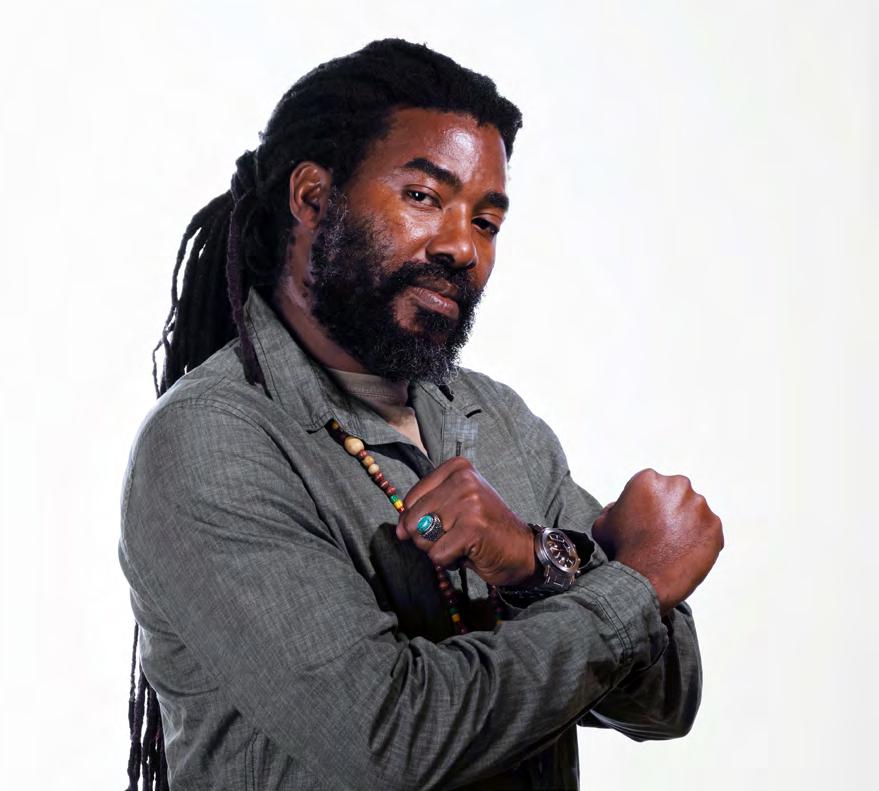
How’s it working with Baco? Because obviously they’re a really well-known label. Did they approach you after the album was done?
No. After we finished it, I said to Ben “Alright, what we do now?”. He said “Um, just like you I don’t know what I’m doing either…!”. He said to me he knows about a label named Baco Records; he knows so-
INTERVIEW OMAR PERRY 29
meone who knows them but he didn’t know them personally. So, he gives them a call: “Yeah, my name is Ben, I’m working with someone called Omar Perry… blah blah… would you be interested?”. They said “Ok send it to us”.
It didn’t even take more than one day before they contact him back and said “We are interested in this album for sure, no doubt about it”. They said “Omar Perry is an artist we’ve been listening to for a long time - he is one of the artists that we used to love”. So, they said for sure - this album, it’s really crazy, futuristic, they love everything about it. While working with them though, it’s shown that they really believe in this album and they’re doing everything that they can to make sure that this album has a good opportunity. I think for me maybe this is something that was a little bit missing from my portfolio: having a label that, anytime you release something, they will be there to pick it up and run with it.
Right now, I’m ready to move forward. I’m ready to be out there. I’m ready to be on the front-line. My kids are my big now. So right now, I’m ready for the front line and I’m not going to ease up right now. The link with Baco Records is going to solidify, to make sure that we going to do a lot of stuff in the future. So, this is this is why I know that right now I just want everybody to know that I am all in and ready for everything - no holds barred.
While you were recording Life you lost both your brother and your father. Did that change the direction of the album?
Well, I probably would say yes and I probably would say no. It really wasn’t fully-fledged when my brother passed away - the album didn’t start yet. But in that moment, yes it really hit me very hard with my brother passing away. He was my big brother and he’s the one who I look up to you. Although he had a career as well in Jamaica, he was singing a lot, and for me I
it was just fate that like really keep me in music when I could have gone in any other direction. Because as I said this is really wasn’t something that I thought about, but somehow it just kept pulling me. So, when my brother died, yeah it hit me very hard.
But when my father died it was like something was awoken in me - because sometimes you can run so far, but you cannot outrun yourself, the truth and reality. So, as I said, me as a youth I wanted to be on the back piece. When my father, my brother passed away now there is no one else - the buck stops with me.
So, have you had to assume a new, frontman role in life?
In a sense yes. The role is not only to play the role of my own, but as well to make sure that the heritage remains. So, for me I just have to focus on the album for now. But as it is I’m also having different projects that I’m going to really focus on. I don’t want to give too much away at this moment, but there is some stuff that I’m going to have to work on pertaining to him and the Black Ark situation. This is something that I’m definitely going to work on because his name still needs to be there, with the tradition. We know where the music comes from, the reggae music, the Black Ark - we know how everything goes. So right now, I know that right now I have to put on my coat. I have to put on that coat.
And how do you feel about that? After all, you’ve said yourself in this interview you’re not the frontman…!
This is probably why, when my brother died, I felt he was more into singing and definitely for the reflection for my father, he is a very good voice for that; he would be the perfect person to maintain. I’m not saying I can’t do it, and I could do it, but it’s something that I said “You know what I’ll leave that to someone else, I’m just gonna do me”.
30 INTERVIEW OMAR PERRY

I just really feel like, this really makes me feel like I have to do it. I have to do it for the sake of the family, I have to do it for the sake of the name. I’m not going to say I’m going to change myself when I become that, I’m still going to be me. But I’m going to do a few of his songs in tribute and maybe for the future we can make shows in his name - like a tribute to Lee Perry.
mourning with my family and with my kids and we sit down, we cry and we talk. I explained to them about their grandfatherbecause I always take my kids to him all the time. From when they were small, I’ve been taking them to see him. So, they all know him and he knows them. They’re going stage with him, he understands there is the connection – and I never break that connection, I’m making sure that that connection is solid.
His passing went throughout the whole world - and everybody was thinking about it, and talking about it, but I wasn’t really watching that part of it.
When it happened, I came off social media, so I really was not listening to anything. Loads of people were sending me messages. But it hit me so hard that I just didn’t want to respond to anybody. I just really locked everything off, and I was with my family;
So, we just we just leave the media thing and we’re not listening to anything. We just really pray; talk about him the as much as I can; how he grew the studio; the works that he did; the importance of him in the music world; the dub; the sample - how he used to sample things and people didn’t understand, because he just had two/four track and he makes it sound like a 16-track. So, I explain all of this to them. I just used that time to really reflect. I really was not worried about

Was it difficult for you, your father dying in the public eye?
32 INTERVIEW OMAR PERRY
what the world was saying and what the world was thinking. I just knew that I just lost my father.

Did he hear any of the album before he passed?
No, because at the time when all this pandemic stuff was going on he was living in Switzerland – and he was like “ You know what? I’m going to Jamaica ”. So, he has been in Jamaica for quite some time before everything starts happening. And I was just doing my thing and I would never expect this to happen. I know my father; he was not a weak person; I mean as old as he was. He was still on stage and rocking it. I did a tour with him, four years before and it was really crazy. I still have pictures of me and him on stage, I love the audio of me and him singing together. For me it’s just like this man was going to live forever. So, it was a really big shock for me.
Some of the tracks really inspired me to understand that life is a thing you can’t buy. Life is a thing you have to live. Sometimes you have to know the importance of what life is. So, when he passed away it really made me understand that life is fragile. You just have to live as much as you can, do the more positive things; do all the good you can because you don’t know when your time is going to come. So, it really gives me sad feelings but glad feelings too. Because I give thanks for all the stuff that he did in reggae music; that I can be here, right now, being a part of it. I’m not the biggest artist but I’m not chasing to be the biggest artist - I’m not chasing these things. I just want to know that I’m playing my part in history and in music. That this is what I want to do.
What would you like listeners to take away from Life?
Without life there is nothing. Sometimes you have to take one little time out for yourself
INTERVIEW OMAR PERRY 33
LEE “SCRATCH“ PERRY & OMAR PERRY in GENELARD, FRANCE @ GENESTIVAL 2013
©LIVIPIX
- not to be selfish, but to review. You have to review: just sit, stop, review, and you’ll see everything. Because a lot of stuff is happening but you’re not seeing it. You’re moving so fast, and sometimes some good things are going to happen. But you’re moving so fast you’re not going to see it and sometimes if you move too slow it passes you. So, it’s very important to stop for a while, look inwards and then look over.
The message is: we are the future; we have the power. Without we there is nothing. Even the politicians and the people who are making and creating things, and building stuff - without the people they have nothing.
So, we must know our power; we have to know our strength; we have to know that it’s
we, it’s us and the only way we can move forward is that we must be united. It doesn’t matter if you’re black, it doesn’t matter if you’re white, it doesn’t matter if you’re Chinese, if you’re Arabic - it doesn’t matter. We are one people, living on this earth, so, we have to live together, work together, chant together, pray together - because you only have one life.
Omar, thank you so much for speaking with Reggaeville! It was great!
It was a pleasure for me. I see that you’re a very good brethren as well and we have to keep close brethrens, when you can feel the spirit; you can feel the vibes and you are one of those. So, give thanks.

34 INTERVIEW OMAR PERRY
OMAR PERRY - LIFE
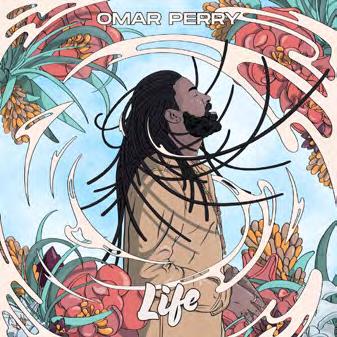
Omar Perry’s career has already stretched across more than 15 years. But now, a new label and family passings have given him a fresh sense of ‘life’ – as his latest album shows.
Life, released via Baco Music, is a timely affair – almost a tribute to his late father, Lee “Scratch” Perry, and brother Marvin. Production comes from Perry and Benwah – the collab between the two originally starting during 2020’s lockdown. The result is modern, eclectic and genre-smashing, although it has reggae at its heart. Scratch’s influence is also littered throughout – to be found in the inflections of dub musical devices and engineering.
Serious Time is a fluid and engaging merging of roots with dub engineering – notably the heavy, rhythmic, reverb on Perry’s vocal, reminiscent of his later father. This sums up the other reggaebased tracks like You’re Mine, Jah Guide Us, Chant Babylon Down and Work It Out
The title track is pure Alt RnB: hip hop beats meet lilting guitars and dub engineering. Double Edge Sword is more stripped-back Alt RnB with its soul-led drum arrangement which has flashes of trap, dub engineering and the occasional reggae musical device.
The Calling features Marcus Gad. It’s potent revival roots: harder hip hop drums meeting reggae musical devices (plus some dancehall clave-led breaks) and, once more, dub engineering.
Good Vibes features Yaniss Odua and Balik Again, the style is ambiguous – mixing elements of Afrobeats (the percussive choice and arrangement), reggae (the mashed-up bubble rhythm) and dancehall (that ‘oneeeeee-twooo-and’ x2 rhythmic clave).
Baco Music - June 24, 2022
Wah Receive You featuring Zenji Boy leans into Afrodancehall with its broken clave, lilting guitars and melodic keys – as does the Shanty B-featured Reach My Goal – but a lighter, breezier version.
Grow My Wings then moves Life into light-touch trapRnB. Super Nova furthers the trap sound, with greater use of those signature hi-hat buzz rolls, ambient engineering but still with inflections of RnB like the running keys line. And Don’t Laugh With Them is a break from everything that came before it, being straighter hip hop with just the most delicate of nods to reggae – like the broken bubble rhythm.
Perry is an assured vocalist. He has a beautifully rich, resonant and expressive voice: filled with controlled vibrato, wonderful attention to dynamic light and shade, and fascinating use of musical devices like legato and staccato. His singjay is rhythmically complex and on-point, too.
Meanwhile, the album has pertinent and thoughtful messages as well: from Serious Time’s encapsulation about the state of society and the planet, to Super Nova’s heartfelt and heart-rending rendition about the police murder of George Floyd and institutionalised racism via Chant Babylon Down’s message of resistance.
Overall, Life is a very strong and affecting release from Perry, Benwah and Baco. Musically, it’s filled with gorgeous compositions and its diversity is to be applauded - feeling like a complete album. Vocally and lyrically, Perry is on top-form and the album bodes really well for a future relationship between him and the label.
by Steve Topple
ALBUM REVIEW OMAR PERRY 35
INTERVIEW
CLINTON FEARON

BREAKING NEWS
A NEW CHAPTER
BY ANGUS TAYLOR PHOTOS BY VALENTIN CAMPAGNIE
The last two years have been tough for Clinton Fearon. He started his eighth decade on earth under pandemic restrictions, unable to perform before people in a physical space. At home with his wife Catherine in Seattle, he was besieged by bad news of political, societal, and environmental turmoil - and of a personal nature (the 2020 passing of former colleague in the Gladiators, Albert Griffiths, and a year later his mentor at the Black Ark, Lee Scratch Perry).

Yet out of this troubled time he has bounced back. He and Catherine began putting on weekly online acoustic concerts during the covid lockdowns, which saw him through the pandemic. And now he has released a new album, Breaking News, with France’s Baco Music, written in response to, and making sense of, the turmoil. Swapping his usual Boogie Brown musicians in Seattle for a crack team of French players, Riddim Source band, he has found the chemistry to translate songs that plough a new furrow of rich creativity. The result is perhaps his greatest album in ten years.
Angus Taylor spoke to Clinton via video call, one early Seattle morning, as the singer-songwriter was preparing for Breaking News’ release. The last time they did an interview, 18 months before, Clinton had just heard of the loss of Albert. This Festiville interview took place in the wake of the Robb Elementary School shooting in Texas (the bad news Clinton was counteracting has continued apace). Back in 2020 he sounded understandably hesitant, searching for words to respond to what had
happened. Now, despite there being no improvement in world events, he sounds enthused, sharp and full of vigour. He seems quietly confident about the album. There’s a sense that he’s happier with this record than any he’s made in a long time.
He explains why his new French colleagues remind him of his favourite foundation musicians in Kingston - and how he was happy to give up playing bass for the majority of the sessions. He is passionate about how to write a good song that makes the world a better place, and why the musical therapy he gives others is also therapy for him.
INTERVIEW CLINTON FEARON 37
Like many people during the pandemic, you felt the bad news coming from the media was adding to the daily struggle of living. Where most people just switched off and watched light fiction instead, you decided to counteract it with your own album of good news. I think the news is the news and not all of it is nonsense. I think they pile it up so much to make a good story, a catching story, but it doesn’t mean it goes exactly like that. And the lie part is what has helped to mess with people’s heads. How politicians also handle the whole thing. How some professionals who you think would really take people’s situation at heart, just use it for their political purpose. Which causes huge unrest across the globe. And the unrest is still going on. I wouldn’t be surprised if that is the reason why we have so much shooting and war popping up all over the place. People don’t feel steady.
It’s been a tragic week in the US with the Texas shooting. The cost of living is rising, there are food shortages. Breaking news has a double meaning. Breaking news is news coming through. But also bad news can break people under stress. (laughs) Yes, exactly. And if you notice bad news is what sells. So as the song [Breaking News] says, how mama gets hit and run it’s rise up angry waving fist. But there’s no help because hit-and-run and gone, no one cares. But the end of the tunnel is like “Hey, still can’t give up”. You’ve got to trod on because we’re alive. Once you’re alive you can’t give up. You keep on trodding.
Bad news also causes people to argue and creates engagement for social media platforms and their advertisers. But you used social media during the pandemic in quite a positive way with your regular online acoustic concerts.
Where it started out was kind of like therapy for me. Not being able to go out and perform like I usually do and it’s like you’re stuck here. I remember when Catherine came up with the idea. Right away, even though it’s kind of scary, I felt like this was something
I needed to do. As we did it more and more, even though it was a struggle because none of us are professionals, technology-wise, we got such positive feedback and the more we realised “It’s doing all of us some good”. Just hearing friends and fans from all over tuning in like we’re at a virtual concert. You feel connected. You don’t feel alone in the struggle.
And those vibes make me just want to continue to do it. Because it’s doing its job. So I’m feeling good Karma. I’m feeling blessed. I think this album is saying a lot of that. Like the last song that says I Am Thankful. It’s really literal. I’m really thankful for being able to survive doing what I love and loving what I do from long time, even though the struggle is hard.
In The Making Of mini documentary on YouTube you say you never really made demos until this album. I don’t really make demos. I keep things in my head and then go to the studio and hopefully it works. Sometimes I don’t like how it sounds when you hear everything together, so you shift course a little bit. But most of the time it works. When you do a demo it helps get it out of your head. You can listen and add to it and take away from it. Doing it this way taught me something because going back and listening to it and hearing others, especially the musicians in France that interpreted it the way they did, I think they did an excellent job. For example I thought I was going to play four or five of the bass lines. But Thomas [‘Mato’ Cirade] did such a good job, I just played two. (laughs)
Was the decision to do a demo based on geographical distance?
If I was there, we would just rehearse them and I would point out my ideas. But because I’m not there and they needed to prepare by the time I got there, we did the demo. It helped me to see what the song is like before even getting there. And it helped me to tighten up certain things. It’s not like me going in the studio and doing it myself or if
38 INTERVIEW CLINTON FEARON

the musicians are right there. So I make it as clear as possible so they can interpret it right.
You’ve made a lot of albums with top musicians from Seattle. For History Say you went back to Jamaica and made an album with top musicians of your generation from Jamaica. Now you have made an album with top musicians from France. Why did you decide to make the change and use the French Riddim Source band?
That was the collaboration to do this with partners, with Baco being half-and-half with us in the production. And the musicians are there and we know that they are good. I used my musicians for so many years, so something different is ok. Plus because we played together already [during a live session promoting History Say in 2019] and they are excellent, I figured it wouldn’t be a bad thing.
But the pandemic is part of it too. It’s changed how things go. Many people ended up doing other things to survive. The band can’t go or some of them don’t want to because they’re afraid of what’s going on [with Covid]. So it’s not just one thing. It’s several! (laughs) But it all ended up to be a good thing. I love the mix. I love how It’s mastered. I love the sound. I love the musicianship on it. I’m just waiting now to see what the public has to say and how they absorb it.
Let’s talk about some of the musicians. You’ve got Simon [‘Saymon’ Coutant] who is a top drummer and has played with many of the greats.
Simon has studied all the drummers back in the 70s and 80s. But he has his own lick. Sometimes you might hear a little piece of Carly, a piece of Sly, a piece of Horsemouth, a piece of Barnabas, a bit of Mikey Boo. You hear a little piece of all of those cats. But in a good way. It’s not like he just took their thing and gone with it. But he’s influenced by all their good parts. So when he does his own thing and interjects all of those parts he does it sensibly.
In the Making Of video you tell the keyboard player, Muctaru Wurie, that he reminds you of Gladdy Anderson.
(Laughing) Yeah, because of the way he punches the piano. And the little backstabs that he does. Gladdy was good at those. Some sixes and some sevenths. You know who was good at that on guitar? Lynn Taitt. Just throwing in some little one note and some two note things - quick, but it’s perfect.
You mentioned two very serious people there. Gladdy, quite aside from his piano playing, used to run auditions at Treasure Isle. Lynn Taitt shaped the sound of rocksteady. What are your memories of those two people? Not too much Lynn Taitt. But Gladdy, yes. The first time I went to Treasure Isle it was Gladdy and Peter Tosh doing the audition. I went there with my little guitar and my two friends. We called ourselves The Brothers I was doing this song and I have my little guitar and I was showing them how the thing goes. And Peter took up his guitar and started strumming and Gladdy said “No man, let them do it”.
We got accepted and when we went upstairs Gladiators were actually recording! But they took all day and they took up the time so we didn’t get to record. So the next Sunday we went back figuring “We’re going to record today”. We saw Duke Reid standing out front of his studio door and there were drinks crates piled high. Nobody touching them. He had a long gun in front of him and two short guns at his side. Just with a little murky smile (laughs). So we told him what we came about and he said “Oh you’ve got to come again”. Just like that. And we figured “Boy if that’s how we have to do it we won’t do it”. So we never went back for that.
But you went away with the confidence of passing the audition and eventually joined Gladiators, that’s what’s important.
We passed the audition and it ended up that Gladdy played on songs for me, songs for Gladiators, we played together on many tracks for different people. When you talk
40 INTERVIEW CLINTON FEARON

about Gladdy at Treasure Isle, even at Channel One, wherever he is they know he is quick. So when we were coming in and nobody knows the song, Gladdy is the one who most of the time would work it out, feel out the chords. So while he’s doing that the other musicians are taking notes. So we all figure out what we’re going to do.
So in your band for this album you’ve also got Kubix [Xavier ‘Kubix’ Bègue] on guitar and he is so good that he’s done solo albums a bit like a Dwight Pinkney or even an Ernest Ranglin. He is another top musician too, man. And tasty! If he put something on it, it deserves to be there. It’s really nice. A very good musician. They are all good musicians. Manjul [Julien ‘Manjul’ Souletie] is also another talented brethren.
What’s your history with Manjul? I know you’ve done a song [Long Time No See] with him.
He did a song where I wrote a part of it. I really liked the song and I could see that he was very sensitive towards instrumentation. And then I learnt that he plays several different instruments. He’s rounded.
On certain solo albums in the past you told me that you “took back the bass” after leaving it post Gladiators. From this album it looks like you “gave back the bass” to Thomas [‘Mato’ Cirade]!
(Laughing) That’s because it was going so good. I figured I was going to do four or five. I said “If anyone has a problem with this one I’ll do that”. But it was going so good. So the dub one, Unbeatable Dub, I did that one. And I Wanna Dance. I did that one as well. Mato did the rest. It was my intention, because I needed to sing it while I record, so I figured this one or that one might just end up as kind of a demo and I’ll go back and put it on. But he did a good job. He captured what he heard on the tape and boom!

42 INTERVIEW CLINTON FEARON
I would definitely say there is a different sound to the album than to the Boogie Brown albums. The album is very polished and very clear. You can hear every nuance of what the musicians are doing. How does your new French engineer compare to what you did with Mell [Dettmer] on your Boogie Brown albums? It’s just different tastes. And also different equipment. So for example with Mell we use a lot of Echoplex. Sometimes we would run the lead vocal through it. And it would enhance and give it a nice sound. But we don’t have an Echoplex in France, at Baco. But there are other effects that are similarly good. And they have all the digital sounds they modify to sound analogue.
And there is the clarity. Even though I’m not mixing, I’m in there in terms of pointing out things I want to hear. Make sure this or that is upfront. I’ve been involved in the mixing for a long time without being the mixer. Because it’s easy for things to get lost. Sometimes the engineer will really love the piano and the piano is upfront. Or they really love the drums and the drums are upfront. Just subconsciously. So it has to be an engineer that learns to respect all the instruments and give them their due and know where to put them. Sometimes you love an instrument but it needs to sit in the back doing what it’s doing or in the middle or right upfront.

INTERVIEW CLINTON FEARON 43
This time with Bobby [Damien ‘Bobby’ Coutrot] I think that we made a step forward where mixing is concerned. But mastering is also another part of it that helps to solidify the thing, bring it forward and tighten it. Here in Seattle I’m always close to the guy who is mastering. This time we didn’t have a whole lot of that because they’re in France, we are here and I don’t even know the guy in person. But he did a good job.
On the song Breaking News there is the lyric “first with justice, then with forgiveness”. And that really sums up your music and personality to me.
(Laughing) You know what? You’re right! Because we need both of them, you know? We have to be willing to forgive. But there has to be justice too. Sometimes we have to put the horse in front of the buggy. And the horse is the justice. Forgiveness is the buggy. “Hey come take a ride come sit!” (laughs)
The song Don’t Dump It has a very clear message. It’s about protecting the environment, specifically our natural water sources. Some years ago Catherine and I went to Kenya. We didn’t go up the mountain but we saw it every day on TV over there. The ice melted off and people were walking up there, which they never used to do because there was too much ice. So obviously something is happening. You hear fire each year here gets bigger and bigger. The dams are drying up. The lakes are drying up. Half the water in them that used to be. You know something is happening. And it seems to me that attention is not being shown. When are we going to say enough is enough? When it’s too late? So it’s kind of a reminder to at least put the plastic in a box on the corner there rather than throw it in the river. That one little piece of plastic can mess things up. The fish can’t eat it, it ties up his insides and he dies. We have to take care of Mother Nature because from whence we came. It’s taking care of mama. But also we want mama to take care of us as well.
Exactly. Mama has been taking care of us all this time. We treat mama badly and mama still takes care of us. And when mama can’t breathe then we won’t breathe either. It’s kind of simple if you look at it in a simple way. But the message is big.
That’s almost the problem. It’s too big. People feel like they can’t cope with it so they try to deny it.
Right. I think some people know how it can be done. But a lot of people with a lot of money would have to give up some to help fix it. Because they’re the same ones who helped to mash it up. And they’re not willing to give that up. They would rather try to build somewhere in space so that when this is mashed up they have somewhere to go.
It’s like when slavery ended, governments spent a century giving money to slave owners to compensate them. If someone decides tomorrow “no more plastic” they would probably have to pay off all the people who make plastic. They can’t just say “Sorry you’re out of business, we’re taking your plastic away. Go do something else”. It’s the system, isn’t it?
It’s the system. It envelops all of us. We’ll be flying to several different places this year for example. But those planes, they pollute places. If you have a car you are part of the pollution. How can you escape? It has to be a collaborative thing. All of us. The rich and poor, young and old, get in on the action and do our little bit. And we don’t have to look for a sudden result. “What can we achieve by the next generation?” Rather than just look at ourselves and our lifespan. If we look upon it in the short-term then we just focus on ourselves. “By the time this blows up man I’m not around anymore”. That is some people’s attitude.
It’s the same as a politician thinks. Because we rightly only let politicians stay in for 8 or 10 years. But that means they think “I’m only here for 8 years. If I create a problem that’s the next person’s problem”.
44 INTERVIEW CLINTON FEARON

Exactly. So they all use it for a money machine. “Oh boy I’m in a good job here to make as much money as possible. So if there is a money place causing a problem I’m not going to do anything because that will spoil it for me as well”. That’s why I think the gun situation is like it is too. They all know it is causing a huge problem. But the gun guys are putting so much [money] into politics to make sure their thing continues to go. Now they want to sell more guns to give to soldiers and other people to protect the schools. Instead of taking away, they want to put more guns. That’s putting more money in the gun guys’ pockets. While kids and people are dying.
Isn’t it true that every time there is one of these situations gun sales spike because people think “They’re going to take our guns away, we need to buy more”?
I know, man. And I don’t have the solution. The most I can do is make my little music and hope the people who can really put a dent in
the thing will do something. Because there is the saying “I’m not my brother’s keeper” and everybody becomes selfish and “If my house is ok everything is alright”. Everything is not alright. Because you’re not just going to live in your house. You’re going to be out and about. And if out and about is not safe then it’s right back in your house you’re gonna go and then you’re going to get lonely. No one is an island.
When I heard the first single, Social Unrest, I thought “All your albums are good but this one is going to really resonate because the song is speaking to everyone who’s wondering why everything’s been going wrong, for so many years”.
It does that to me too. And I feel it. It’s really a great achievement that it points out stuff. And it’s not “See, it’s all doomed and there’s nothing we can do about it”. We can. That’s why I say “There’s a need for this funky reggae”. Togetherness. Justice. We need this.

46 INTERVIEW CLINTON FEARON
But, just in case we weren’t paying attention, it is still happening and if it happens tomorrow and the next day we will have a really big problem. It’s to point people towards what’s happening from my perspective and hopefully something will get done.
During the pandemic I did Fix It and it was yesterday Catherine told me that she was listening to this DJ we know, she was playing Fix It and Fix It Dubwise and making some

comments about the shooting. So the song is still doing its job. That’s why I love to make a good song. It’s not easy sometimes because you write about so many things. And so many things are happening too. But I think if you spend the time and make sure your subject matter is about humanity, you have a good start.
And the other thing is not to tie your foot. “This is my genre so I’m going to stay in my
INTERVIEW CLINTON FEARON 47
lane”. Because it’s music and it’s creativity so if you block yourself and put yourself in a box, you won’t get too far. I’m not talking about getting rich out of music. I’m talking about just music. You’re going to sound very limited both within your context and rhythm too. I can’t say “I’m playing reggae so I’m not going to involve jazz in my thing”. You need different tastes.
Your subject matter is what is very important. What you sing about. Don’t be afraid to laugh. Not everything has to be all minor. If you feel like dancing, let’s dance. If the man gets cut we go minor right away because we don’t love that. But then shove a little piece of major around there and say “Get better my friend”!
The song New Chapter, obviously this is a new chapter with your new album, but I think you’re singing about the way everything has changed in the last few years and how you’ve had to approach things… Yeah but also “Here I am in uncharted waters, I’m fully in although I’m not a swimmer” it’s like technology for example. Something went wrong [with technology] and I had to ask Catherine to come and help me out here. I’m totally worthless! But in the same breath I’m in it! Don’t be afraid to put the best of you out there even if it’s uncharted waters. If you find yourself on the spot you will get out because it’s goodness you’re spreading. It’s like going to a place that’s horrible where people could rob you but you go in there with goodness so you don’t have any fear. You trust that the goodness will overcome the badness. And oftentimes that’s how it is.
Regarding the topic of the song Have Some Fun, how did it feel to play your first concert [Guemes Island, June 2021] in front of people with a band after so long online with you and your guitar?
Oh man, it’s like the song says “Long long time we don’t have some fun”. (laughs) You feel like it’s your long-lost family you haven’t seen for so long. The first concert we did everybody still had their masks on and the
musicians even had their masks on stage. So Have Some Fun has this kind of vibe. You’re longing and you want to, so you’re putting that vibe out there. “I’m going to have some fun. Are you with me?”
The song Brace Yourself was inspired by your daughter Sherine.
Right, because she loves music and she can write. She toured with us and sang a couple of songs by herself and harmonised a couple with me. And a part of us was also trying to kind of nudge her to do her thing. (laughs) So I’m writing about “Hey, brace yourself another poet is born”. But it’s not just related to her, it’s also related to whoever. Like a young kid starting to write and listening to thatcan be inspired by it. That’s just the first step.
Who are your favourite poets? Dub Poets? Are they people like Miss Lou? Poets like Derek Walcott?
I love Miss Lou. She and Mas Ran, they had a programme on the radio [the Lou & Ranny Show] every morning for a long time. Miss Lou and Mas Ran used to “funny”. And they embraced the Jamaican language, and made you know “Hey, this is ok, it’s ours”. Because your parents didn’t want you to chat patois because “It’s not English and you’re not going to get anywhere with it”. The fact still remains, it’s ours. Nothing wrong in doing both. Which is where Miss Lou and Mas Ran were coming from. “This is your thing man. That’s how you talk. That’s how you express yourself. So if you’re talking to somebody who needs English to understand you, chat English. But this is ours. And we have fun with it.” So she was good at that. And then you have Linton Kwesi Johnson. A good poet. You have Maya Angelou. Those I can remember right now. Really good ones.
The song I Wanna Dance is about two things. It’s about communicating with musicians but also about wanting to dance. It just made me think about your time with Scratch because the legend is that Scratch used to communicate to musicians in studio through dance.
48 INTERVIEW CLINTON FEARON

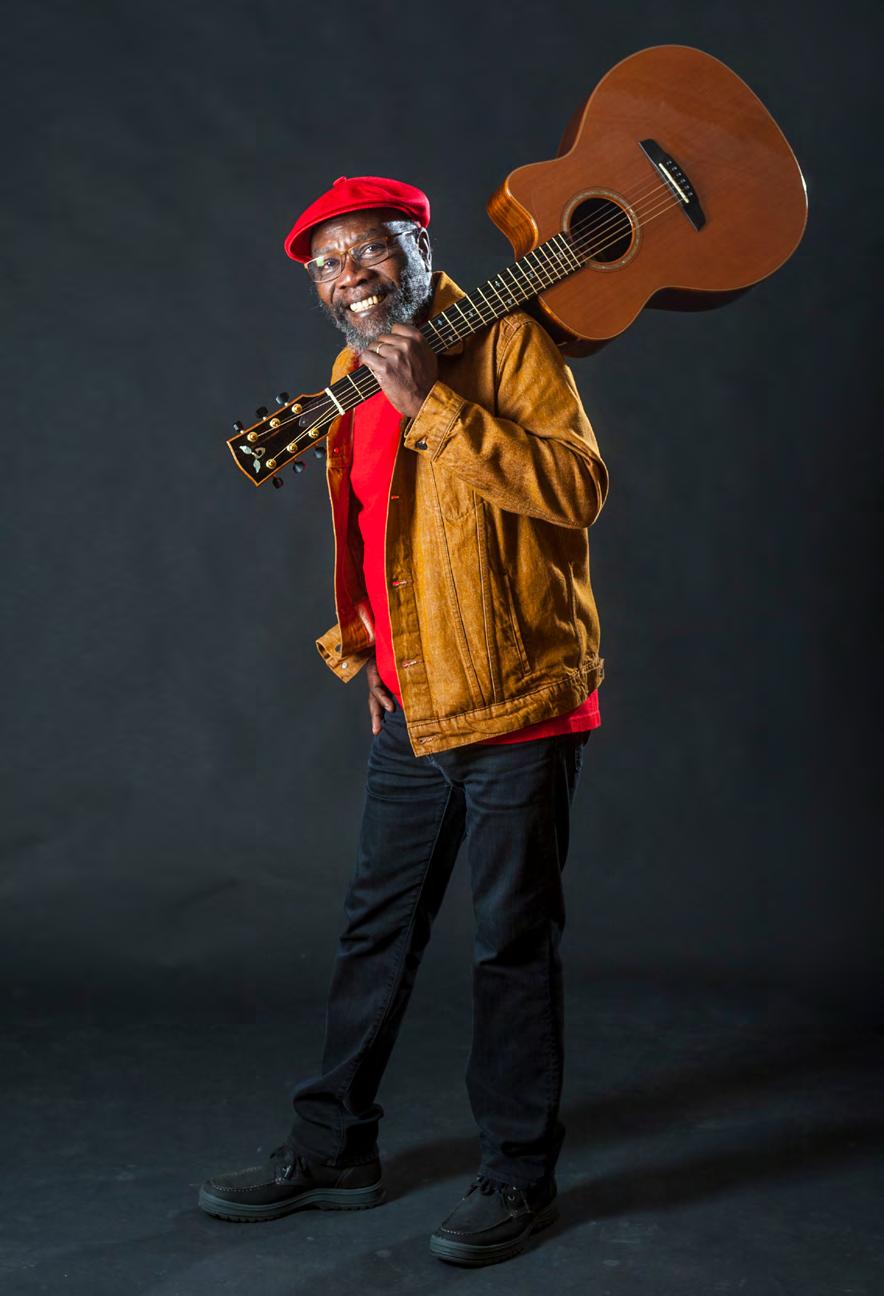
50 INTERVIEW CLINTON FEARON
(laughs) Hey you know what? I didn’t even think of that but you’re right there for sure. He used to do that. I remember one time he and we were in the studio laying some stuff and everybody was having a good time. And he came over to me and said “Hey Bassie try this” (sings bassline and acts out dance). And then he laughed “It’s ok, this is 28th century stuff, they don’t ready for this yet!” (laughs)
In a previous interview, you told me Scratch taught you about “question and answer” and in the Making Of video, I can see you and Manjul doing “question and answer” percussion…
Oh yes! (laughs) The time I spent over with Scratch I learnt some good things. Even things like you question yourself, wonder if you’re right or not? And you’ll see how he approaches things with a certain freedom and you say “Oh I’m on the right track”. He sensed that in me too. That’s one of the reasons why I spent so much time with him. Because when everybody had gone, he and I would stay back and play percussion and listen to certain rhythms. At one time we were kind of close. Musically.
Trod On was also a great choice for a single. When you hear it you think “This is a classic reggae song that I’ve already heard” but you haven’t.
Yeah! Again, for me it’s like therapy. Based on what was going on with the whole thing where you feel like you could just give up. But like we said earlier, once we’re alive we’ve got to keep on trodding. Because you never know when it’s going to be your day. Your turn. Where happiness really steps up. Just doing the song I really pushed a certain happiness and a certain achievement and joy. When you do what you love and love what you do, you tend to do a good job. And when you do a good job it makes you feel good. There are pluses and they keep adding up. Sometimes you are having a hard time and it’s good to look at your achievements and all the good things, rather than this one bad thing that is happening right now. And it helps you get through for tomorrow. So Trod On is a the-
rapy song that helps me to keep on pushing. Whoever will, may come, if you want help pushing on, listen to Trod On. (laughs)
I Am Thankful reminds me of our last interview on your 70th birthday. Giving thanks for life and being fortunate to be blessed with age. But it also reminds me of the line from Mi Deh Yah “Life is rough but I know I’m not the worst”. You’ve got to look at where you are in life and see the good about where you are… That’s definitely it right there. It’s like a summary of everything coming up until right now. Give thanks for everything, exactly because someone is always still worse off than you. No matter how bad it is, once you’re alive there is someone that is still worse off than you. At least you can breathe. There is someone who can’t even breathe at all. Something has to breathe for them. So there are always reasons to give thanks. Sometimes we just have to accept where we are. It’s best to accept where we are and live in the moment and move on accordingly.
One of the biggest and best reggae festivals in Germany is Reggae Jam. You are going to be playing at the new version of Reggae Jam happening in London this August. I’m feeling good about that. The first gig outside of Jamaica [with Gladiators] was in England. I remember that night. I was so green, getting on stage and young and brisk and everything and running around and having the most fun. I think three people fainted because it was so hot inside there and too packed! But by the time we reached half of the show, I was done! I was like “Oh man, I used up all my energy”. (laughs) So that was a good learning point for me and we had the greatest fun. I think Aswad was with us. They were our opening act at the time. It was a good little tour. I always remember England for that.
The other day I was listening to Yabby You. And I was thinking “these songs are all so great”. Which Yabby You songs are you on? The one that says “the Lord shall roam and shake the land”. I do the harmonies.
INTERVIEW CLINTON FEARON 51
Jah Vengeance.
Jah Vengeance. I did bass on that. Man, it’s several and I can’t even remember them. And I did vocals on some of them too. But I know Jah Vengeance for sure. And that’s how I got the gig with Scratch because he saw us do that one and asked Gladiators to come back and do something for him. He and Albert didn’t get along too well but he asked me to come back. So I came back to play bass for him for about six months. But I used to practise with Yabby You. With my guitar, help keep him on key. (laughs) Yabby You got some good bass lines out of me, man.

Have you had any more contact with members of the Gladiators since Albert passed away?
Clinton Rufus. And I spoke with Audley Taylor about a year ago, maybe a little longer. He’s not doing too well, he is sickly. But he’s still around. And Gallimore is gone too but we used to communicate too. And Barnabas communicates too.
When I first listened to the album I thought, a bit like History Say, “This sounds different to the Boogie Brown sound”. But when I listened a second time I was comfortable with it. You can hear all the musicians so clearly. They’re really helping the songs. I already think this is going to be one of your great albums that I’ll still be listening to 10 years from now, thinking “I need this today”. Well thank you, Angus. That’s how I feel to be honest. Because every time we listen to it, it’s like you hear another little something that you didn’t hear before - in a good way. And even the same things sound sweet to you the same way. Usually when I do an album, afterwards I will listen to it intensively for a week and then taper off. I don’t bother to listen anymore. I gravitate to write a new song. This one remains fresh. Everytime I listen to it it’s like “Yeah. This is good”.
52 INTERVIEW CLINTON FEARON
CLINTON FEARON - BREAKING NEWS
Since he left the Gladiators in 1987 and became a solo singer-songwriter and producer, Clinton Fearon has never delivered a bad album. It’s this consistency of output that has made him such a solid source of spiritual and emotional support to his fans.
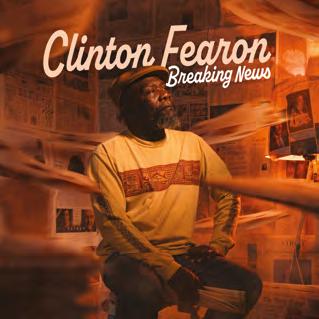
His albums can be roughly divided into those where he has been looking for something soundwise; and those where he has found something so comfortable that the work resonates even above his usual standards. Up until now, these standouts have always been made in Seattle with engineer Mell Dettmer and the Boogie Brown band. 13th effort Breaking News, a co-production with France’s Baco label, swerves the trend by using the highly seasoned French Riddim Source band, yet is among his most artistically accomplished works.
Part of this may be the circumstances of its genesis. The album was written during the Covid lockdowns as a counteraction to the media flow of bad news. The songs capture a deep sense of personal evolution and a need to testify about the state of the world. Title track Breaking News contains the line “First with Justice, then with Forgiveness”, the most succinct summing up of Clinton’s philosophy to date.
The sound, engineered by Damien ‘Bobby’ Coutrot, allows us extraordinary accuracy on what the musicians are doing. Every Tom fill by drummer Simon ‘Saymon’ Coutant is rendered with pinpoint clarity. Every piano stab by keyboardist Muctaru Wurie has extra punch. Every lick by guitarist Xavier ‘Kubix’ Bègue rings out pristine.
Baco Music - June 3, 2022
Previous Clinton albums can also be divided into ones where he decided to play bass, as he did in Gladiators, and those where he was happy to concentrate on singing. For Breaking News he planned to play on about five of the fourteen tracks but was so impressed by Thomas ‘Mato’ Cirade’s understanding of his demos that he let him take all bar two songs.
The new musicians and sound are the perfect conduit for some of the best songs Clinton has ever written. Singles Social Unrest and Trod On ache with a yearning for an end to global inequality and encourage us not to lose hope. Don’t Dump It, featuring tasteful hand percussion by veteran multi-instrumentalist Julien ‘Manjul’ Souletie, is a straightforward plea to recycle and look after natural water resources. Brace Yourself, penned as inspiration to Clinton’s daughter Sherine in her music, is far more open to interpretation, centring on the line “Brace yourself another poet is born”. I Wanna Dance, about the struggles of explaining his ideas to musicians and the joy of movement, calls to mind Clinton’s old mentor at the Black Ark, Lee Scratch Perry and his method of communicating rhythms by dance steps. Penultimate track I Am Thankful is a joyous celebration of life by a man who has reached age 71, having repeatedly changed his approach to music by necessity, and is still doing what inspires him.
It’s difficult for a reviewer to predict the future for an album having only heard it a finite number of times. But Breaking News feels like one of those Clinton Fearon records such as Give And Take, Vision and Mi Deh Yah that will be played again and again in its entirety, for years to come.
by Angus Taylor
ALBUM REVIEW CLINTON FEARON 53
MEMORIA

INTERVIEW
ONE VIBE
WHAT GOES AROUND
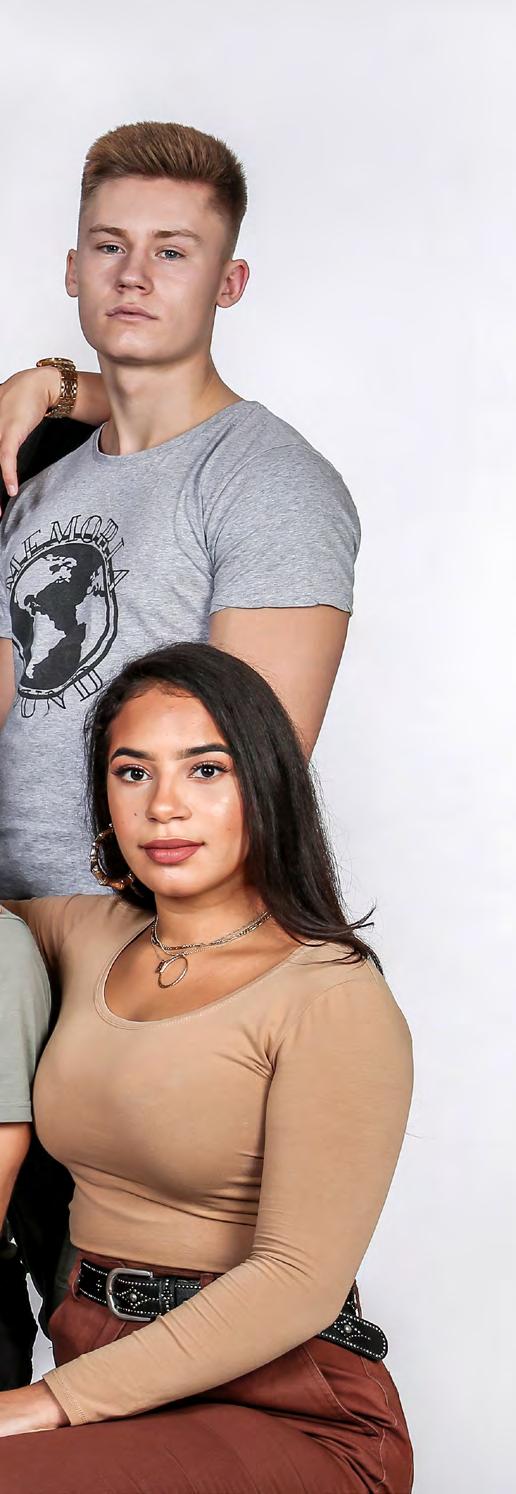 BY GARDY STEIN PHOTOS BY AUGUSTO STAHLKE
BY GARDY STEIN PHOTOS BY AUGUSTO STAHLKE
On the brink of the festival season (the first proper one in three years!), artists are busy and things can become hectic, especially if you not only practise for upcoming shows, but also prepare a release. That’s the current situation for Memoria, the young band out of Cologne that we introduced to you back in 2015. The eight members (Inti, Chaski, Eva, Alma, Greta, Rafael, Emil and René) have all come of age now, and they have used the months of lockdown to develop their craft and vision. One result of this introspection is What Goes Around, a wonderfully balanced EP that was produced in close collaboration with Oneness Records and features artists Jahcoustix, Mila and Cali P. Despite the many things on their list, brothers Inti and Chaski took the time to explain to an ever-curious Reggaeville how aforementioned contacts were established and what the deeper meaning is behind the six songs on the EP.
Inti: Nothing changed! We are the same since 2015.
Chaski: We survived the pandemic! (both laugh)
That’s great to hear! Let’s talk about some individual projects first. Inti, you did a solo single, can you tell us how that came about?
Inti: For us, the whole situation with the lockdown was just like a point in life where everything crashed. We thought “How are we
First things first: are the Memoria band members still the same as during our last interview?
INTERVIEW MEMORIA 55

56 INTERVIEW MEMORIA
going to manage eight lives to come together and pull on the same strings and keep looking in the same direction?” The topics we were discussing in the band were like, how are we going to survive financially, creatively, on personal levels… My creative output was so high that I was feeling the need to work on my solo debut. The whole project just came together when BuffBaff aka Evolution Band was doing these live streams every Wednesday. I think it was even the first session, I was going home after a studio session, I saw them recording this riddim and did a little freestyle in my IG story. Then Stahl wrote to me “Yo, forward the voice!” and I was like “Alright”, so the next day I went to the studio and recorded a little demo, and they asked me to sort out some things and then Dem Do Wrong was born! At the same time, I was starting to work on my debut album, this will come out some time soon, I don’t know when yet.
Do you still study?
Inti: No, I fully work with music now, in 2019 I decided to live by music only. Before that, I was doing tourism entertainment, Latino parties, earning my money with that, but I fully live from music right now. Of course, in the pandemic I needed to switch up some things, so I worked with my brother on an asparagus farm, I worked on an apple farm, I worked as a cook in a restaurant, I cleaned places, I just did all kind of works. I love to switch it around, so I get more perspectives on how people live, that gives me new inspiration for new songs.
What about you, Chaski?
Chaski: I started to work on a solo album too, because… the thing is, there was a time in the pandemic where we, the whole band, could not be in the studio, the regulations were like, you can only be somewhere with two households. So, everybody just used their creative output differently because Memoria is a collective thing, we record together. I just started to produce in my home, I started to write lyrics to my beats and now I have to record and continue producing. My solo album
is still in the process, but I hope it will come out soon, too. I also worked on some German rap stuff with my friends, so I’m just… doing music! (laughs)
I read that you also do graphic design?
Chaski: Yes, a little bit, sometimes.
Inti: Don’t be so humble, bredda. He’s wicked!
Chaski: For my album I do the whole artwork myself, and when we couldn’t do some photoshoots, I just painted some pics that I thought would fit with the song, and we took some of them. That’s something I started doing during the pandemic, because I always liked to paint, and this digital artwork was something that I really liked to start doing.
Inti: He and Emil, our drummer, they work together.
Are there projects from other members as well?
Chaski: The girls have their own solo project too, it’s called Mana and it’s crazy, it’s beautiful music, a very nice vibe, R’n’B, soul and neosoul… check it out!
Inti: The last two years we met every Monday, to be honest because even during hard times of lockdown we did meet once a week, but the level or intensity of how we wanted to work was a lot more. We needed to kind of find a way so that everybody is happy and still could live their lives, because the band was doing really, really great before Corona, and in this whole time we built our own studio. Chaski and I went to harvest asparagus and bought our first Neumann mic out of the money we earned there, and the band itself invested into building the whole room, improving the acoustic, via iMac, interface cables and all kind of things. We really levelled it up and created a
You already said that it was difficult to organise eight people to come together with all the restrictions, how is it now? Is it easier to meet and practice in studio again?
INTERVIEW MEMORIA 57
foundation we can work from, so we can work in a free space now. To rent a studio is expensive, but we are eight people, we can rent a room together, so we have a rehearsal room and a studio room now, and it worked for us!
Is that where you started recording the EP as well?
Chaski: Yes. Our EP What Goes Around with Oneness Records was the product of the situation that we could not record everybody together, but we wanted to do music. In 2018, when Jahcoustix did his album Reunion, we are featured on one of his songs, Who Told You. It’s produced by Oneness Records too, so we already had the link to Umberto Echo and we love the sound and the instrumentals and…
Inti: And they loved how quick we work, too!
Chaski: Yes, so for us it was like, “Ok, we want to release music, we want to do music, but right now we cannot record, so what do we do?” and then we said let’s ask Oneness Records if they have riddims for us, because we really like their productions, they use a different sound…
Inti: And we had a couple of riddims before the pandemic too, so it was kind of two waves on how we worked together. After the Reunion album, Filu sent me a couple of riddims, but we took very long because they were just laying around. Then, we flew to Barbados in 2019, Andrew Murphy took us to play a couple of shows with his band after 40 years of not being there, and we played after them with a singer called Mila. We had a very nice house directly at the beach. Chaski never saw it because he was stuck inside producing the whole time (laughs), but the things that come out of this trip were beautiful. Back home, in the beginning of 2020, we sent those songs to Oneness, and then Filu said, “Yes that sounds fine, but most of the riddims are released already, they are old riddims and we kind of overheard them, so give us some time and we will send you exclusive new riddims.”
Chaski: Then they sent the new riddims and Inti and I said, “Ok, we have now eight riddims and we have two weeks, we’ll just write songs, record them, and the best songs wins!” So, in two weeks we recorded eleven songs and sent them back and they picked six out of that. That’s the EP! It was a great time because we were talking a lot about life and work and everything, about our history, our culture too… it was a time when we talked a lot about our mindset, so I think in this EP, every song has a deep meaning and a good message, that really comes together,
Inti: It reflects the conversations we had, because there was one special thing about Corona I was really grateful for, so to say, that my father was here in Germany with us for two years in a row. This never happened before! My father is a singer and most of the time, at least half of the year, he was touring. So, finally we had some time to sit together, to talk… we both know Peru, we know our culture, but it’s different to be in Germany talking about Peru than being in the country itself, because here you have more distance, so you can reflect on certain things. I really feel that this played a main role in the topics we are touching on this EP.
Like what?
Inti: Like the song We Work 9to5, it describes a bit like how I was working the whole time and I was never used to work like that, I never used to go to a restaurant from 9 to 5, or waking up 5 in the morning going to the field and work there eight hours and drive back, I never knew how that felt, to be working for a different person. I think like these experiences reflect the EP very well.
It does! Especially this song, it shows a lot of appreciation for all the hard-working people. You also sing about that crime comes with lack of opportunity in this song - is this a reflection of your experiences here or in other countries?
Inti: Both! I think there are levels to it. Of course you cannot compare a child growing
58 INTERVIEW MEMORIA

up in Lima, where the parents will not be there with him, who might be living in the street. In Peru, education costs money, you have to pay monthly for school and depending on your budget, that’s how good your education will be in the end. So, a street child will have no access to education at all, so of course this child will find him- or herself in a situation to ask, “Which way is the way out? How to get some money?” This situation is different from here, but even the German school system I feel is terrible, because we decide if a child at 10 years will go to Gymnasium, Realschule or Hauptschule [i.e. lower secondary school]. This will not close all doors, but it will make it harder for a child who went to Hauptschule to succeed in life. And if the school is bad, they finds themselves in a circle where they can never come out, and I feel like children who grow up in these circumstances where parents maybe don’t have the possibility to support the child the right way, they may come nearer to crime.
I come from a household where everything is good, my mother is a teacher, my father is a musician, so just mentally there is a lot of reflection going on. But the area where we grew up in, there are a lot of poor people around, so we are also in touch with people who decide to go the crime way… I could have gone this way, but my household gives me the strength and the intellect to not go because I know it’s just the harder way. But the people who don’t have that, I feel like they will go for quick and easy money.

In your opinion, what is more important, the household, as you say, the strength that’s given at home, or the school system?
Inti: The school system.
Chaski: It’s both! I mean, love and support from home, from the parents, it’s the most important thing in the life of a young child, but the institutions also have the obligation to educate the society. I’m an educator, I work in
60 INTERVIEW MEMORIA
a kindergarten, so it’s very important to teach values and to appreciate every single human being, every personality, every individual you work with. As an educator, as a teacher, as a professor, all of them things. The problem is that right now when you go to a Hauptschule, which is the lowest ranked school, they don’t really teach you that you have value, they teach you to fill out forms to get money from the state. After Hauptschule, you get the feeling you can’t even do a real exam. You can do an apprenticeship, yes, but you earn so little money that you can’t afford to live in your own apartment. I think the state and the institutions should really empower and support every individual that goes there. Especially if they don’t have this support at home, they should find it in school! What is lacking at home, they should provide in the institutions.
This is a solution that you sing about in We Are One as well, you say that everybody has a contribution, everybody has a value…

Inti: I feel that this is the important thing, because enough times we are stuck in a way of thinking. It’s important to teach the children how to generate money! Of course, the child with the best grades and academic parents, we don’t have to worry about them because they will find a way to survive, but the children who come from unfortunate households, you need to teach them how to generate money legally! Give them a plan and show them academic goals or tell what they can earn with which apprenticeship. I feel like they close a lot of doors instead of leaving them open. I know persons who got kicked out of school, and if you give them 50 grams of weed, they can sell it out so fast and will gain the maximum profit out of it. If you give them a job in a BWL position, they will run the place differently!
What made you call your EP What Goes Around? This song is a lot about Karma, good and bad, so why did you choose this as title of the EP?
INTERVIEW MEMORIA 61
Chaski: I think because of all the topics that we are touching, everything comes around, everything goes around. We talk about history and how the narrative is a European narrative and we need to re-think history and re-tell it. We Work 9to5 is about that everybody is working so hard and we should change something in the system. I feel like everything is working right now and opening up and starting to be a conversation again, and I think that this is a cycle we are in. In Germany, we have working rights movements, and now you have Uber and Lieferando and all these companies that don’t focus on the working rights, and everything is always building up, it’s a circle that is moving. Everything is going to be in the conversation again, so I think that explains the title a little bit.
Inti: Everything is connected, you know, good and bad! Good things are happening again and bad things are happening again, so I feel like the fight of so many greats in
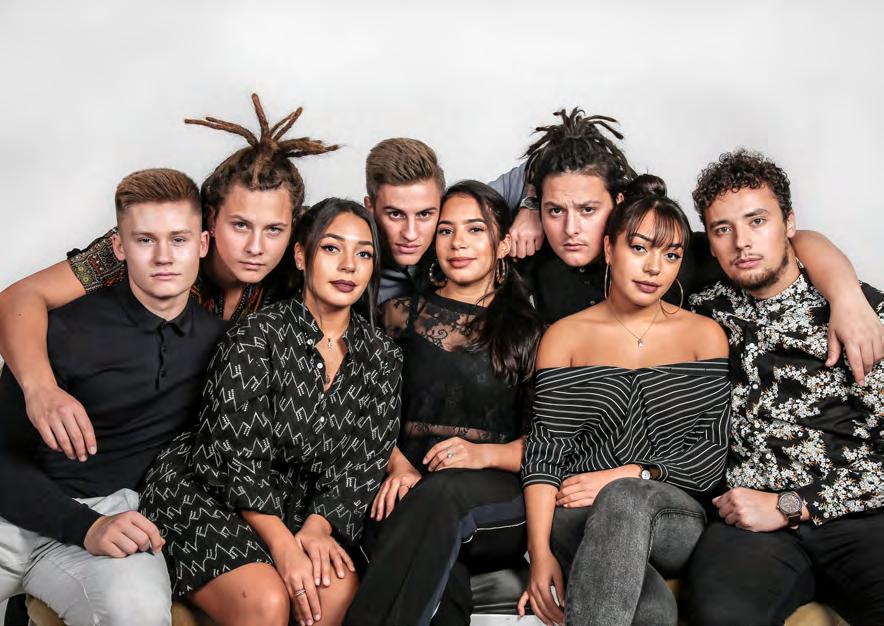
the past led to things getting better, but a lot is getting worse too, and it’s like in the end it’s a balance and maybe it has to do with how people move in certain movements.
You mentioned the song History which is a feature with Cali P. How did you connect?
Inti: To be honest, Chaski wrote this song and this song is one of my favourite songs, it’s incredibly well-written and brings the thing so nice to the point, it’s just obvious… like, “Them say Columbus is a man of honour who explored and discovered, but him exploit and massacred!” It’s so… it’s just written fantastically in my opinion, and Chaski was saying, “Inti, write a verse!” And I was like “No, let’s leave that open for a feature!” And then the Oneness guys wanted to do a feature with somebody else, but I was thinking again, who can it be? And then I saw Cali P live in an interview when he was talking about growing up in Zurich, and how his father was a musician from Guadeloupe, and him growing up in these
62 INTERVIEW MEMORIA

two cultures, and I was like “Yo, this is my story!” (laughs) I felt directly “Ok, this is a song we should collaborate with him!” I feel like he has a similar history, of course totally different, but… yeah, I thought it would be interesting for us to listen to what he has to say. We know him longtime, we are huge fans, and every time we linked it was just a blessing. He’s such a down to earth person you can really reason with, just an incredible human being.
Inti: If we need to back and forth, then we owe him a lot (laughs). This man, he comes like an angel, he always link us up for some shows or whatever, I’m just a big fan from World Citizen onwards, that’s an incredible song. I think he’s an incredible artist, much underrated, he has crazy musical ideas when it comes to harmonies and lyrics. I feel like he is very unique and very old school, and I love that. He needed to be on that album! When you link Oneness you need to have a Jahcoustix tune.
Chaski: And he killed it! He’s the first person in our whole career to adjust to the choir of the girls so that we like it. For real, the man know him thing! I love his part on that song. He is the first person who asked us for a feature on his album, ever, so it was just natural to have him on the project.
Chaski: The pre-chorus is sung by Alma, and the chorus is sung by Mila, another feature. The same singer we did Turn Up The Heat with on the Hide & Seek EP. She’s just an incredible singer and person, her voice is so beautiful… she was with us in Barbados, and we were drinking and playing cards on the balcony and listening to the riddim, and we were like “Hey let’s make a song!”, so we
picked up the mic and then she came with the chorus (sings) and we jumped up, and said “Record, record!” So, we recorded the whole song that night, but of course we had to record it again because the quality was not right and we had crickets and birds in the background (laughs), but this song was just…
Inti: One vibe!

Another feature is Jahcoustix on Chat Too Much. You just said that you featured on his album, so was that a kind of re-invitation that he now features on yours?
You mentioned the girls, and on Love Me Like You Do, we hear a female singer. Who is that?
64 INTERVIEW MEMORIA
After this long break I’m sure you are looking forward to doing live shows again. Which one are you most excited about?
Inti: Every show this year will be a big show, that’s the problem. We will play SummerJam, Rototom, and maybe even Reggae Jam… it will be the big stages, you know! We are rehearsing since January, every week we have rehearsals, and on top of that we have
two long weekends where we are rehearsing the whole day, 2 or 3 days in a row. In 2 weeks, we have our technical rehearsal, because we have our own engineer with us now, Marco, an incredible sound engineer. He worked with a lot of greats already. So, it’s just constantly growing, I’m overwhelmed because I was never expecting that kind of love after so much time of silence.

Chaski: For me it’s always a pleasure to play in Cologne, and SummerJam is the best stage to play I think, but for me also it’s a dream come true to go and visit the Rototom Festival! I always wanted to go, but it was either too expensive or we had shows or whatever, and now to be there playing, it’s like a dream come true, it’s crazy. I’m so excited for that, because we speak Spanish and we have lyrics in Spanish, and we can finally play for an audience that understands our lyrics too.
That sounds amazing! Is there anything else you want to tell the massive?
Inti: Whenever you have the possibility to see us live, you need to do it, because I feel like we never played as good as we are playing now. We never had that time to reflect and go into ourselves, and doing that with eight persons, it’s like re-questioning relationships. We know each other from our childhood, and in the past two years, we were really asking ourselves “Do we want to be musicians or are we a hobby band?”
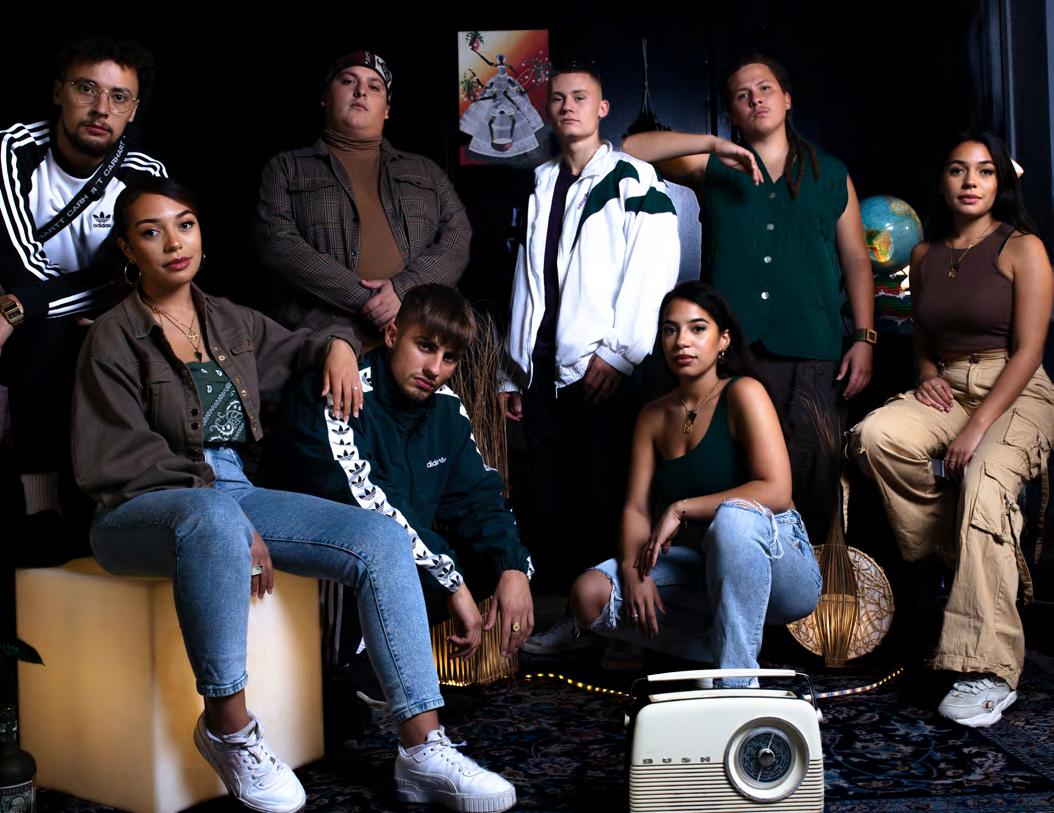
And it’s not a hobby band, so everybody should know that Memoria is not going to disappear, we have so much music coming, it’s crazy!
We are looking forward to everything coming from you to us! See you at SummerJam.
I think specially because of that, people are hungry!
66 INTERVIEW MEMORIA
MEMORIA - WHAT GOES AROUND

Sometimes, it’s the small things in life that make you glad. The new EP of Memoria entitled What Goes Around is one such happy-maker, a total of six tracks that caused me to smile as soon as I pressed play. Although, in the context of Memoria, speaking of “small” doesn’t really fit, given the sheer size of the group: Inti, Chaski, Alma, Greta, Eva, Emil, René and Rafael make up this multicultural band, playing music together since 2013, when they were just a bunch of talented kids.
Well, the kids have grown into serious artists by now, and with this new release, they continue the focus on Roots Reggae so dominant on their last EP Three Corners. This time, they secured the qualified support of Oneness Records, a Munich-based collective internationally known for their top-class productions. For Memoria, they created new, exclusive riddims that confer a consistent sound to the EP.
Starting with We Are One, the tone is set to optimism and appreciation. In a sweet blend of Inti’s and Chaski’s voices and the harmonious backings of sisters Alma, Greta and Eva, they stress the importance of each person’s contribution to the world we live in. A lot of teaching in this one, and the songwriting is really on top! “Could a be a graffiti pon street or a painting inna die Louvre, coulda be a teacher, coulda be a student …”
Generally, the lyrics make a more mature impression, a result of 2 years of introspection and reasonings during lockdown. The press release informs us that What Goes Around “stands for karma and is a call to society to be tolerant, respectful and loving towards each other”. Delivered on a less playful, more straightforward riddim, the teachings are continued, and whether you
Oneness Records - June
24, 2022
believe in Karma or not, it’s a good idea to heed the advice brought forth.
History is probably the most serious tune of the release. It raises the important subject of the need to establish an honest version of the world’s history, taking into account all contributions and achievements by ancient cultures which have been criminally neglected in the Western world. With Cali P, Memoria has found the ideal advocate for this cause, and together they bring a few striking examples to our attention.
We Work 9to5 is the outcome of personal experiences by brothers Inti and Chaski. As all music-related income broke off during lockdown, they had to take on any job to make a living, from washing dishes to cleaning to harvesting asparagus on a farm. The experiences gathered during this time shine through in the laid-back song, which also addresses working rights and the appreciation for hard-working people.
“Do yourself a favor and leave people business alone!” is the motto of Chat Too Much. Featured artists Jahcoustix is a perfect fit both vocally and in the authentic way he delivers the lyrics. The bubbling riddim is Oneness at their best, but it is the girls’ harmonies that bring it to perfection. Beauty! Last, we have a love song called Love Me Like You Do. The initial idea was drafted in Barbados with singer Mila, who has worked with the band before.
What Goes Around comes just in time to prepare yourself for the festival season, a small but impactful offering by Oneness Records and Memoria. If their live shows hold what this EP promises, we’re all in for a treat‼!
by Gardy Stein
ALBUM REVIEW MEMORIA 67
INTERVIEW LION D
FREED FROM MUSICAL CAPTIVITY

SPIRITUALITY TAKES CENTRE STAGE
BY STEVE TOPPLE | PHOTOS BY GAFO
It seems years since Lion D released a full album. But after a difficult period of ill-health and a mystical experience, he’s finally returned with a new album. Called All In This Together, he considers it his best work to date – featuring a host of guest artists, heavy vibes and lyrical power. The road to the release wasn’t easy but it was also a journey through spirituality and musical oneness for this seasoned artist. So, Reggaeville caught up with Lion D to discuss being “all in this together”, the challenges of ill-health and how his new album took on a whole new meaning even after the song writing had finished.
Greetings Lion D! Thanks so much for speaking with Reggaeville. On paper, All In This Together is your first album since 2015. But that isn’t strictly true, is it?

You’re right, yeah. So, a lot of people think that Heartical Soul was my last album. But in between that and this upcoming album there was this album called Mandala and that was a short time period in which Lion D was David Lion. Back then we wanted to experiment with the sound, so we decided, me and the team - the Bizzarri crew - to make some changes, resulting in the name as well. David Lion was Lion D! But now I’m back to the whole Lion D thing, because we know that a lot of people couldn’t recognise all the things.
But at the same time, I’m not regretting anything - that was just an experiment. We wanted to see if you can mingle reggae with some pop songs and world music sounds. But this new album, All In This Together, will be
definitely be Lion D back again! In between Mandala and this new album, I released a nice EP called Born in Captivity, it’s a five track EP. Through the years I’ve always been putting out music - since 2009 which is the year I released my first album, The Burning Melody. I never stopped putting out music, whether singles or albums or the EP. So, you know - it’s just that natural progression.
Was it a long process to produce the new album?
I wrote the lyrics by myself, then we linked during the pandemic with the other members of the band and we recorded the whole album in a couple of days. This is why with this album is different from the previous one, because All In This Together – it’s a double meaning. It’s All In This Together in general because it has to do with all of us; we are all in this together, as humanity, we’ve been through this Armageddon time during the past two years.
INTERVIEW LION D 69
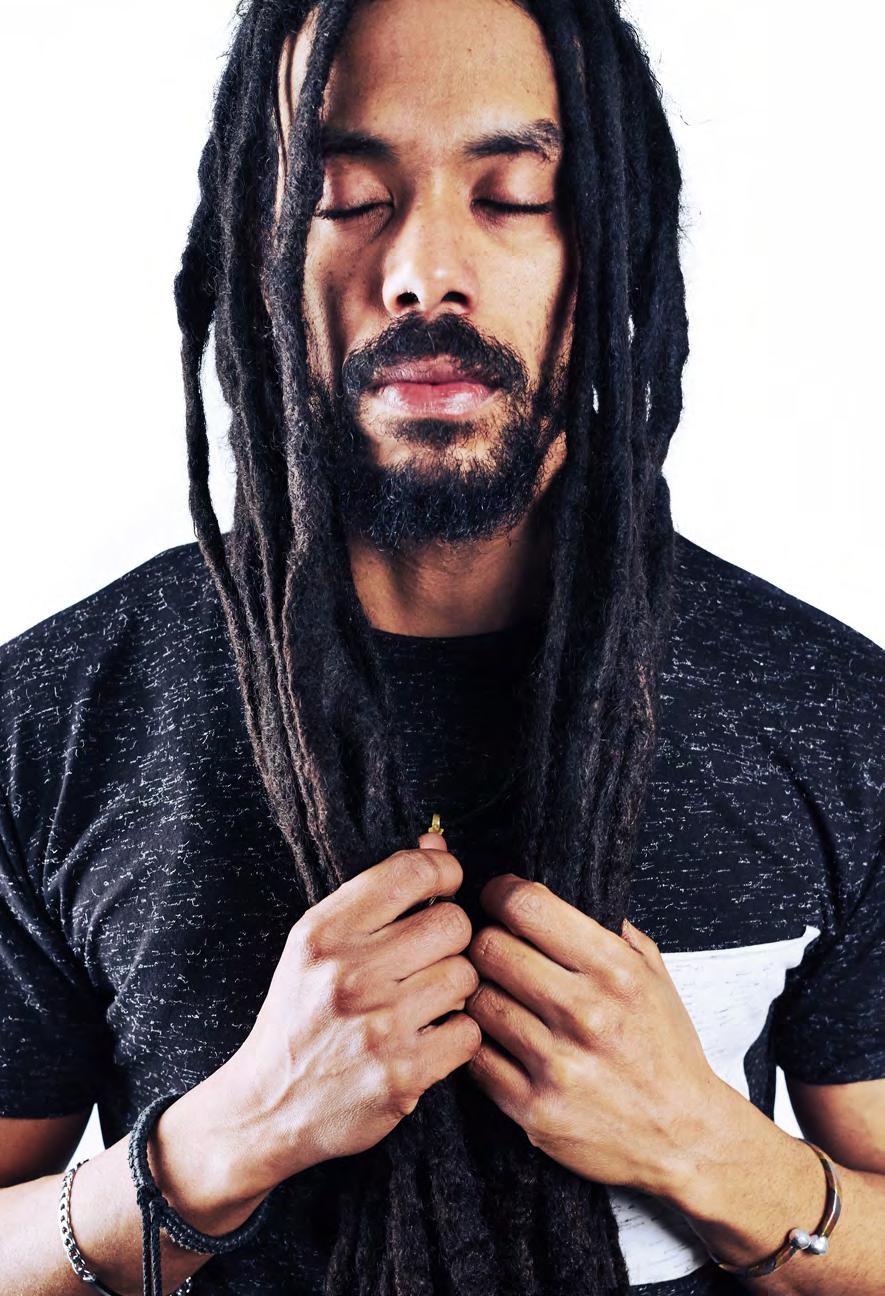
70 INTERVIEW LION D
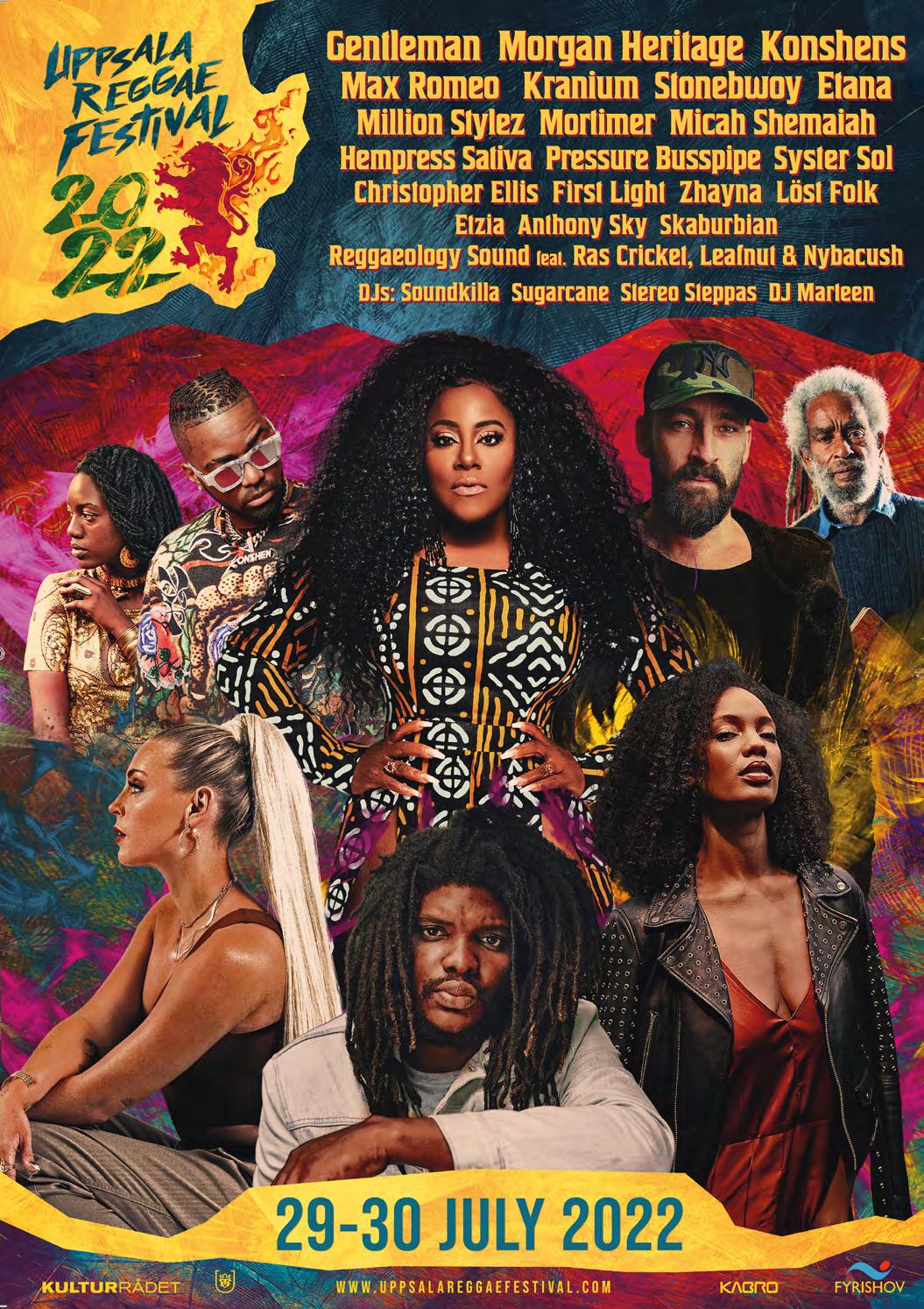
And the other meaning is All In This Together because for the first time in my career, this album has been created and built along with my musicians. It’s just I and I in the studio recording together like artists used to do back in the day - which is something different. It’s a different approach compared to the previous albums. There was no separation in the creative process. It was all about oneness, with the members of the band coming up with the ideas as well. This turned out to be a different approach and this different approach gave a wonderful outcome in terms of sound and vibe. It’s more like a like a topquality live recording - them type of album. The intention, the direction, that was it: oneness, live recording and I’m very happy with this album.
I’m looking forward to the release and the band played a very important role in this - because they’re musicians, they are breth-
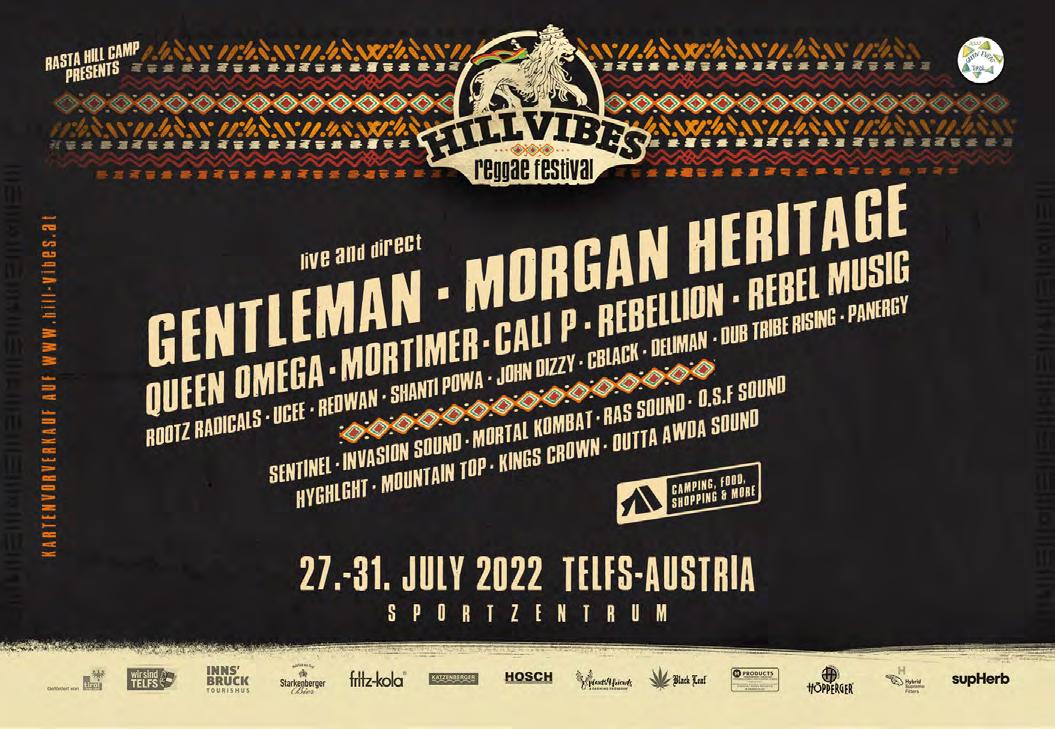
ren of mine, they are like family - and you know, they did a really outstanding job.
That’s interesting, because a lot of artists get in a load of different producers these days!
Exactly. But for me, it’s all about oneness. I mean that’s the meaning of the album and I’m very happy with it and this is the best album I ever did in my career. Regarding the other albums I would record, for example - today I would voice my sound and write my lyrics, and the next day record the bass. Even if the musicians are top quality musicians, it’s a different thing when you are not all in this together. So, now we’re not separated, we’re not playing, recording on different days and in different places.
Also, all the tracks are radio-ready. It’s unusual with an album to have 100% strong tracks with no filler. A lot of times albums are not like that.
72 INTERVIEW LION D
I can relate to that. I’m not listening to a lot of albums lately, but I know what you mean. Sometimes you get bored or sometimes you feel like yes, probably you were expecting something more. I always try to do my best, especially considering that English and Patois are not my first languages. Music is something that comes off naturally to me - but at the same time it is a lot of work, because I like to always be singing in Patois or English because I like to respect the culture, respect the original sound, the language and the original roots of reggae music. So, to me, to put out music it’s really every time a privilege. Every time, every album is a milestone on your journey - but this album in particular, is something different. So, I’m very happy to release it and I can’t wait to perform the songs on stage.
The album will lend itself really well to being performed live, you know!
Yeah. I would like to come back to UK, because it’s been a while since the last time, and I think that would be great. I think the last time
was probably 2005, where I’ve been in Bristol and Birmingham. I was born in London but my mother is Italian and my father Nigerian, and I left England at a very young age, moved to Italy, was raised there, went to school there. That’s why I told you English is not my first language - Italian is my first language, but sometimes the Italians they struggle with the English. So, it’s important to stay consistent, on a level.
There are clear influences of soul music throughout the album. Is this another musical passion and influencer of yours?
My biggest passion is reggae. I’ve always been listening to reggae and even a little dancehall. but I think soul music or soul elements, it’s something that within me, it’s something natural that comes out. When I think reggae, there’s always a blend, something that blended with soul music and it’s within me. So, when I sing it’s just my style, my style of singing - it’s not because I listen to soul music that much, it’s more because it’s something that’s within me.

INTERVIEW LION D 73
There are some great collaborations on the album, too – Jah Sun, Busy Signal and Capleton to name a few! How did the Busy one come about?
That was a real blessing, because we never really met physically. We’ve met once, back in the day, back in 2014/15. He came to Rome to perform and I was there, I did an opening for him and Alborosie, so I had a chance to meet him personally - but that was just for a picture! This time it was different. We never met physically but I have some links in Jamaica who know his manager and that led me to Busy Signal. It wasn’t easy at all to link with him, because he’s a top artist and plus everything is one of a kind about Busy - it’s Busy Signal; sometimes it’s not easy to get him. We are blessed.
I sent the song with my parts, the chorus and the verse and I left the empty space for Busy. I don’t know if it was one take, but I know that is a very talented artist, he’s one of my favourite artists and this this song, Fight And Win, is without a doubt the most outstanding collaboration I ever did.
I mean it’s a 100% full reggae album, except for this track which is a which has a kind of, I don’t want to say dancehall - it’s more like a pop song, if you listen to the instruments and the music without listening to the lyrics. But if you add Lion D and Busy it becomes something different!
The album is very conscious, and it deals with the social commentary and everything, but spirituality comes first in most of these songs. And even on the songs where it doesn’t seem spirituality is there… spirituality is there.
The whole album is very spiritual and this was because I have been through probably the toughest time in my life. I had some health issues a while ago; now I’m good, I’m recovering and this album, it all came… it’s kind of a mystical thing. Because I wrote most of the songs before my experience,
my health issues, my hospitalisation. The mystical thing about that? It was that when I wrote the songs, I couldn’t realise that this was coming. Now I can see it was like a premonition to what happens next. So, when I listen to the album and when I listen to the lyrics, I say yo - you see, this come like a premonition. Most of the songs, most of the things that I talk about in the songs, then happened to me next and have a particular meaning to me based on what happened to me. So, this album really means a lot to me because now I’m good but I’ve been through a really tough time. And all these things, all this sounds, meanings, there is a type of spirituality in it. It’s really kind of entanglement, everywhere - everything is linked down, connected. But it’s something that is more personal, so people would not notice it - most other people don’t know what I’ve been through.
Spirituality is always there. So, I always try to mention spirituality, God, the Most High on most of the songs of the album. Because this is something that really helped me during that stage. So, this album is, as I told you, All In This Together - as people, as humanity, as musicians working on the album and myself. And it’s All In This Together because spirituality is the bond that links every aspect and sound of the album. The title really fits.
Can we catch you at any festivals this year?
The biggest show is in August at Rototom Sunsplash. I’ve been there before, because back in the day Sunsplash was in Italy! I’ll be performing with my band, the Livity Band, on the Lion Stage on the 21st of August. It’s going to be a big party, big crowd and the vibe will be excellent. I mean the place is so full of people, everybody wants to party, everybody wants to stay until the morning - so it’s a really good vibe. Most of my shows for now are in Italy, but I have the next show in Germany. I’ll post every new date on my social media.
74 INTERVIEW LION D

If listeners could take one thing away from the album, what would you like that to be?
I think spirituality is the main thing. It’s not that type of new age spirituality, it’s a real core spirituality. You don’t have to be religious; you have to be spiritual to sense this. I think there’s a… I don’t want to say teaching in every song, but there’s a kind of direction, kind of personal advice from myself to the people: to elevate, to be more conscious. I mean, most of the time for me it is not easy to talk about my songs because I always say that music speaks for itself. As Jamaicans say, “Me nah talk too long, me make the music talk” - you know?
So, I think probably yeah, spirituality is the main thing that clearly transpires out
from every song. And spirituality is what we need, in my vision, to make this world a better place. Because now I think it’s not about money anymore, I mean money is important or you can live without money, but you need the direction. Spirituality and to be conscious, and to try to get closer to God in a sense - it’s that type of drive that we need. And I think people, especially people who listen to reggae music and listen to Lion D, get that.
Lion D – thank you so much for speaking with Reggaeville!
Big up yourself and the whole Reggaeville family. I need to give thanks for pushing my music, new releases, new singles, my upcoming album - give thanks for everything.

76 INTERVIEW LION D
LION D - ALL IN THIS TOGETHER

It’s been a long wait since Italian artist Lion D released his last full album –2015’s Heartical Soul. But he’s back and the result is another fine body of work.
All In This Together, released via Senza Dubbi, sees Lion D, producer Leo Bizzarri and the Livity Band create a project that is grounded in roots – but wonderfully so. The production, engineering and mastering are top quality and the compositions all attractive and well-constructed.
Boomerang is classic roots: a strong one drop, bubble rhythm and drop-beat bass but with some beautiful horns. Stay Woke, featuring Million Stylez and Danjah, is more classic roots – but here it’s interspersed with some pleasing use of synths and a smoother, more fluid feel.
Capleton features on Warning as the BPM picks up, the instruments get choppier and the vibes gets more brooding. But then, No Filter Needed switches All In This Together up with a merging of soul-pop chord progressions and instrumentation (check the sax), traditional African drum arrangements and reggae musical devices.
Born A Rebel changes tack once more, as things get more brooding, driving and forthright. Strength Of A Champion is quite brilliant: opening with military buzz rolls before dropping into roots territory. Then, Jah Sun superbly comes on board for General – an imposing, forthright affair. Vision is pleasing roots, again with lovely chord progressions, while Sheep’s Clothes brings a funky soul, stuttering opening in before directly shifting into dub-meets-roots –with its stripped-back then lavish arrangement.
Senza Dubbi - July 1, 2022
By The Cover features Bobby Hustle and sees more soul sensibilities give way to reggae and back again. Too Cold is the only relationshipfocused track of All In This It’s light-touch reggae (a distant skank and ambiguous one drop), honing in more on soul-pop again.
Jah Is My Keeper is roots, but with some inflections of dancehall across the beat at times and calypso in the drum arrangements. The album’s closer, Fight And Win featuring Busy Signal, is smoothed-out dancehall-RnB: lilting, attractive chord progressions, inflections of trap and a rhythmic clave stretched-out across the instruments. A pitch-perfect ending.
Lion D is vocally superb throughout. His midto-high tenor voice has a pleasing tone (not too rounded but not too shrill); he utilises dynamics, especially crescendo and decrescendo, well; he switches embouchure up throughout and has a well-developed singjay too – which is rhythmically intricate and melodically deft.
And lyrically, All In This Together is a powerhouse of conscious political and social messaging. It swerves between narratives around maintaining personal strength and faith (Stay Woke), to musings around positivity (Strength Of A Champion) and disseminations of the system (Warning). But there’s an overall spirituality at the album’s heart which shines through.
All In This Together is a stunning album from Lion D, Bizzarri and the Livity Band. Elegant, well-constructed and filled with brilliant guests, pertinent lyrics and infectious melodies, it’s the perfect roots album – and one of the strongest of 2022 so far.
by Steve Topple
ALBUM REVIEW LION D 77



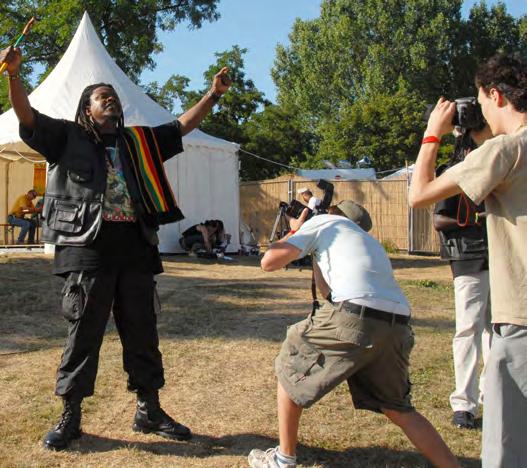

SUMMERJAM 2006 - 2013 PHOTOS BYJULIAN SCHMIDT
TAKE A SHOT
DOWNIE
SIZZLA TONY CHIN PROTOJE & CHRONIXX
TYRONE
& ERROL BROWN
LUCIANO
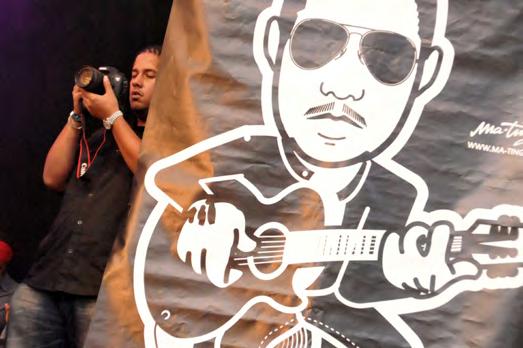
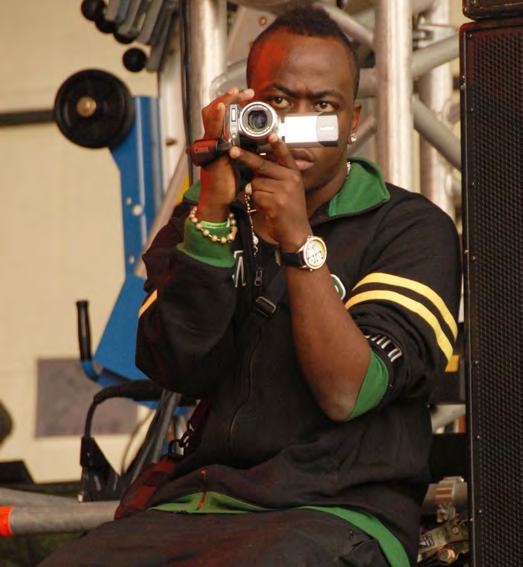

 DON CORLEON COPELAND FORBES TONY FISHER
DON CORLEON COPELAND FORBES TONY FISHER
JUNE
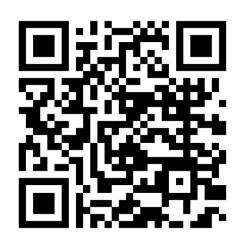


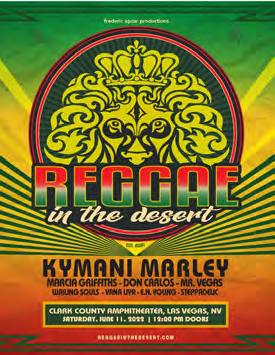
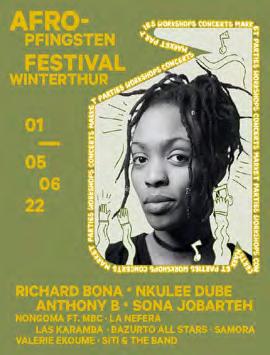

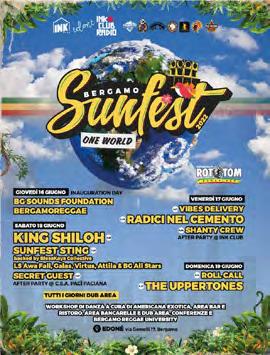



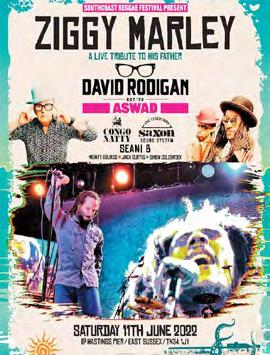
FESTIVAL AGENDA 2022
The following pages list 130 events. For lineups, changes and newly announced festivals, please check the daily updated festival calendar on REGGAEVILLE.com






PLEASE NOTE: Cultural Reggae Vibez June 9 - 11 Lom U sv. Josefa in Horice, Czech Republic South Coast Reggae Festival June 11 Hastings Pier in Hastings, UK
We take reasonable care in Reggae In The Desert June 11 Clark County Amphitheater in Las Vegas, NV, USA Legoreggae June 11 Harripila in Legorreta, Spain
tee that everything
compiBergamo Sunfest June 16 - 19 Festival Area in Bergamo, Italy Sunshine Reggae Festival June 17 - 19 Camping Staedly in Roeschwogg, France


ling this list, but we can‘t Ithaca Reggae Fest June 17 - 18 Stewart Park in Ithaca, NY, USA Harambee Music Festival June 17 - 18 Sunset River Resort in Oroville, CA, USA
guaranOne Love Cruise June 17 - 19 Cruise Ship in Stockholm, Sweden

is

FESTIVALS JUNE 2022 81
The posters are clickable and will take you straight to the event on our calendar. The QR code takes you to the complete overview. Afro Pfingsten June 1 - 5 Salzhaus in Winterthur, Switzerland
accurate! Please check the official websites before you go and make sure to get your tickets only from official sources.









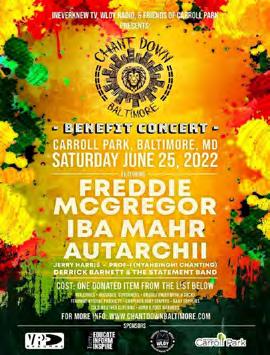

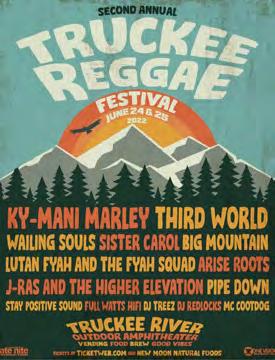












FESTIVALS JUNE 2022 83 Puerto Rico Reggae Fest June 18 Anfiteatro Tito Puente in San Juan, Puerto Rico St. Kitts Music Festival June 23 - 25 Kim Collins Athletic Stadiumin Basseterre, Saint Kitts & Nevis Truckee Reggae Fest June 24 - 25 Truckee Amphitheater in Truckee, CA, USA Dub CampRomania June 24 - 26 La Plaja Nouă in Timișoara, Romania Couleur Cafe June 24 - 26 Atomium in Brussels, Belgium Point Reggae Festival June 24 - 25 Thomas Point Beach in Brusnwick, MA, USA Afro Ruhr Festival June 24 - 26 Dietrich-Keuning-Haus in Dortmund, Germany Chant Down Baltimore June 25 Carroll Park in Baltimore, MD, USA Lagata Reggae Festival June 25 - 26 Campo de Belchite in Zaragoza, Spain Outlook Festival –UK June 30 - July 3 Cholmondeley Castle in Cheshire, UK Reno Splash June 17 - 19 Giardini Pontelungo in Bologna, Italia Victoria Ska & Reggae Festival June 17 - 18 Different Locations in Victoria, BC, Canada
JULY

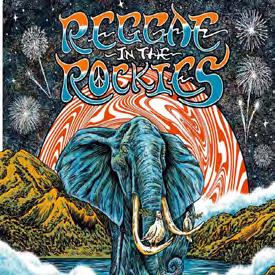


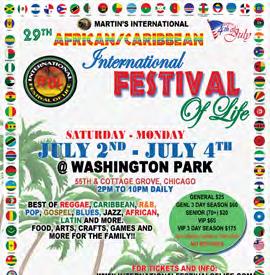
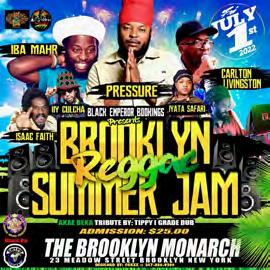




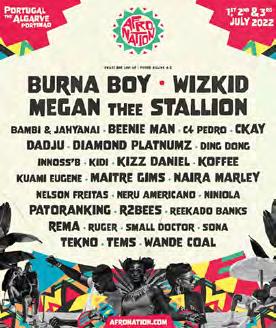


















FESTIVALS JULY 2022 85 Afro Nation July 1 - 3 Praia da Rocha in Portimão, Portugal SummerJam July 1 - 3 Fuehlingersee in Cologne, Germany ERVA Festival July 1 - 2 Festival Area in Anneyron, France Pyrene Festival July 1 - 2 Festival Area in Bordes, France Brooklyn Reggae Summer Jam July 1 Brooklyn Monarch in Brooklyn, NY ,USA East St.Louis Jerk Festival July 2 Frank Holton State Park in St. Louis, IL, USA Reggae in the Rockies July 2 - 3 Melving Brewing in Alpine, WY, USA New Rules Festival July 2 National Stadium in Kingston, Jamaica International Festival of Life July 2 - 4 Washington Park in Chicago, IL, USA Boston Jerk Festival July 2 Harvard Athletic Sports Complex in Allston, MA, USA Ostroda Reggae Festival July 7 - 10 Festival Area in Ostroda, Poland Sunrise Reggae & Ska Festival July 7 - 10 Festival Area in Burtenbach, Germany Skank Festival July 7 - 9 Barcena de Pie Concha in Cantabria, Spain Lakesplash July 8 - 9 Seematte Twann in Twann, Switzerland



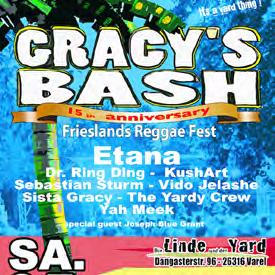
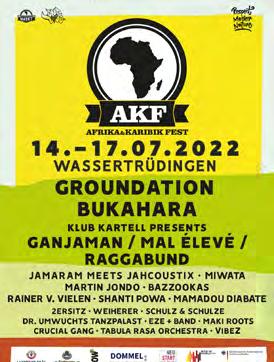
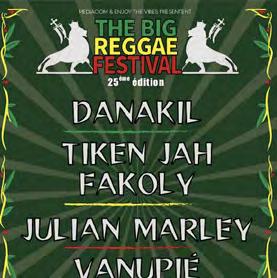




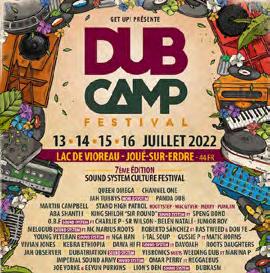


















FESTIVALS JULY 2022 87 Levitate Music & Arts Festival July 8 - 10 Fairgrounds in Marshfield, MA, USA Reggae on the Lawn July 8 - 9 The Lawn at the Surf Hotel & Chateau in Buena Vista, CO, USA Gracy‘s Bash July 9 Die Linde und der Yard in Varel, Germany Big Reggae Festival July 10 La Pinede in Juan Les Pins in Antibes, France Dub Camp Festival July 13 - 16 Lac de Vioreau in Joué-Sur-Erdre, France Afrika Karibik Fest July 14 - 17 Volksfestplatz in Wassertrüdingen, Germany Plein Les Watts Festival July 14 - 16 Parc Navazza in Lancy, Switzerland Öland Roots July 14 - 16 Festival Area in Sandbergen, Sweden Seasplash Festival July 14 - 17 Martinska in Šibenik, Croatia One Love Reggae Reunion July 14 - 16 Camping Girasole in Lignano, Italy Weedbeat Festival July 15 - 17 Kornspeicher in Rüssing, Germany Nowa Reggae July 15 - 16 Parc de Ribe Roges in Vilanova, Spain Rastaplas Festival July 15 - 16 Nord AA in Zoetermeer, Netherlands Highenka Festival July 15 - 17 Festival Area in Pohořelice, Czech Republic






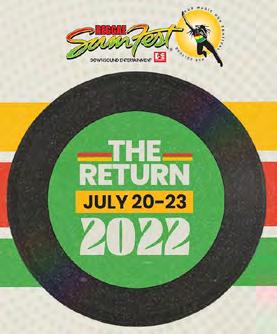




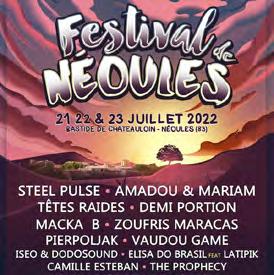
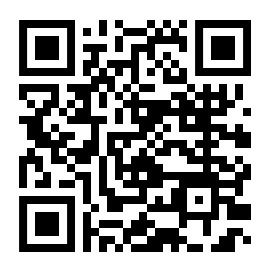












FESTIVALS JULY 2022 89 Bayfront Reggae & World Music Festival July 16 Bayfront Festival Park in Duluth, MN, USA Simmer Down Festival July 17 Handsworth Park in Birmingham, UK Reggae Sumfest July 18 - 23 Catherine Hall in Montego Bay, Jamaica Bababoom Festival July 20 - 24 Marina Palmense in Fermo, Italy Zion Garden July 20 - 23 Festival Area in Bagnols-sur-Cèze, France Festival de Neoules July 21 - 23 Festival Area in Neoules, France Summer Vibration Festival July 21 - 23 Les Tanzmatten in Sélestat, France Dub Fest Copenhagen July 21 - 23 Refshaleon in Copenhagen, Denmark Afrika Tage Wien July 22 - August 8 Donauinsel in Vienna, Austria Mammoth Reggae Festival July 22 - 24 Mammoth Lakes, CA, USA Reggae na Piaskach July 22 - 23 Piaski Szczygliczka in Ostrów, Poland Irie Vibes Roots Festival July 22 - 23 Festival Area in Kortemark, Belgium









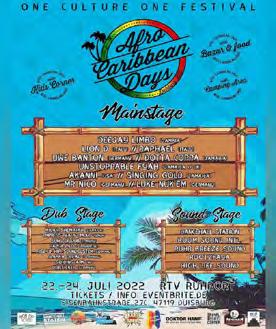
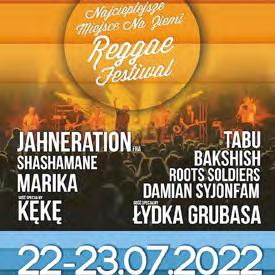



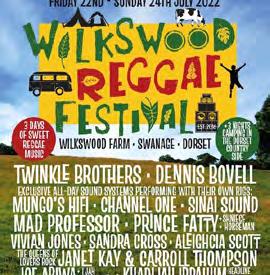















FESTIVALS JULY 2022 91 Afro Caribbean Days July 22 - 24 RTV Ruhrort in Duisburg, Germany Reeds Festival July 22 - 24 Lake Pfäffiker in Pfäffikon, Switzerland NMNZ Reggae Festival July 22 - 23 Stadion Miejski in Wodzisław Śląski, Poland Reggae Rotterdam July 22 - 24 Kralingsebos in Rotterdam, Netherlands Irie in the Woods July 23 Wachtberg in Thunau am Kamp, Austria Hands Across Africa July 23 Sports Stadium in Accra, Ghana Lake Tahoe Reggae Festival July 22 - 24 Hard Rock Hotel & Casino Outdoor Area in Lake Tahoe, NV, USA Wilkswood Reggae Festival July 24 Wilkswood Farm in Swanage, UK Paname Reggae Festival July 27 - 31 Cabaret Sauvage in Paris, France Hill Vibes Reggae Festival July 27 - 31 Sportzentrum in Telfs, Austria Outlook Origins July 28 - August 2 The Garden Resort in Tisno, Croatia Reggae Rise Up –Maryland July 29 - 31 Swann Park in Baltimore, MD, USA

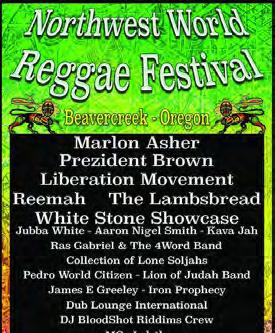

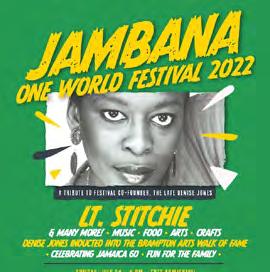




















FESTIVALS JULY 2022 93 Northwest World Reggae Festival July 29 - 30 Vilar Performing Arts Center in Beaver Creek, CO, USA Uppsala Reggae Festival July 29 - 30 Fyrishov in Uppsala, Sweden Gibraltar Reggae Festival July 29 Bayside Sport Complex in Gibraltar, Gibraltar Reggaeboa Festival July 29 - 31 El Bierzo in Balboa, Spain Reggae Jam July 29 - 31 Klosterpark in Bersenbrück, Germany Reggae in Wulf July 29 - 30 Festival Area in Wulfertshausen, Germany Roots & Culture Reggae Festival July 29 - 31 Parco Castello Del Ronchi in Crevalcore, Italy Reggaeland July 30 - 31 Campbell Park in Milton Keynes, UK Manchester Reggae Festival July 30 Academy Moss LnE in Manchester, UK Reggae & Riddim Festival July 30 - 31 Tredegar House in Newport, UK Westside Reggae Festival July 30 Ives Concert Park in Danbury, CT, USA Jambana One World Festival July 31 Downtown in Brampton, ON, Canada
AUGUST


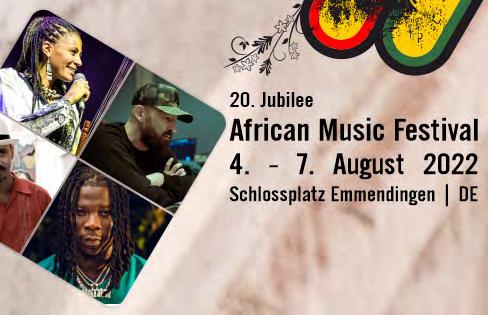

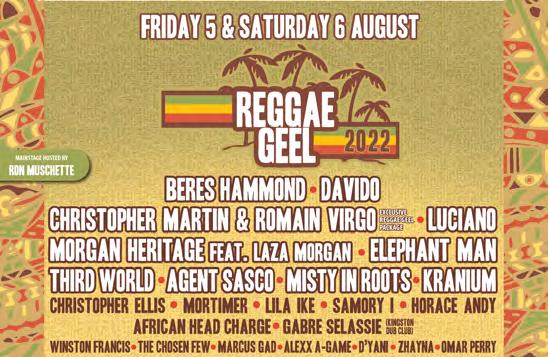









FESTIVALS AUGUST 2022 95 Reggae Sun Ska August 5 - 7 Domaine de Nodris in Vertheuil, France Reggae Geel August 5 - 6 Festival Area in Geel, Belgium One Love Reggae Festival – Austria August 5 - 6 Festivalgelände in Wiesen, Austria Nomade Reggae Festival August 5 - 7 Le Phare in Chambery, France Ruhr Reggae Summer August 5 - 7 Am Ruhrstadion in Mülheim an der Ruhr, Germany African Music Festival August 4 - 8 Schlossplatz in Emmendingen, Germany




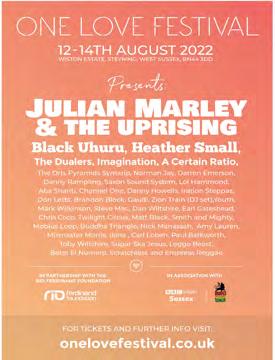
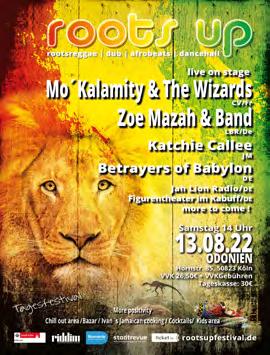

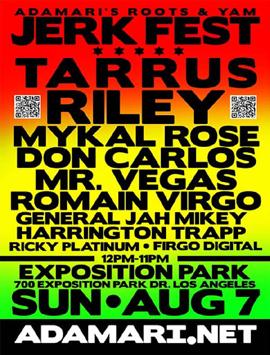
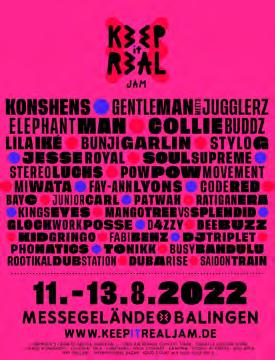















FESTIVALS AUGUST 2022 97 Houston Reggae Jam Jam August 6 India House in Houston, TX, USA Adamari Roots & Yam Jerk Fest August 7 Exposition Park in Los Angeles, CA, USA Boomtown August 10 - 14 Materly Estate near Winchester, UK No Logo BZH August 11 - 14 Le Fort De Saint-Pere in St. Pere, France Keep It Real Jam August 11 - 14 Messegelände in Balingen, Germany One Love Festival August 12 - 14 Wiston Estate in Steying, West Sussex, UK No Logo Festival August 12 - 14 Festival Area in Fraisans, France Reggae Sundance August 13 Karpendonkse Plas in Eindhoven, Netherlands Roots Up August 13 Odonien in Cologne, Germany Word.Sound. Power August 13 56 Brewing in Minneapolis, MN, USA Green Woods & Culture Revival August 5 - 7 Thomas Point Beach in Brunswick, MA, USA Reggae Jam –London August 6 - 7 Fryent Country Park in London, UK

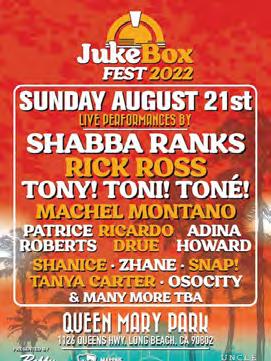









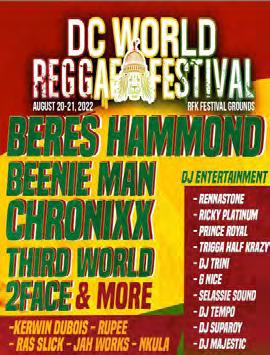












FESTIVALS AUGUST 2022 99 Reggae Lake August 20 - 21 Gaasperpark in Amsterdam, Netherlands Reggae On The Rocks August 20 - 21 Red Rocks Amphitheater in Morrison, CO, USA DC World Reggae Festival August 20 - 21 RFK Stadium in Washington, DC, USA Reggae On The Way August 20 - 21 Festival Area in Tacoma, WA, USA Rock Reggae And Relief August 20 Downtown in Pittsburgh, PA, USA Turnpike Reggae Festival August 20 Landgasthaus Lönne in Herzebrock-Clarholz, Germany Jukebox Fest August 21 Queen Mary Park in Long Beach, CA, USA Uprising Festival August 26 - 27 Zlaté Pieskyin Bratislava, Slovakia Bomboclat Festival August 26 - 27 Strand Zeebrugge in Zeebrugge, Belgium Redemption August 27 Queen‘s Park Savannah in Port of Spain, Trinidad Overjam Reggae Festival August 15 - 20 Sotocje in Tolmin, Slovenia Rototom Sunsplash August 16 - 22 Festival Area in Benicassim, Spain





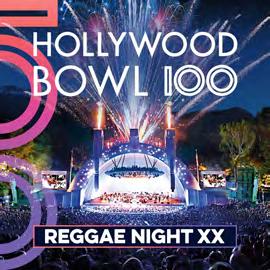
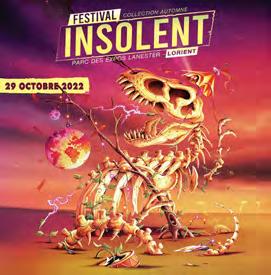




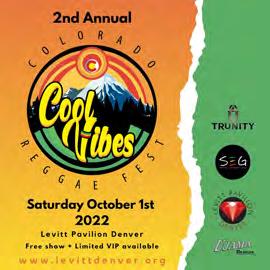
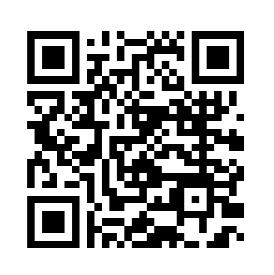
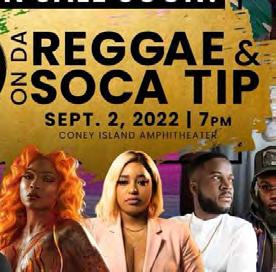
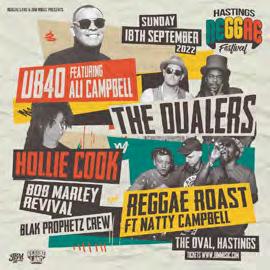

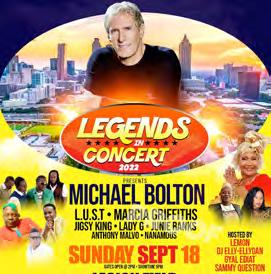



SEPTEMBER/OCTOBER














FESTIVALS SEPTEMBER/OCTOBER 2022 101 Unruly Culture Splash Weekender September 1 - 5 Festival Area in Pag Island, Croatia Colors Of Beat September 2 - 3 Waldbad Mehderitzsch in Torgau, Germany On Da Reggae & Soca Tip September 2 Coney Island Amphitheatre in Brooklyn, NY, USA Reggae Summer Night September 3 Kulturrevier Radbod in Hamm, Germany Dream WKND September 8 - 11 Different Locations in Malta, Island of Malta Reggae Night XX September 18 Hollywood Bowl in Los Angeles, CA, USA Hastings Reggae Festival September 18 Hastings Oval in Hastings, UK Cool Vibes Reggae Fest October 1 Levitt Pavilion Denver in Denver, CO, USA Reggae Rise Up –Las Vegas October 7 - 10 Downtown Event Center in Las Vegas, NV, USA Festival Insolent October 29 Parc des Expos in Lorient, France Dry Diggins Festival September 1 - 4 Nevada County Fairgrounds in Grass Valley, CA,USA HIM Dub Festival September 1 - 4 Praia Fluvial in Rapoula Do Coa, Portugal Jerk & Curry Music Festival September 24 Legion Field in Covington, GA, USA Legends in Concert September 1 8 Legion Field in Covington, GA, USA
L’ENTOURLOOP - LA CLARTÉ DANS LA CONFUSION
Legendary members of L’Entourloop collective, King James and Sir Johnny, have returned with their third album – delivering “clarity amid confusion” across 20 sweeping tracks.
La Clarté Dans La Confusion (“Clarity in Confusion”), released via X-Ray Production, sees James, Johnny and Face B Productions hone the old skool hip hop-meets-reggae style they’re known for – but also throw curveballs into the mix. It’s not really Revival – as the hip hop style and overall production are throwback: the beats are hard, the instrumentation rich and the engineering vinyl style-focused; reimagining old skool DJ techniques in 2022.
The title track features N’Zeng and cements the hybrid flavour of much of the album. Calling Dancers featuring Alborosie and Promoe is straighter, old skool hip hop. Kabaka Pyramid features on Rock Mi Nice, moving into Revival territory with its hard hip hop drum line, reggae bubble rhythm and Pyramid’s singjay.
Madzilla featuring Troy Berkley and Blabbermouf is near-pure hip hop with the guest artists giving exceptional performances. Eternal Roses sees Ken Boothe and Lion In Bed lean into reggae/dub more than hip hop. Florilège with Lyricson, Queen Omega and Red Fox builds on this with samples, synths, a dancehall bridge and onpoint performances. But then Drop featuring Troy Berkley and Dope Saint Jude creates a brooding, trap-reggae track with its ominous bass. La Fleur De L’Âge featuring Degiheugi is back to hip hopreggae.
People is Massive sees General Levy gives his signature, rapid singjay across a frantic jungle cut. Scoville Anthem with LMK, Reverie and Lady
Chann almost feels like trip hop with its hard drum line but ominous bass and potent horns. Then Magistral featuring Bounty Killer and Berkley merges hip hop with an occasional flash of a dancehall clave.
Clin D’Œil featuring Dawa Salfati and The Architect is ambient, ethereal hip hopreggae, while Get Back with Chali 2Na and N’Zeng moves into funky soulled hip hop with its groovy horns and skanking guitars. Mana featuring Marcus Gad and JuJu Rogers moves back to hip hop-reggae - then Lift Up Your Head sees Berkley back for a third time, with O.B.F joining him across the same style but with the odd trap buzz roll and a double-time fourto-the-floor kick.
Way to Be Happy featuring Las Ninyas del Corro is straighter hip hop; Fi Di Yut with Blackout JA and Tippa Irie feels like an 80s sound system dancehall throwback; the brilliant Mumbai 808 featuring Manudigital sees Indian vibes meets modern soca, and Saga with Killa P, Flowdan and Big Red takes the eclecticism further with a trap-meets-soul affair.
The album closes with Downtown (Befour Steppa), returning it to its hip hop-reggae roots across an instrumental track.

Overall, the two stand-outs of La Clarté Dans La Confusion are the coupling of inventive music with potent political and social messages. But also, James, Johnny, Face B Productions and the guest artists’ sheer musicality is off the scale: the quality of the compositions and performances are second-to-none, making La Clarté Dans La Confusion an essential addition to anyone’s collection.
by Steve Topple
102 ALBUM REVIEWS 2022
X-Ray Production - June 10, 2022

HAVANA MEETS KINGSTON PART 2
Few albums have captured my attention as lastingly and comprehensively as Havana Meets Kingston back in 2017. Intriguingly new, this exciting mix of Cuban and Jamaican musical traditions has left a strong impression due to its unprecedented fusion of reggae, rocksteady, son, timba and salsa.
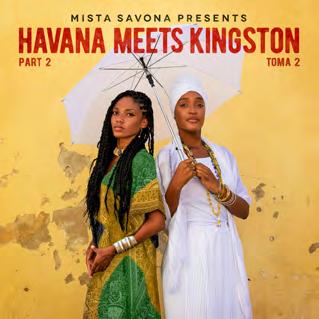
After the roaring success of this unique musical project, producer Jake Savona not only organised a world tour, but also planned his return to the Caribbean right away where he enthused a choice of singers and instrumentalists to participate in the project. Now, part two is out, and it shines as brilliantly as its predecessor.
Recorded at Tuff Gong Studio in Kingston and Egrem Studios in Havana, this special place still breathing the ‘50s analogue magic has lent its unique sonic touch to the music. Mista Savona said about it that “the Cubans told me an angel lives in the studio that blesses the music recorded there”, and blessed this music is indeed. While listening, you just feel that everybody involved gave their best and enjoyed the collective journey, a vibrant energy that runs through all the 15 tracks.
The booming Nyabinghi drums of the first song The Fire From Africa remind us that people living in both Cuba and Jamaica have common African roots, and Micah Shemaiah gets to the heart of this when he sings “To the motherland, I wanna be living in Africa – that’s where I’m from!” Other voices heard here are The Gideon, Anyilena and PuchoMan, who adds some Spanish raggamuffin flavour.
Another powerful piece is Clinton Fearon’s Human Chain. The former Gladiators singer has
Baco Music - June 3, 2022
lost nothing of his vocal magnitude, and the accompanying video brings some urgent images to our attention. Other visuals that are already out for you to enjoy are Siempre Si with Randy Valentine, Brenda Navarrete and Dayán Carrera Fernández (the latter also featuring in Guarachará), Lágrimas Negras sung by Beatriz Márquez, and the title track aka La Canción, again with the amazing Brenda.
Make sure you listen to Lo Que Quieres to hear what a traditional Láud [lute] sounds like (masterfully played by Barbarito Torres), to the funky Beat Con Flow featuring Cimafunk and, most of all, to Reggae Y Son, a kind of HMK-allstars track (check the credits for all the names on there). Oh, the sweetness from A to Z!
The final song, brilliantly delivered by Prince Alla and accompanied by Earl “Chinna” Smith on guitar, reminds us that We Are One despite the differences in physical appearance, culture and languages. We are one in sharing this time and space on earth, and we are made to meet, exchange ideas, strive for a better world - and enjoy music together.
Havana Meets Kingston Part 2 is everything Part 1 promised and more, a colorful, enchanting and intoxicating journey to some of the most talented musicians the two islands of Jamaica and Cuba have to offer. It is also a living monument for Robbie Shakespeare, Winston “Bopee” Bowen and Jacinto Herrera, who were essential in the development of this project, but have spread their wings before seeing it released. Don’t let the summer start without this extraordinary treat, and, if you can, catch the masters on tour!
by Gardy Stein
104 ALBUM REVIEWS 2022
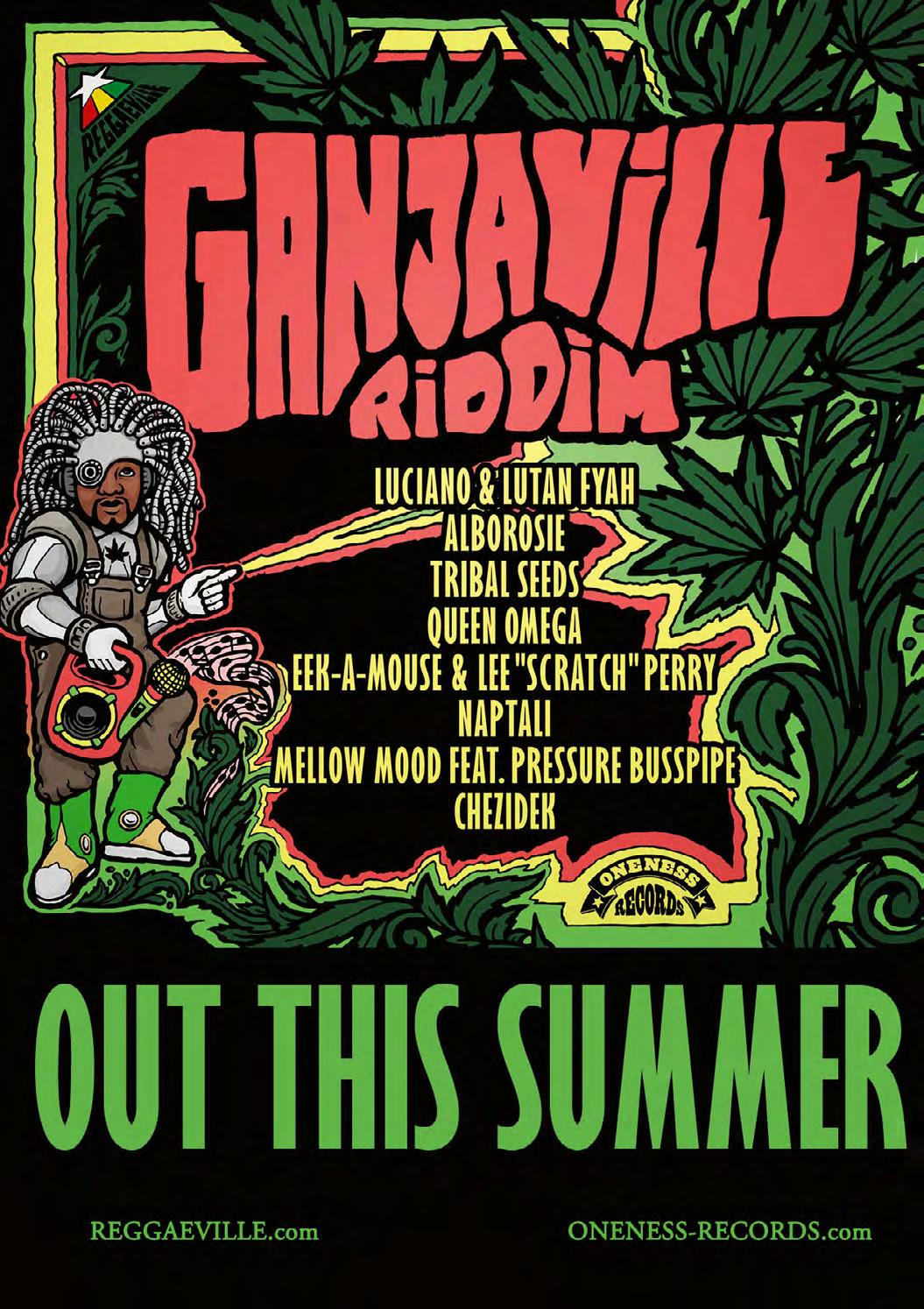
PLAYING FOR CHANGE BAND - THE REAL

“The Real Revolution lives in the spirit of the people and true change comes from within.” - Mark Johnson
Playing For Change was founded in 2002 by producer and sound engineer Mark Johnson, film-maker Whitney Kroenke and the Timeless Media Group with the aim to bring together artists from all over the world – a mission accomplished, given the participation of more than 1,000 musicians from over 50 countries to date. In 2007, the project branched out to form the Playing For Change Foundation, which establishes music schools for children in developing countries, and it was around that time that I started following them.
It is thus a special joy to see them celebrate their 20th anniversary, an occasion marked by the release of the debut album The Real Revolution of the Playing For Change Band. Prepared over a period of five years and recorded in Kingston’s famous Tuff Gong Studio, it captures the vibrant multicultural energy and diverse origins of its creators, amplified further by members of Damian Marley’s band: Courtney “Bam” Diedrick on drums, Sean “Pow” Diedrick on keys and Elton Brown on guitar.
With so many touch points, it is little wonder that the first and title track sounds a lot like Bob, bassline and slow one drop and all. Written by Mark Johnson himself, he had the voices of Mermans Mosengo and Jason Tamba in mind right from the start, and they really delivered. Other masters honoured implicitly on this release are Jimmy Cliff and Lucky Dube, who both shine through the subsequent Young People
REVOLUTION June 24, 2022
In fact, most of the tracks are original creations, some of them giving us a glimpse of the linguistic variety our world harbors through the different tongues they use. Lamuka, Bibamba and Bwanya, for example, are sung in Lingala, and Me Pierdo underlines its Latin influences with Spanish lyrics interpreted by Tula Ben Ari
More stylistic variety comes in with Right Foot Forward, a frisky piece that “just appeared, all at once, like magic, early one morning in Jamaica”, as singer Robin Moxey recounts. Country finds its place on the album as well in When The Music Comes Around, a song that metaphorically describes the perspective of a poor person or a refugee. Instead of running away from problems and bad things in life, Claire Finley suggests we Run towards the good stuff, another track written exclusively for the band.
The only cover song is 54-46 by Toots & The Maytals, and this is a remarkable fact since the Playing For Change movement became famous through the cover versions they recorded simultaneously with different musicians around the globe (if you don’t know these, check the videos of Redemption Song, Lean On Me or What A Wonderful World, for instance – pure musical and visual bliss!).
Wrapped in the engaging cover art by Neville Garrick, The Real Revolution is an essential album for this summer season. The Playing For Change Band unfolds its full potential here, and the listening experience can only be enhanced with a live performance. “Music has the power to break down boundaries and overcome distances between people!”, as the PFC family says!
by Gardy Stein
106 ALBUM REVIEWS 2022
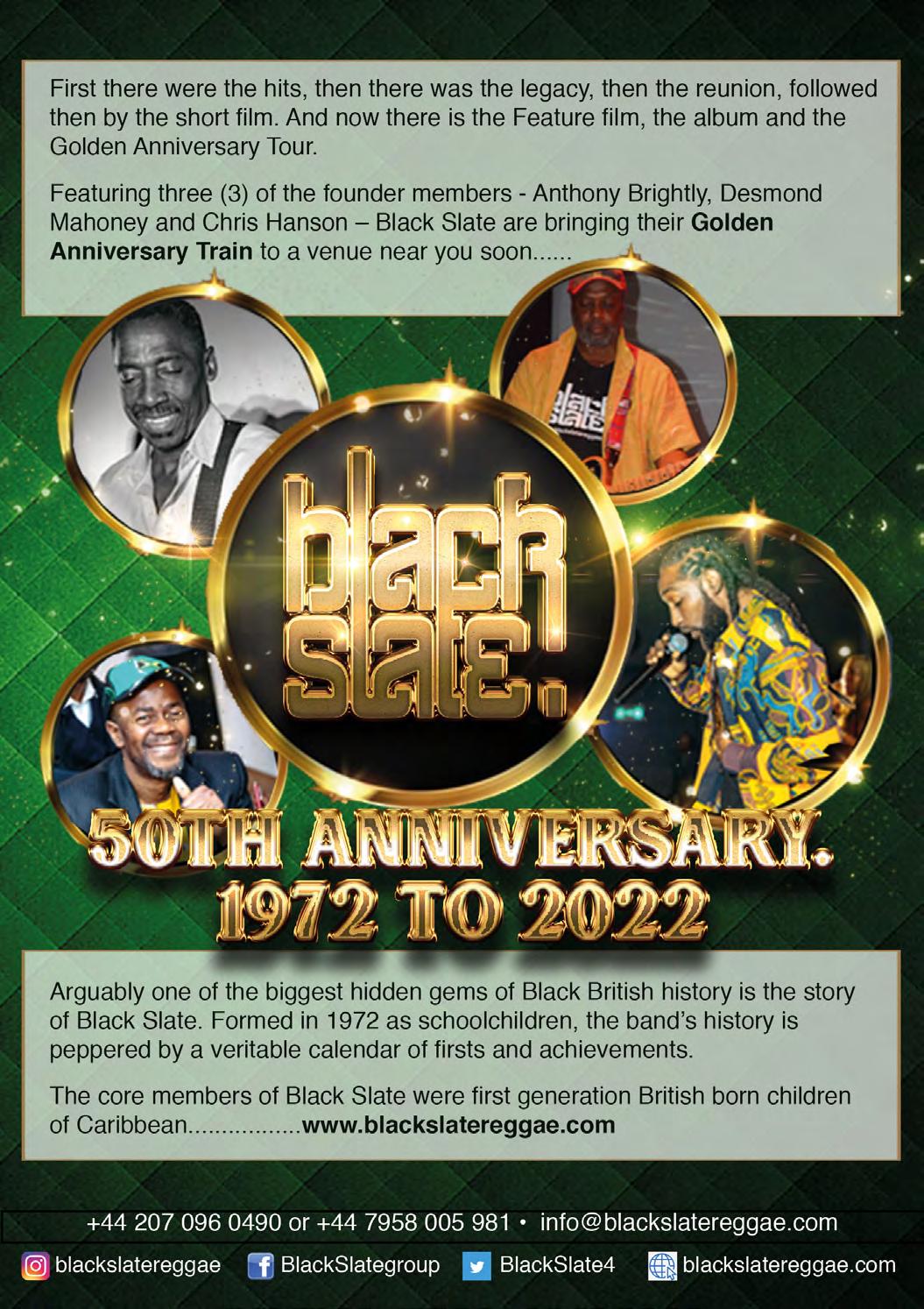

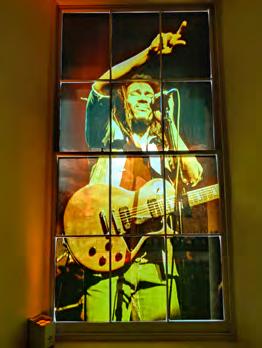
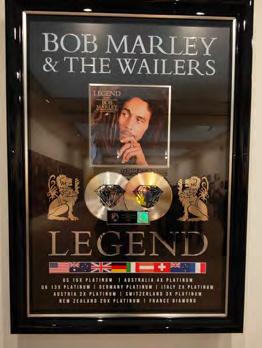


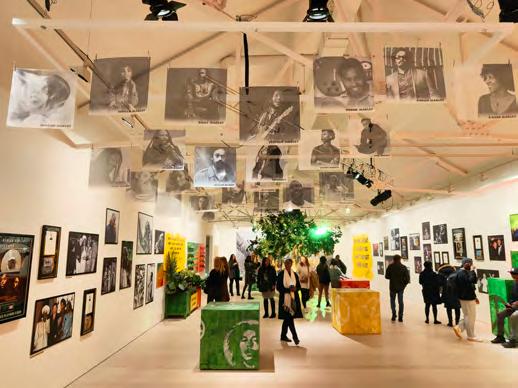

EXPERIENCE LONDON @ SAATCHI GALLERY [FEBRUARY 2 - APRIL 18, 2022] PHOTOS BY STEVE
BOB MARLEY ONE LOVE
TOPPLE





INTERVIEW
CLARKE
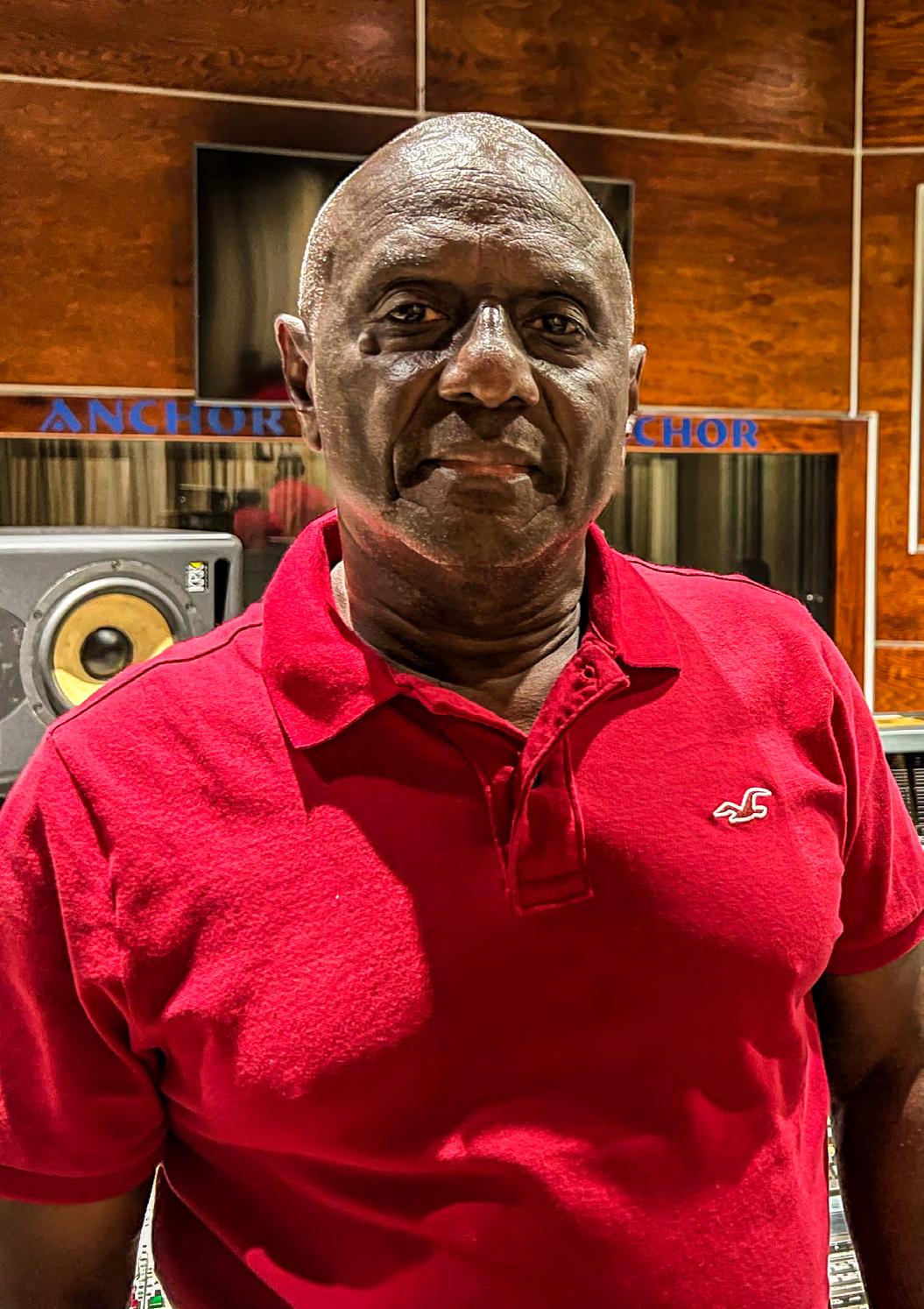
GUSSIE
STORIES ABOUT HISTORIES
BY URSULA ‚MUNCHY‘ MÜNCH PHOTOS BY MUNCHY
The creation, promotion and progress of reggae music is a process and a mission with many talents involved: musicians, artists, engineers, producers, promoters, managers, writers, sound men and women. Gifted and dedicated members of the reggae fraternity have committed their talent, time and energy over decades to steadily foster and develop our beloved genre of music. Take Me Places is a new video interview series by Reggaeville host Munchy that highlights veterans and influential individuals from all parts of the reggae industry. Let the interview guests take you to a place of their choice from which the imaginary journey into their personal and professional history starts! The first one to kick off the series is Augustus ‘Gussie’ Clarke, one of the great producers of reggae and Jamaican music, who has had

a huge impact on the early dancehall era in the 70s, who was instrumental in taking the genre into the digital world in the late 80s and someone who has created so many of the albums that we call classics today. This excerpt is a part of the video interview that will be released in full length, with additional footage of the special location Gussie chose, on Reggaeville’s YouTube channel within the next months as part of the series Take Me Places, and of course, the first question is as always…
Where are we and why did you take me to this place?
We are at Anchor Recording Studios in Kingston Jamaica, which is the largest recording facility. So, I just felt to take you home, give you a treat of what we do and where we do what we do. It’s the correct place to be.
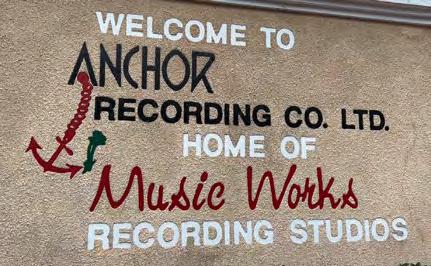
Of course! I am very happy, because I have never been here personally, I have only heard so much about this place. Thank you very much for taking us here to Kingston. Also in this very city, on Church Street, this is where you grew up… 81 ½ Church Street, right.
Please tell me a bit about your childhood and what role music played in that.
Normally or instinctively I’m a creative thinker, I am never complacent with anything. We started with a little sound system, King Gussie Hi-Fi, then we started importing and exporting records, so I had the connection to all the players who were making music. In those days downtown was pretty much the hub of music with Tippatone and the sound systems. Culturally it was a part of our everyday life. I then love music so much that I started importing equipment, built basically a home studio, started cutting dubs upstairs for all the sound systems who were doing so well because when we were importing records, we were selling to the sound systems in those days. So I had that natural clientele. And producers, Lee Perry, Channel One, everybody gave me their tapes to cut dubs. I
INTERVIEW GUSSIE CLARKE - TAKE ME PLACES 111
bought a dub machine that Duke Reid had at Treasure Isle studio. In those days we found some unique ways of doing stuff. In those days you had 8-track tapes, so we would get the 8-track and separate the music from the vocals. We could do a whole lot of clever things. We bought sound effect albums and spring reverbs, and we were cutting dubs like crazy for both Jamaicans and people all over the world. Everything was kind of a process of unintended evolution.
You said “upstairs”. We are talking about your mother’s house, right?! Yes, that was my mother’s house at 81 ½ Church Street.
What did your mother say when a melodica player was in her closet recording?
See, this is one of the things with most parents and as a parent I’ll tell you this. If you understand what your child or children truly love and they seem to be good at it, it is best to encourage them. If not usually when they get older and have the ability of making their own choice, they’ll go there. So I was supported and encouraged and it led to where I am today.
So she understood the enthusiasm you had from a very early age. When did it start?
Because when you were 18, you already had your first sound system, that you built yourself.
I started when I was at Kingston College. I realised that academics was my strongest skill. So I attended woodwork class and learned how to make sound system boxes and speakers. To get an amplifier I saved lunch money and bought the parts. She paid the technician to make the amplifier ultimately. First, I had a little solid-state amplifier. I swapped that amplifier for a transformer because you know technicians made the amplifiers. So I got a transformer from Witty, whose father had a sound system. I swapped that to Errol Dunkley later on for the use of a riddim, then I had U-Roy voice The Higher The Mountain. The whole thing is just evolution, unintended and things just happened.
You mentioned U-Roy and The Higher The Mountain, the first single you recorded with him. How did you know him and how was that song actually recorded? Was that also at your mom’s place?
No, no. What happened is that as I said I was interacting with all the sound systems because I was cutting dubs and all of the connection with U-Roy and these was just naturally. So, I approached him and said “Look, I have this riddim and can you do a
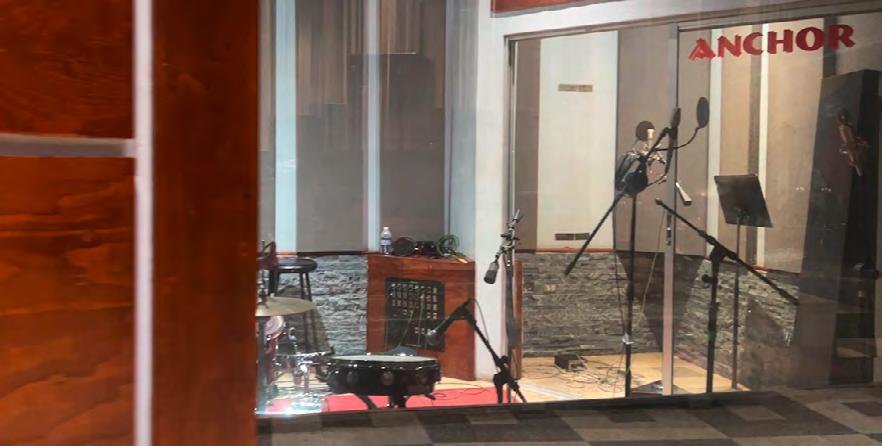
112 INTERVIEW GUSSIE CLARKE - TAKE ME PLACES

song?” and the gentleman he was, he agreed to and we did it. Same thing with Big Youth. He was playing on Tippatone sound. We licked over the Skylarking riddim and went over to Big Youth and he did Screaming Target and the rest is history.
You mentioned U-Roy, Big Youth, there was also I-Roy.Those were the first deejays to actually start the toasting. Tell me a bit about the spirit of that time. This was an innovation musically. Did you dig the spirit or were you just always eager to come up with new things? Why did you get into that? It was the order of the day and those were the persons that I had interaction with. In those days the deejays from the sound systems were the go-to-persons. They are the ones who go around and try to get riddims and specials for the sound system to give it an advantage. I had that direct connection and relationship hence I went directly to them and then later on I moved on to vocal-
ists because as I said, I was buying, exporting and importing records, so I would have had to deal with a lot of artists and producers who were self-producing and self-distributing. So I could have reached out to people like those. Because they were artists and they were there, I felt that together we could have collaborated and do something unique and different. I am not the producer who you hear that somebody says “Oh, he wasn’t in the studio when we built the riddim or we voiced that song”. I was directly hands on. If I have an agreement or understanding I would like to work with someone, I would always be there in the studio and I’ll be directing and choosing. Because I have to be careful of exactly what I know I want and what they are willing to deliver. Sometimes it doesn’t work out, sometimes it works out.
Are you a man that can still enjoy the music at the same time, even though it is a business and it is work?

114 INTERVIEW GUSSIE CLARKE - TAKE ME PLACES
I can easily respect and understand that I have two sets of choices as an individual and as a practitioner. And I have to be very careful. Things I don’t like doesn’t mean that I won’t record it and vice versa. I have to separate that thinking from a business perspective. For example, when I’m recording a song, initially the first part of it is creative. We’re taking the vocals, we’re doing all of that, the song is good, great! After we have done the vocals, I move to how do I approach this, so that it becomes more commercially capable, acceptable and possibly successful. So those decisions, my decisions change at different points in any production. Also, if I’m doing a song with you and at the point after we have voiced the song I feel that it’s not the best song for you, I’ll get somebody else. Good example, when we were doing a Mighty Diamonds album and we had Rumours written, I felt that this was not a Diamonds song. I had Gregory Isaacs do it. We did Just A Little Bit Longer with Dennis Brown Maxi Priest came in and I felt this could be a greater commercial success with Maxi. As a producer it is my right and I make these choices of what is best for the song. That’s my first thinking: what is best for this song? Not what is best for this singer. Because not every singer can interpret a song the way how sometimes I would like it to be. I do have that right and I make that choice.
You mentioned Gregory Isaacs. That is a name that is associated with you a lot. I spoke to Flabba Holt also for Take Me Places and he

said that the fascinating thing about Gregory was that he would never sit down and write one line of lyrics. Tell me also a bit about him! Gregory Isaacs I would say was the most quick-witted human being I have ever met in my life. I remember we were at Dynamic Sounds and we were recording an album, I think it was Private Beach Party, and I think one of the songs he called it Nick Of Time. So I said to him “Why it name Nick Of Time?” He answered “Because I just made it up in the nick of time.” He was quick-witted, he was clever and he was a natural. Gregory was a whole experience by himself. We as industry persons who were familiar intimately with Gregory remember more things about Gregory that was fun than his talent, because he was just a humorous person and a great guy.
Those are wonderful memories. You also mentioned the Mighty Diamonds, that your work is also associated with a lot. Their album The Real Enemy was sort of a milestone, taking reggae music to the digital era. When you first produced that record was anybody ever hesitant like “What are we doing here? What is this new style?” or what was the spirit of the time?
It was not any intent to do any technical shift or dynamic change or anything. This thing just flowed. One of the things that made a difference with me or the things I did versus others, was that in Jamaica at the time basically there was one brand of equipment. They were called MCI. I believe that part of my whole thinking

INTERVIEW GUSSIE CLARKE - TAKE ME PLACES 115
you and I will do, but you and I will do it dif ferently and difference is what brings success and failure. So when I decided that I needed to be in my own studio, although we didn’t have a space to build a studio, we turned a bathroom into a vocal booth. It was a whole lot of configurating but we were up for it. What happened is that I thought: “Why do I need to buy what everybody has? There is other equipment out there.” Dynamic Sounds was the agent for MCI in Jamaica. So I went outside, went to the UK, found other brands of equipment and that changed the sound automatically.
Because everything was the same by everybody, either something from 30 years ago or MCI. I felt there were other options and I went for it and that in itself had a serious value and a change. So it was coincidental, it wasn’t deliberately that we were going to change the sound, no. People were receptive because the songs were of great quality as songs. People listened to the songs and enjoyed the songs, so it was not a matter of listening to the sound. The songs were just good and everybody enjoyed them. Even today they are being played and they don’t sound as outdated as some stuff.
You mentioned being different, buying different equipment. Were people ever in doubt when you came up with new concepts, new ideas, things moving forward?
As Jamaicans, we are extremely creative and people expect and love new things. The

or anything. If people had their own studios, if they were using stuff – I don’t know what their personal feeling was – but everything changes, time changes, technology changes, sound changes. He who can’t accept change, stay where you are, you’re good.
We brought a whole lot of difference to the game. For example, we brought the understanding that people can get royalty statements and they can earn. Probably about 70% of the songs that we had people sing, they weren’t the writers. We brought in a team of writers and we created stuff for people. They didn’t even know what they were going to sing until we said “Here is the song”. We made demos and gave them to everybody. When we wrote Telephone Love for J.C. Lodge she was not all that receptive. She was negative to it. She went home, came back the next day and agreed and the rest is history. A next thing for me is: quality of content is king! As I said I have some creative traits. I can identify good elements in a song and decide “Ok, we’ll do this one” or “Not that one”, “Let’s change up this, move the chorus here, put the verse there!”. We did all of these things. So when someone came to sing, all they needed to do is sing. Usually it works, everybody was receptive and it has worked for us all.
Do you think that this is also what a lot of artists especially appreciated about working with you?

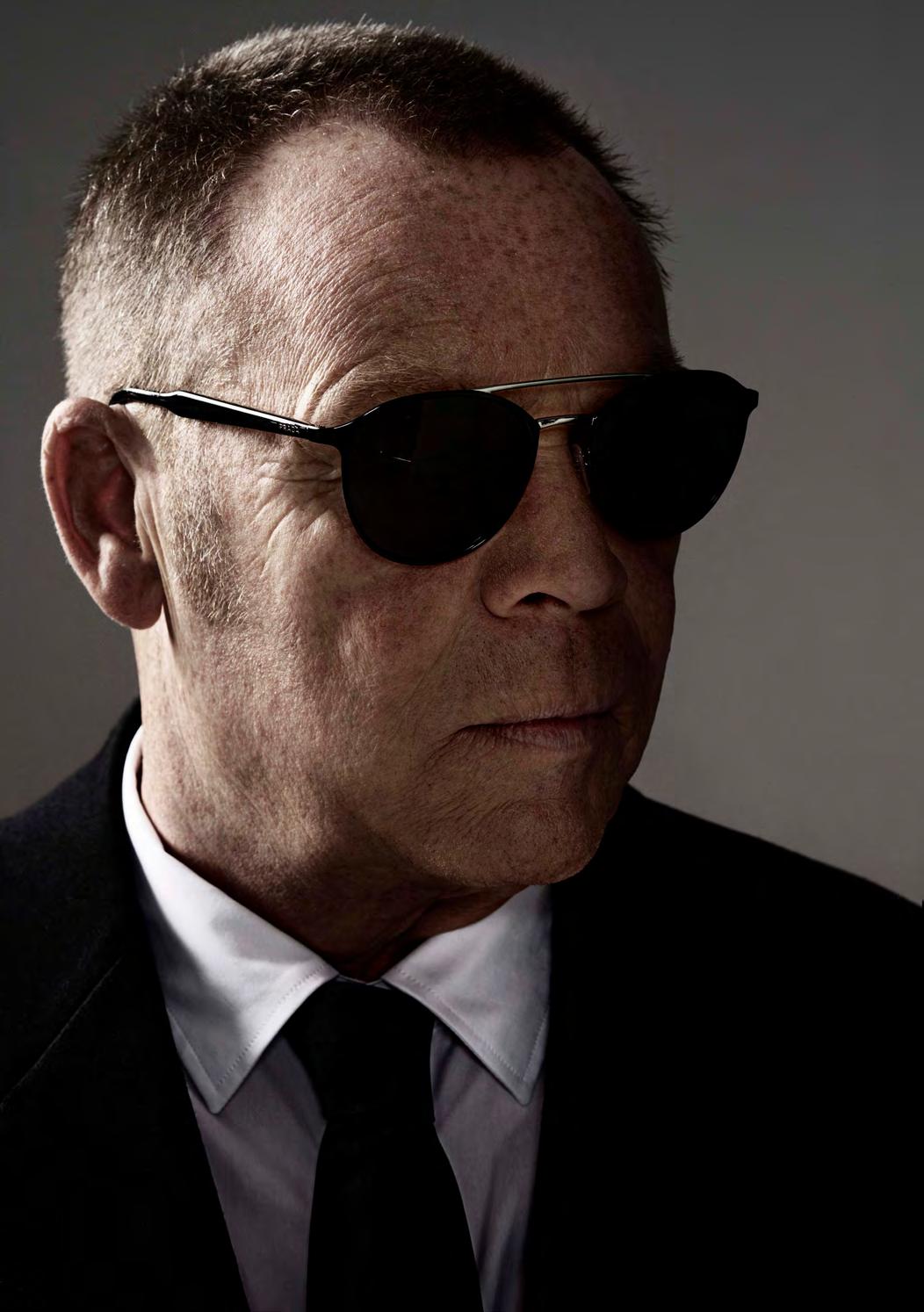
ALI CAMPBELL GIVING THANKS FOR ASTRO FEATURING
INTERVIEW UB40
UNPRECEDENTED TIMES
BY STEVE TOPPLE | PHOTOS BY ALEX BARRON-HOUGH
UB40 feat. Ali Campbell & Astro are back with a new album – but after the sudden and tragic death of Terence “Astro” Wilson in 2021 it has taken on a whole, new meaning. Unprecedented is a 14-track journey through the reggae-hybrid style the band have become so famous for. Featuring a host of re-imaginings of classic tracks plus new material, UB40 feat. Campbell and Astro

have teamed up with some legendary names like Sly Dunbar and Robbie Lyn to produce a brilliant project that will please fans and music lovers alike. But despite this, the loss of Astro has hit the whole team hard. So, Reggaeville caught up with Campbell to discuss Unprecedented, the band’s history, doing political music, ‘haters’ and of course, the loss of his buddy of 40 years.
The new album, Unprecedented,
I think really, if you added up the days that we were in the studio you’d say it was done very quickly…! We started thinking about the album just before Covid: we were gigging in Puerto Rico, Brazil, Kenya - all sorts of
places - and then it was all stopped because of Covid. Before we started that leg of gigs, Astro and I had taken a week out and gone to Tenerife to chill out and to start working on the album that we had committed to do. And you know obviously I had things lying around… ideas and stuff, like I always do.
is superb. Was it a long process to create or did it happen naturally?
INTERVIEW UB40 FEAT. ALI CAMPBELL 119
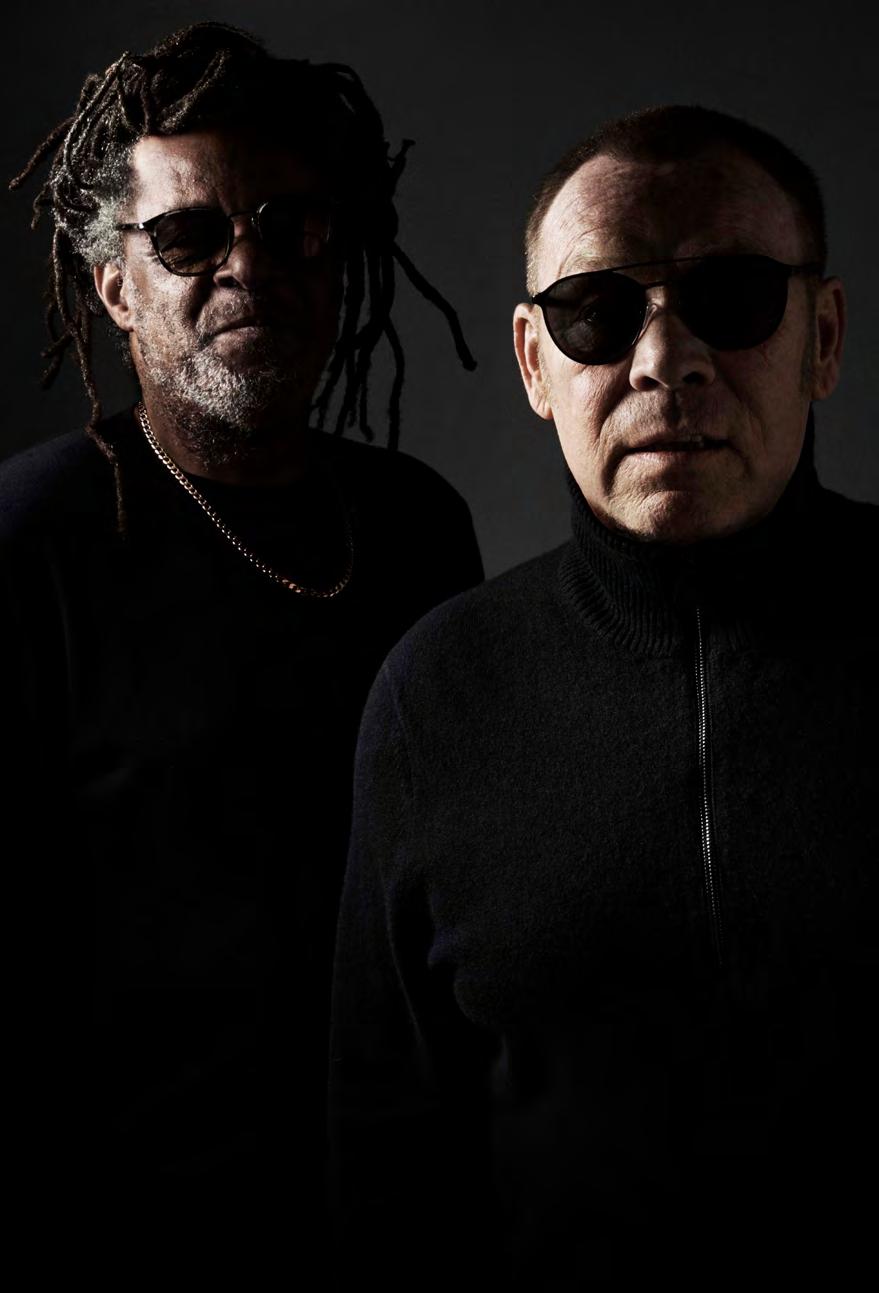
120 INTERVIEW UB40 FEAT. ALI CAMPBELL
So, we spent a week sort-of pretending to write an album [laughs]… The first one that we did was the cover of Caught You In A Lie with Indica, my daughter. That was just to get a feel for Dean Street Studios [in London]. I’ve worked there before, but it’s always nice to start again and get the band in. I’ve had those players now for nearly 15 years. We are like a bona fide band - it’s not just a bunch of session players, even though they were session players originally. I love Colin McNeish and Paul Slowly: they’ve got a great drum and bass thing going on. It’s better live than it is recorded - which is a good thing.
So yeah, my UB40 band. It’s a joy to work with them, I love working with them because they’re just so quick. If I get an idea and I’ll say to any one of them ‘it goes like this’ - they’ll just do it. It’s like working with Sly Dunbar or Robbie Lyn: it’s one take! Sly goes “Well, what tempo you want Daddy?” and I’ll go “Well, I don’t know yet…!” and he’ll listen to the chords that me or Robbie put down and then find the perfect tempo. And it’s one take. I mean I come from the days when there’d be eightto-sixteen hands on the on the mixing desk; everybody mixing it at the same time and if somebody’s soloed something or made a mistake we had to start again.
So, it’s just a joy now to be working with musicians who are good enough - because obviously we weren’t musicians! The original UB40, we were self-taught. We literally picked up instruments – well, other people’s instruments as it was - and then we copied one record by Sly and Robbie called Across The Border, the Gregory Isaacs track. We literally, parrot-fashion, went “Oh, so that’s what the drum does; so that’s the one drop”. We weren’t musicians, which I think was pretty obvious with our first album…!
Umm, that’s debatable…! Well, people loved that album [1980’s Signing Off] and it did sell 8 million copies
– but it was made on a four-track, you know? Listening back to it now, I can see its appeal because it is so homegrown, it’s so homemade sounding and naïve; there’s traffic and birds on it because we were doing it in the garden…! I think that all these years later, the vibes that I got in Jamaica and in Dean Street Studio have relaxed us, like that very first album - just because it was me and Astro doing what we love doing and what we try to do best, and it was me and him. I’d just lost the backing vocalist that I’d had for a decade, Matt Hoy, so all of the harmonies that I’d been thinking about for him had gone out the window. So, Astro became a lot more involved vocally - it’s a new sound on this album because of Astro being on so much of the backing vocals. That was cool, and Astro was really happy about that because he felt more involved in stuff and it gave the album a different sort of sound.
Your re-imagining of Stevie Wonder’s Do Yourself A Favour was a brilliant arrangement. Did you really do that in one take? That was one take! And all the “doo-doo-lada” stuff on the keys Robbie Lyn’s doing, because he knew the original. I worked with Sly and Robbie Shakespeare, bless his heart – we lost Robbie, my lovely friend Robbie – and he was in Miami when we were doing this. So, we used Chris Meredith who was the bass player with Jimmy Cliff for a long time and he works with Stephen Marley. But I worked with Sly and Robbie, and Robbie Lyn, over the years – I’ve probably done half a dozen albums with them. So, I work really easy with them - and that’s why I go to Sly because I know how easy it’s going to be. Nobody’s gonna go “That’s not authentic”, because it’s Sly Dunbar, the greatest drummer in the world as far as I’m concerned…! It’s one of the “No’s” of the haters as well, that’s why I also liked using Bounty Killer…!
I’ve always been immersed in reggae - that’s the only kind of music that I really know anything about. I liked Motown and soul, but
INTERVIEW UB40 FEAT. ALI CAMPBELL 121
generally reggae’s what I grew up listening to. Coming from Balsall Heath [Birmingham, UK] I had West Indian and Jamaican neighbours; all my mates were West Indians and Jamaicans. I was going to parties at 11 years old, and that was just to get the leftovers of the curry goat…! You know, the curry goat juice and the white rice that was left after all the curry goat was eaten! I grew up listening to reggae - so if I was ever going to do any music it was going to be reggae.
Unprecedented is still very much a UB40style reggae album, aside from two tracks. Weren’t you tempted to go fully eclectic like so many acts now do?

Well, in as much as I’ve never really been strictly reggae! [Laughs] My reggae is different from Jamaican reggae and always has been, it’s a hybrid and I’m aware of thateven when I’m using someone like Sly Dunbar or Robbie Shakespeare, I still know that it’s not going to be a Yardie product. It’s
going to be UB40 or what I consider to be UB40. So, I’m not precious about it and I’ve worked with millions of people - Ladysmith Black Mambazo in South Africa, I’ve done tracks that aren’t strictly reggae, but the foundations are. It starts off reggae – drum, bass and keys - and then it will morph into something else. Reggae is all I really know and understand - and I still don’t properly understand reggae [laughs]. For me it’s like a production journey I’ve been on. I’ve been around for nearly 40 years; I’ve always produced myself as well - we’ve never used producers apart from on a few occasions and they were always disappointing. So, it’s best to do your own stuff because you know what you want - and if you don’t know what you want then let somebody else produce it. But it’s not really your product, is it?
There are some great reworkings on Unprecedented. But I don’t like to call tracks ‘covers’ – I prefer ‘re-imaginings’…
122 INTERVIEW UB40 FEAT. ALI CAMPBELL

[Laughs] So, like all the Labour Of Love tracks that we did - complete and total classics. But we were told when we first started “No, write your own stuff”. We wanted to do the Labour Of Love album just to let everyone know this is why we love reggae, because these are the reggae classics: Cherry Oh Baby, Red Red Wine. This is why we love reggae, and we were right - because we did the Labour Of Love series and that sold 21 million albums. So, we weren’t writing in the first place but we were persuaded to write our own stuff because that was the order of the day in the 80syou had to write your own stuff. And we were happy to write our own stuff because we had the platform and we felt obliged to say something worth saying if we were going to write our own stuff. So, that’s when we got the boring, the morose tags - which was a load of nonsense because we were the party band of the 80s and 90s!
Jamaicans love country music – so reggae is actually the same format. It’s a rimshot, it’s a one drop-type drum beat that comes in country music - it’s the same line up but with a steel guitar instead of a keyboard or organ. So that’s why it’s easy to do country - anything in 4/4 time is easy to do with in reggae. I did a great album - I think it was a great album - called Great British Songs with Sly and Robbie and Robbie Lyn, probably about a decade ago now, where we covered The Beatles, The Who, The Kinks, The Stones, Free… I did this project with Radio Riddler who were the drummer and keyboard player from Fun Loving Criminals - they’ve reinvented themselves as Radio Riddler. And they did Purple

124 INTERVIEW UB40 FEAT. ALI CAMPBELL
Why do you think reggae lends itself so well to reworking songs from other genres? Like the Kris Kristofferson country track you’ve done on Unprecedented, Sunday Morning Coming Down…
Reggae, which is Prince’s Purple Rain in reggae - the whole album. They asked me to do the lead vocal on Purple Rain - and I was thinking that is the most unlikely cover that I’ve ever had to do…! But I did it and it was great and it was a real big favourite with the fans. After that I thought I’d love to do standards, Great British Songs, in reggae but with Sly and Robbie so nobody could fault me - the haters couldn’t poke fun at me just because of who I am. So, I used Sly and Robbie and I did All Right Now by Free, Honky Tonk Woman by The Stones, Squeeze Box by The Who and it was brilliant! We did a version of Gerry Rafferty’s Baker Street which was Sly’s favourite one [impersonates Sly Dunbar] “I love that one, Ali!”
That was the pinnacle of covering songs that you wouldn’t think or dream that you’d ever get a reggae cover. And now you know everyone’s doing it. My friend Wayne Jobson is a Jamaican producer and he’s wor-
king with Hall and Oates who’ve just done Maneater with Sly Dunbar. I think they’re doing like a bunch of their hits with Sly. So, projects like that are going on all the time and I think it’s great, because obviously I love reggae and the more reggae versions the better!
As young kids growing up listening to reggae, all of the stuff that we thought were reggae songs and reggae classics were actually covers of RnB tracks. In Jamaica you didn’t have IRIE FM in the 70s or 80s; you didn’t get reggae on the radio. So, all the reggae we listened to back in England were covers anyway. I don’t feel a way about covering stuff. I knew I’d be slaughtered, or I thought I’d be slaughtered, for doing the East 17 track [laughs]. Nobody knows what to make of it, because it’s a pop tune by a boy band and it was then their big number one. Everyone’s just sort of glides over it and pretends they haven’t heard it [laughs].
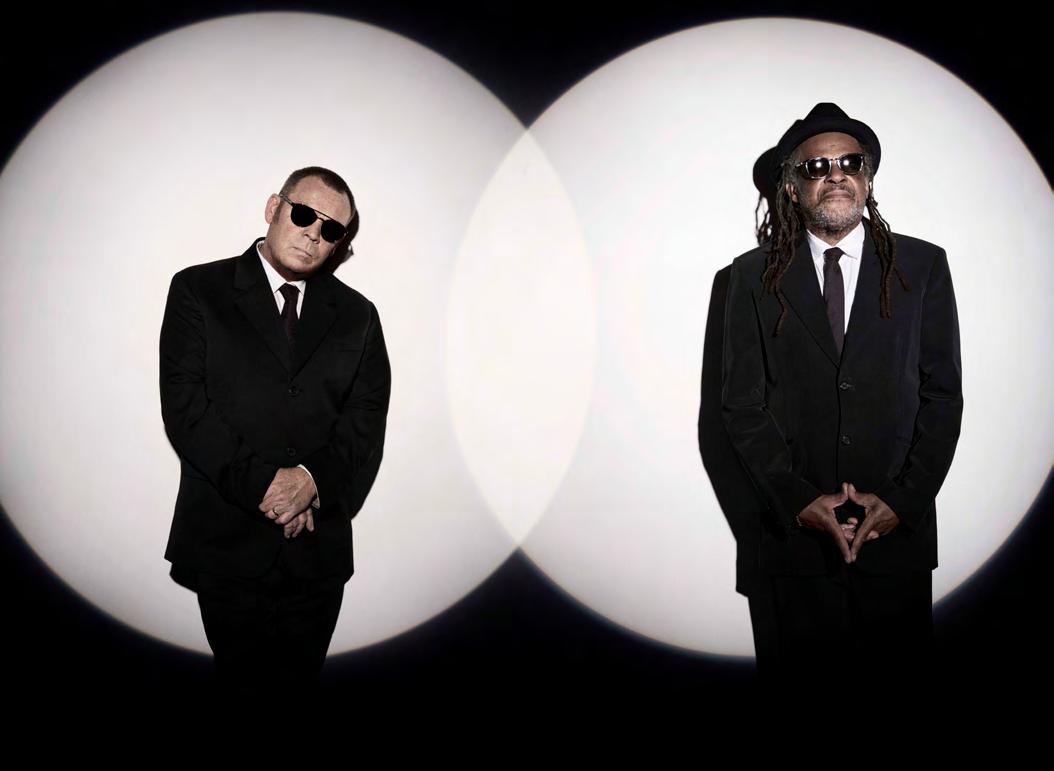
Really? I wrote in my review it was brilliantthe strongest re-imagining of the album! Thank you very much! You’re the first one that’s really said that. Most people just look the other way, start doing their shoelaces up and stuff [laughs]. I’ve always loved that tune when it was originally out: the fact that Tony Mortimer wrote it about his dying brother, and him being in hospital watching him dying. And of course, it does become more poignant now with Astro’s passing. But I’m really, really happy with that review so more power to your elbow, sir!
The original tracks on Unprecedented are superb, too – especially the title track, which is like the other new songs, very political. Was it important to balance message music with the lover’s and feel-good work?
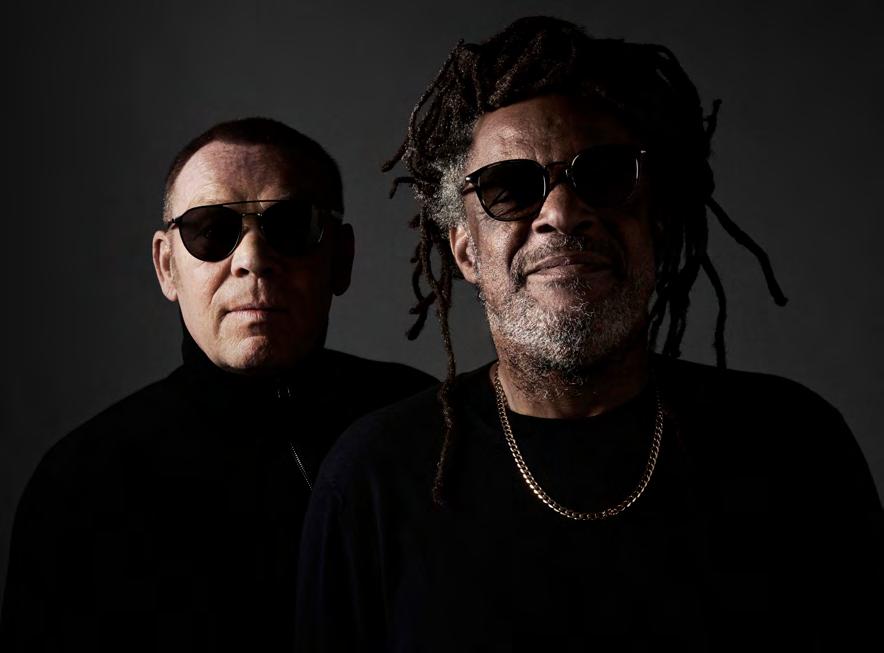
I think that’s something I’ve always done. We’re doing Unprecedented [the song] live at the moment and it does put a bit of a downer on the show! It is a very ‘uppy’ show…
but people have said “Well I don’t know about Unprecedented” because people do listen to it and then it does put a downer on things. But I think that’s part of my job - it’s supposed to sound menacing and supposed to unsettle, because of the subject matter. You don’t change anything by singing about it, but it’s worth being serious about it. If you’re gonna take on a subject, you might as well take it on properly. It is unsettling and a bit uncomfortable - and I do watch people in the audience shuffling about, becoming uncomfortable when I’m going “Doctors and nurses dying, the politicians lying”. It’s not anything that they haven’t heard before. It’s just I don’t think people like being reminded about it especially when they’re trying to have a dance to some reggae.
But I feel obliged. If I’m going to write a track and I decide to write it about the absurdity of what we all went through for two years, you don’t have to labour the points,
126 INTERVIEW UB40 FEAT. ALI CAMPBELL
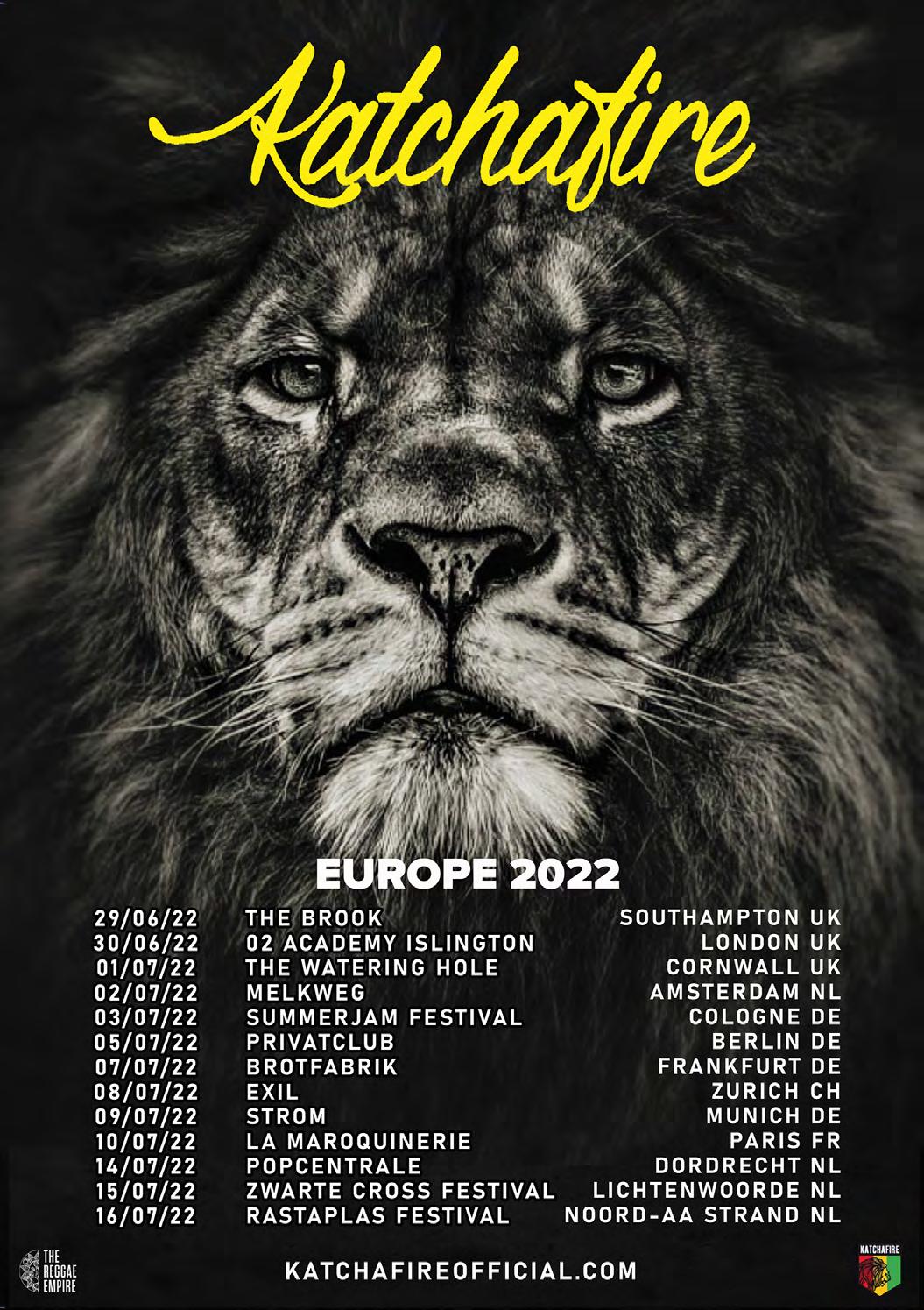
just let people know how you feel. I think Astro’s fairly humorous at the end. We tried to lift the mood a little with the “headless chickens” bit, but even then, that makes you think harder. I’ve been influenced by lyrics. But when people say “Do you think you influence people with your lyrics?” - I haven’t got a clue. All I can say is that Bob Marley’s lyrics, Stevie Wonder’s lyrics, changed my life when I was a kid. Tracks like Get Up Stand Up and Small Axe literally changed my life. So, I know that people are listening, and some people might get something from it - and that’s all I can hope for really.
Losing Astro must have been devastating. How are you feeling about releasing the album without him?
Obviously, his passing was a big shock. He was there watching the Twinkle Brothers with his friends one Saturday and four days later he died of a simple virus - it wasn’t even Covid, it was just a cold, basically. It was a massive shock, but I do give thanks for the fact that we went to Jamaica. We spent eleven days in Jamaica and only three of those days were in Kingston with Sly and Robbie because they’re the “one take” boys. So, after not seeing each other really for 18 months [due to the pandemic], I thank God I got that time with him. It was the same with the time in Tenerife, it’s now time I can treasure – but I wasn’t aware that was going to be it.
It’s hard to release Unprecedented without him, but at the same time I think he was proud of it. He was happy with what he’d done with the album. And he was in a great place, we’d just come back from Jamaica and we’d been working in Dean Street – and then suddenly he went.
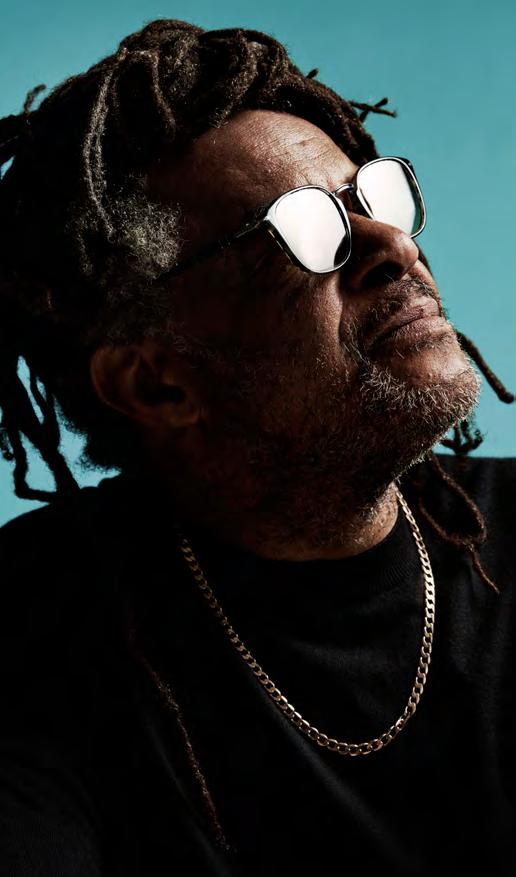
Everything that Astro did is his legacy: his humour; he brought a smile to everybody’s face. I think his “headless chicken”’ lines will be remembered fondly and people smile whenever they hear that. What can I say? I lost my buddy of 40 years. For the last decade we spent almost every day together apart from the Covid bit. So, it’s hard going but I’ve got a great band around me and a great band of friends as well. So, onward and upward.
Well, I’m sure he’s watching down on you and is really happy with the album – as should you be. Ali, thank you so much for speaking to Reggaeville. Thank you very much. Thanks for your positive vibes, and big love - keep up a good work.
128 INTERVIEW UB40 FEAT. ALI CAMPBELL
UB40 feat. ALI CAMPBELL & ASTRO - UNPRECEDENTED
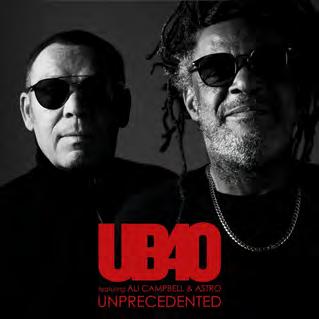
After the sudden and tragic loss of Astro, UB40 feat. Ali Campbell are set to release the final album ever recorded with him. And it’s an utterly fitting tribute to the late, great man.
Unprecedented, released via Universal Music, is a 14-track journey through UB40, Campbell and Astro’s numerous reggae-hybrid talents - with production in-house as always. Four of the songs were recorded in Jamaica with legendary names like Sly Dunbar and Robbie Lyn. Overall, the majority of Unprecedented’s tracks are reimaginings – and all have been done extremely well.
What Have I Done is forward-moving, unfussy, upbeat reggae; a reworking of rocksteady group The Frightnrs’ original. Sunday Morning Coming Down moves the album back to straighter reggae: a brilliant reimagining of the 70s Kris Kristofferson country track.
Sufferer is an interpretation of the Kingstonians’ well-loved song. Astro takes lead vocal here, and his performance is very pleasing: working around a delicate yet expressive falsetto which hones in on the lyrics perfectly. Gappy Ranks gets the UB40/Ali/Astro treatment with Heaven In Her Eyes Do Yourself A Favour (the Stevie Wonder standard) is brilliantly reimagined, too.
Stay Another Day (originally by UK boy band East 17) ends up being perhaps the strongest reimagining of the album – brilliantly mixing parts of the original score with new, reggae-laced elements. It holds particular poignancy given Astro’s passing.
Bill Withers’ Lean On Me is actually the only reworked track that’s not reggae: straighter soul-pop aside from the bubble rhythm-laced bridge. Its remix features Bounty Killer in a full-on, old skool dancehall affair. Caught You In A Lie, a cover of Louisa Marks’ classic, is gorgeous – its main vocal coming from Campbell’s daughter, Indica. Then, the team have given us some original songs as well.
We’ll Never Find Another Love slows the pace with some throwback vibes, coupled with an attractive horn line from Colin Graham and wellplaced synths. Emperors Wore No Clothes is more pleasing reggae, but again with some searing lyrical content about the state of our political leaders. Happy Includes Everyone strays into positive soca-meets-something-rock-like. Mellow is beautifully scored, as Campbell and Astro address the anger that so many people feel in the world today and how it is often unproductive.
And the title track is searing. Its minor key coupled with the ominous use of synths and ‘telephone’ engineering across parts of Campbell’s vocal creates a haunting, almost Synthwave feel. This marries with the damning lyrical narrative about political failures during the coronavirus pandemic. It’s a stand-out, and Astro’s singjay is particularly poignant.
Overall, Unprecedented is an absolute success from Campbell, Astro and the UB40 team. It’s pitch-perfect and shows that after all these years, they still know how to produce a top-quality album in their own unique way. But most importantly, it’s a fitting, posthumous tribute to the life and talents of Astro – showing him and the group at their very best. Wonderful all round.
by Steve Topple
ALBUM REVIEW UB40 FEAT. ALI CAMPBELL & ASTRO 129
Universal - July 1, 2022
INTERVIEW
THE MOVEMENT

ALWAYS
ME
WITH
EVERY DAY IS A BLESSING
BY GARDY STEIN | PHOTOS BY JOSER CAVADA
The US-American reggae scene is probably the world’s biggest and most diversified, next to Jamaica and the UK. For one thing, this is because of the sheer number of potential listeners – given 330 million inhabitants, even the low number of 1% identified by Statista as the total reggae consumption in the States makes 3,300,000 people who listen to this genre. Secondly, the quality of the music created is certainly a decisive point. John Brown’s Body, Rebelution, Groundation, Tribal Seeds, Slightly Stoopid and SOJA publish a steady flow of fine music, and the latter even took home the Grammy this year. A band that continues this list is The Movement, around for almost 20 years now. Their new album Always With Me is captivating: a whirl of different styles and features that is the result of constant growth, authentic connections and real-life experiences. Would you believe that, when they started out, there was no reggae scene at all in South Carolina?
In our first ever interview with The Movement, lead singer Joshua Swain shares stories like these with Reggaeville, and of course the new release is prominently featured as well, so make sure you read on.
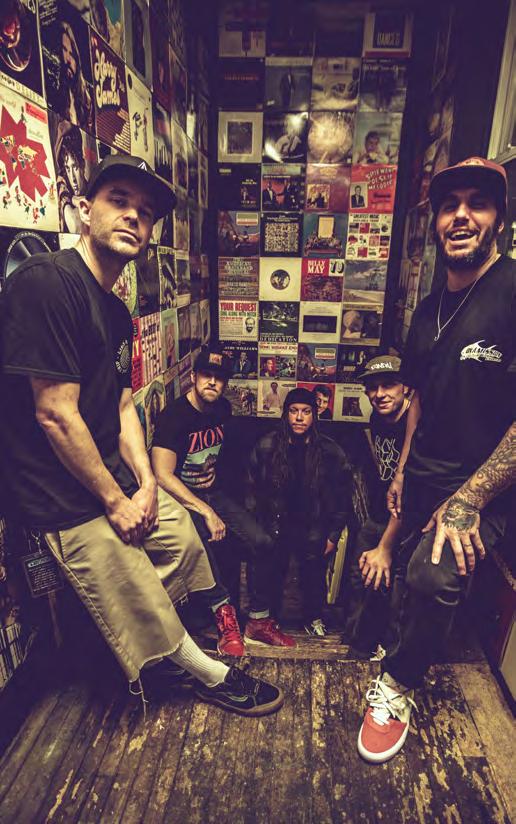
Since this is your first interview with Reggaeville, I’d like to go back in time a bit. First of all, how did the name come about? I was really young when I came up with it, about 18 years old. I listened to a lot of Rage Against The Machine back then, and they were always talking about “It’s a movement”, “Movement of the people” and all that. I listened to a lot of hip hop too, so it was “the movement” there as well, and I just kind of
had the idea and wrote it in my notebook, writing it in different ways and trying cool fonts, so it just…
Stuck! Who was in the band in the beginning? Well, it was me and one of my friends from high school, we played soccer together, we kind of started it. We did the first two records together, and for at least a year or two we were just two guitarists singing.
INTERVIEW THE MOVEMENT 131
When we would play live, I would turn around and hit play on a 4-track tape machine. We would make our own drum beats on this little drum machine we had, and I would record basslines on to the tape machine, then I hit play as I said, then I hit stop and fast forward to the next tune or whatever, and hit play again (laughs), that’s how we started. And then we finally met a DJ who could back us up and play the tracks, and in 2008 we ended up meeting Gary and Jason, who are our drummer and bassist now. We’ve had members go in and out, it’s been crazy, I wasn’t in the band for a year and a half… just 20 years of touring, drugs and alcohol and travelling, it’s just a nightmare sometimes, but we made it through.
You mentioned Rage Against The Machine… which other musical influences did you have back then?

I grew up on stuff that my mum listened to, Led Zeppelin and The Beatles, classic rock, pretty mainstream stuff, The Doors, Jimi
Hendrix. Then I got into more alternative rock back in early ‘90s, like Guns N’ Roses, I used to like Poison back in the day, and then it was grunge, Nirvana, Alice In Chains… After that I got into a hippie phase, smoking weed and listening to Grateful Dead, and it was then that I found Bob Marley and, really, when I started listening to him, I started considering playing music, I got my first guitar and all that. Then when I found Sublime, it was really kind of like “Oh, I think I could do this too and play the reggae the way I wanna do it.” I would say out of all those, Sublime was probably the most influential in my early days of writing music.
Did that change over the years? What do you listen to now, except your own music?
Well, I have to listen to my own music! (laughs) I listen to it so critically that it’s really hard to enjoy sometimes, checking for anything you want to change, any mistake before releasing… but yeah, I find it really
132 INTERVIEW THE MOVEMENT
© CHANCE RAJKOWSKI
difficult to listen to music sometimes, especially music that I have always loved, like The Expanders and John Brown’s Body, those would normally be my go-to in the recent years. Now I listened to a lot of French jazz playlists, really calm, easy stuff, even birds and nature sounds. Stuff you might hear at a spa getting a back massage (laughs)… I find I really kind of mellowed out over the years.
How was the reggae scene in the US when you started out, compared to now?
Well, I’m from South Carolina, so if you know anything about that, it’s not a place where you’re going to find much reggae music, especially in the ‘90s or early 2000s. We grew up in a town where there really wasn’t any place to play, only one kind of music venue, and that was really for a lot of heavy metal and punk rock. Then you might have bars or smaller places where you could hear country and there was a very small hip hop scene, too, but no reggae. I think that’s why we were able to shine! If you were going to play reggae, even slightly, it was kind of cool to do that as a white kid, and we were playing with a DJ, so a lot of things combined made us stand out in our town. I think that really gave us a jump start in our early career. And then, even years into touring, there weren’t really that many reggae bands on the East Coast that we knew of, everything was happening on the West Coast, and we were totally oblivious of what it was all about. We knew the bigger names out there, but we never thought that we would even go to California, that we would travel anywhere outside of the Southeast US, so really everything that happened after that was a blessing.
Do you take inspiration from Jamaican artists as well? Do you have any connection to Jamaica?
Sure! Like I said, I started with Bob and that’s all I listened to for ever and ever, my knowledge of real Jamaican roots reggae music is very limited. It has somewhat become a bit bigger because of all of my friends and my band mates, everybody in this scene that has
introduced me to reggae music, but by the time that I got out of my Bob Marley phase, I was on to more American rock-style reggae. It’s not that I’m not a fan of Jamaican reggae music, and roots, it’s just that I was pulled in this different direction. If you talk to my drummer, he can list every single Jamaican artist that’s ever lived, and he’s always like “Listen to this! Listen to that!” every day. And if you talk to my favourite roots American band, The Expanders, their singer Devin can tell you the whole history of every Jamaican roots reggae song that’s ever been made, and he has all the 45s. I get kind of jealous of people who have that knowledge, you know, but like… my knowledge would be what’s that rare Beatles song… everybody has their own thing!
Talking about the US scene again, there was a kind of controversy following the Grammy win by SOJA. Did that also create a stir in your circles?
Those guys are really great friends of ours! They’ve been in the scene longer than we have, touring longer than we have, and they were one of the first bands we ever toured with, so they are some of our best friends and we love them, and I’m really proud of them! When it comes to the Grammys, I personally think the Grammys are a joke, right, so… any of those award shows, to me it’s so dumb, and with everything that’s going on in the world today, to give a shit at all about that it’s really strange. But on the other side I do see where people are coming from, it’s not like I’m completely oblivious to how people could see that as fucked up. I think my official position is I just don’t give a shit! (laughs) I got more things to think and worry about than who wins a Grammy, so… I’m proud of SOJA and I think they definitely earn a level of recognition, if it’s a Grammy or not, but I also can see how people would be pissed off, I can see both sides. But saying a white band shouldn’t win the Reggae Grammy, that would be saying like a black person couldn’t win a Rock Grammy, you know what I mean… I don’t know. I’d say to the people to just relax.
INTERVIEW THE MOVEMENT 133
You did a beautiful cover of Chronixx. Is he an artist you look up to? Did you ever meet him?
No, I got to see him twice at Cali Roots, but I never ran into him or talked to him or anything. But out of the last 5 years or so, he’s been my favourite artist. He just hit me in a different way! I feel like his style, there is something about it that just caught my attention when he came out, and he had my attention ever since! Every single he puts out I think is great, and that song, Legend, was one of the few that I covered from him. It’s an amazing tune and I’ll just keep covering his songs! (laughs)
Did you start working on Always With Me just after Ways Of The World was released?
Yes, probably a few of those tracks. I would record an idea on my phone, and some of the tracks even started prior to Ways Of The World. I’ll have a bunch of ideas on the phone and that would be like the first thing I do when we start writing a new record, just see if I have any ideas in there that are worth anything, so yeah… it started pretty early, and on the road or in the hotel room we’d start writing some stuff, thinking about some beats, it pretty much starts like that.
What about the title track, Always With Me… was the song first or the album title?
I think the last couple of records, maybe all of them, there’s been a song on the album that became the title track. You know, we never go into it thinking, “Ok, here is the name of the record, now let’s work”, the name always comes last.
Makes sense. Always With Me was just really descriptive of the overarching theme of the record and where I am personally in life, too.
There is a making-of video on YouTube about the Sounds Of Summer track… Sounds Of Summer was one of the tracks I had in my phone. A lot of times in the
studio, when the others are working on a song in the main control room, editing, or if someone is cutting guitars, drums or whatever, I’ll be in another room with my guitar and a computer and trying to write more stuff. So, I had this idea on my phone and I was in the other room, writing a little beat on Ableton on my computer, and I had a little mic in there and played acoustic and sang to it, and when they were done I said, “Hey come in here, does that sound good to you?” and they came in and listened and were like (screams) “That’s awesome! Let’s quit working on the other song and work on that!” and I was like, “No, finish the song you’re doing and then we can come back and start on this!” So yeah, this one was written very quick and ended up being on the record.
What made you invite Slightly Stoopid on it?
Well, to me they are one of those bands, like Sublime, they were from the same scene, the same area, and friends with Bradley. Those guys for me, they just took over once Sublime was fading a bit after Bradley died. And that was one of my first big influences too, so those guys were like heroes to me, and I never thought in a million years I’d ever meet them, and over the course of a long, long time, luckily we ended up touring with them, to be at festivals with them and really get to know them, and so we finally reached out and were able to get Miles on a song. That’s a dream come true for me, those guys are just the most gracious, humble and nicest people in the world!
Where did you shoot the video?
We were out touring in Ocean Beach on the West Coast and just happened to be in the area, and Miles was out there in his house and we called this videographer dude we had never met, but we liked his work and asked him “Could you come out? We’ll just hang out on the beach and you film this thing!” There was no plan or anything, just right place, right time, we got everyone together and just shot it real quick.
134 INTERVIEW THE MOVEMENT

The next video I want to ask about is No Worry, which looks like a tropical place. Was that during holiday?
That was in Hawaii. We went out there to play two shows with Iration, one out in Maui and one in Honolulu, and then we all kind of stayed a little bit longer. I had my girlfriend come and Matt had his family come, so we had a few days in between. We went to a couple of touristy spots, just shooting, Matt had his camera, so we just did all that in-house. We had a great time.
Features like Iration, Slightly Stoopid and Hirie are from within the US Reggae scene, but some of the others are really surprising, like Clinton Fearon or Soom T for instance. I really want to know how those came about!

Yes, I feel like that’s one of the songs that anybody can like. It’s light and nice, just a little love tune. Iration are from Hawaii as well, and they are one of these bands that have been around and huge forever, and we toured with them the most, probably seven tours over 15 years or so, it’s crazy. The feedback has been great as far as I know.
Clinton was our first feature, we have him on Mountain. We toured with a band called Giant Panda Guerilla Dub Squad, and Clinton Fearon was the second guy to play, he just came and played acoustic. I didn’t know much about him, he’s originally from The Gladiators, and I didn’t know if he would be happy to play with us, as we are not very rootsy. But he was the sweetest, coolest, wisest man I’ve ever met, and if I could aspire to be like anyone, it would be him. He was nothing but humble and amazing and inclusive and genuine to us, and it was really from that point on that I started listening to his music and understanding what he was about and loving him, not just as a musician but as a person too. And so, for this record, we were really lucky that he said yes.
It definitely looks like that! Your combination with Iration is out already, On And On, did you get any feedback yet?
136 INTERVIEW THE MOVEMENT
As for Soom T, I didn’t really know about her until a couple of months ago. We were looking for someone to do this fast part, who could really spit fast, and we had an idea in mind for a different artist from Europe as well, but he couldn’t be on it. Then somebody said “Have you heard of Soom T, check her out!”, so I went online, listened to her music and was like ‘Yeah she’s dope!’ I thought there’s probably no way she’d do this, you know, she doesn’t know who we are and whatever, but within a week she had sent something back and it was immediately so good, we didn’t need to change anything, so from then on I started listening to her music and I think she’s amazing! Hirie is another band we’ve been friends for so long and been on tours together, and she is such a great performer, a great singer… every single person that we got on the record we really feel lucky that they agreed!
One song I have to ask about is Beg Borrow. I didn’t know the expression, what does it mean?
I guess it’s an American expression. It just means ‘I’ll do anything for you’, like, I’d beg, I’d borrow, I’d steal for you. It’s really just a phrase that means ‘I’ll do anything’. It could be a love declaration, or friendship, or a statement just like “I will make that money, beg borrow or steal!” like, whatever it takes!
Ah thank you, I learned something new! Another interesting song is Worth Fighting For… when I listened to it for the first time, I thought it sounds like Queen’s I Want To Break Free. There is a sequence in your song, and I sang the Queen song to it and it kind of fits! Was that intentional?
Yes, true! (sings) Oh, I’m getting chills right now! No, it was not intentional. The funny thing is that I just heard this yesterday in an interview with some other band, they said that sometimes you think you’ve written a really good song, and it sounds really familiar in your head, but it’s like the remnants from other songs. It will have that little thing in there that sounds good to you because it’s
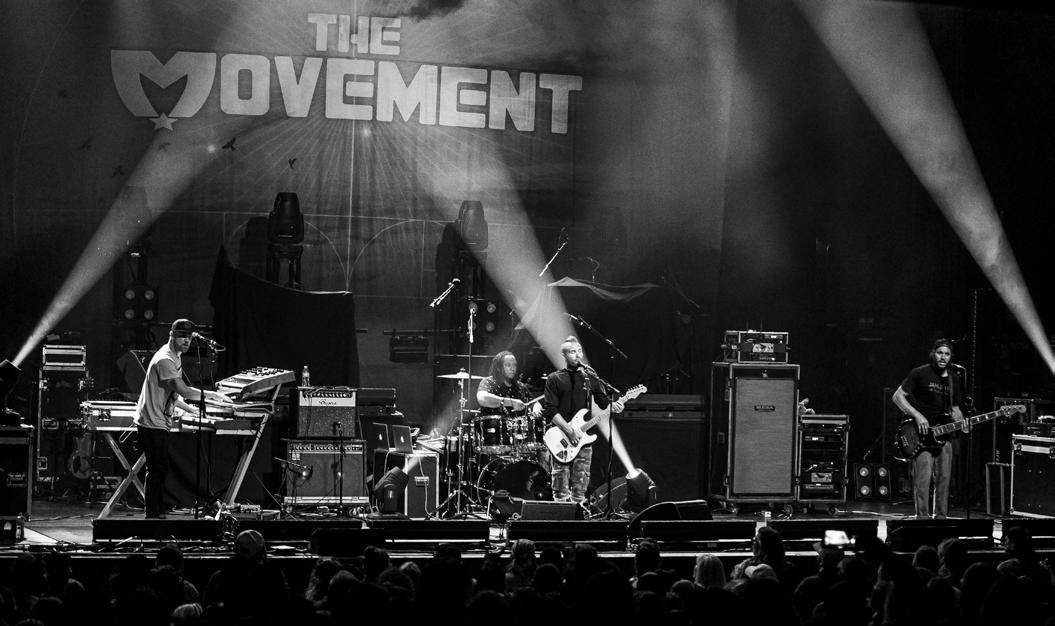
INTERVIEW THE MOVEMENT 137
© JEFF PREIS
a song that you love, and I love that song so much, I love Queen too, they’re one of my all-time favourite bands! It’s interesting how those little things can slip in. I will listen to the tune again now!
Yes, try to sing along, it really fits. Generally, the album is very diverse, so many different styles on there. One song that really caught me off guard, though, is Chains. Who brought this in?
It was my idea. I’m not really good at making beats on my computer, but occasionally I try, and usually that means grabbing samples and drum loops from Splice or somewhere else and throwing them on there, finding different bass lines, rearranging things… Plus, I’ve always been a really big fan of jungle music, one of my favourite albums in the late nineties was this Marley record that remixed his older recordings with jungle music. I can’t find it anywhere now! Since then I always had a special place for jungle music, and always wanted to do a song like that. We actually had one on Golden, the title track tried that formula a little bit, but it was on the more real live drum side, so it didn’t hit as hard. So, this one was just like a more hard-hitting thing, I was just in a mood the day I wrote the lyrics, one of those Rage Against The Machine kind of days, you know, and it just turned out to be one of my favourite songs! We didn’t really think to put it on the record, but then I was like, “Why not?” I wonder if stuff like that could turn people off, but I think there is no other way for us, we are not trying to write a certain kind of music, it’s just movement.
I think it doesn’t turn people off. The worst that could happen is that people skip the track, but other people might press replay because they like it, so… I think you have to dare sometimes. As I said, it surprised me! You have all these nice songs until track seven, Worth Fighting For, and then suddenly… boom!
It was Matt’s idea to stick it right in the middle, like a wake-up call (laughs).
A perfect position. The last song is beautifully positioned as well because it leaves you with a feeling of… I don’t know. It’s just a very touching song. In what mood was that written?
On the last three records, we did the last song in an acoustic style, so it developed like that, getting better and better. Originally, the mood of the lyrics were more a “fuck you” to people who are telling me what to do all the time, and then the chorus was different. I was in the mood of “I just need to live my own life, I don’t need to listen to you, you don’t know me!”, but the other line was different, it was more a mean kind of song, telling people to back off. I kind of re-arranged the lyrics to [sound] not so hostile and make it more about an internal struggle. Like, if people are doubting me, then I can tell them “You don’t know me, you don’t know what I can do!” A lot of these songs have a lot to do with being an alcoholic, going through recovery and all that, making a lot of progress too, learning a lot. But there’s been some mistakes, so a lot of the material, especially on the last record, is about redemption, about trying to find the way to live your own life. I try to not make it specifically about drug addiction or alcoholism or anything like that, I try to make it a little more inclusive so that anyone can feel it in their own way.
Which instrument is used on that one, somewhere in the middle? Is it on the solo part?
Yes, it doesn’t sound like anything I know… like a traditional string instrument or something.
We definitely have some strings on there, there is a violin at the end and maybe some cello, but that was done by somebody else, outside of the studio, I wasn’t there when that was recorded. He did a bunch of layers of violin over the song, and for the most part everything else is different patches on the keyboard.
And then there is a poem, some words spoken at the end… who is that and what is it?
138 INTERVIEW THE MOVEMENT
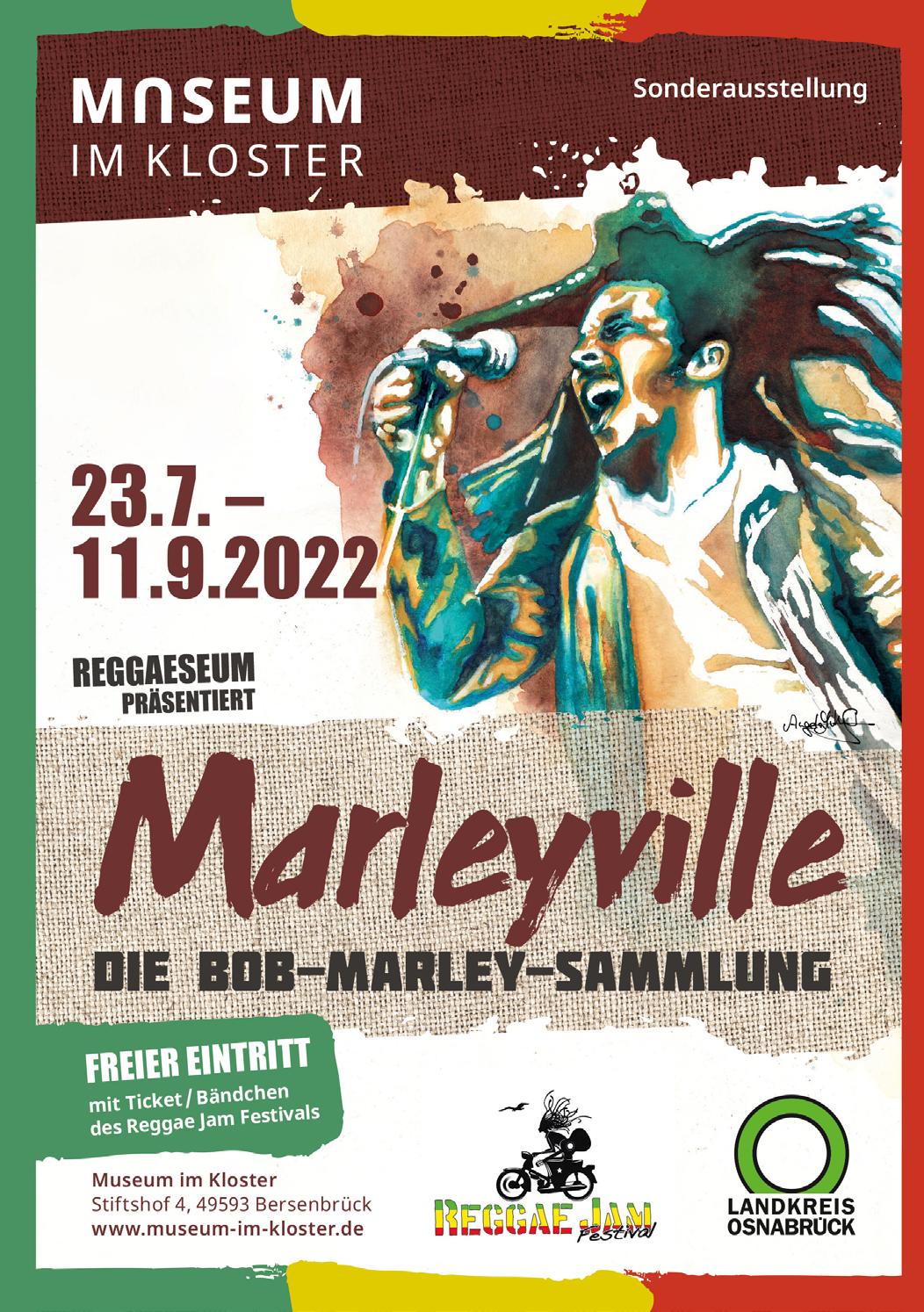
We had this song almost finished, and there was this end part which is really long. We wanted to lighten the workload because Matt, our keyboarder, was literally doing all the engineering, the production, the mixing and everything for this record, and it was a lot of work. I was like “Can we please give as much of this to other people as possible to speed this up, because it’s taking forever?” (laughs) A guy called Johnny Cosmic did our last record, and we were out in California close to his studio and ended up going there, saying “Here, can you take these two songs?” I gave him On And On and You Don’t Know Me, and he did the first one very quickly, but the other one took a while. I went home and he called me and said “Hey, for this section I was thinking you could do a poem! Just record it on your phone and text it to me.” And I was thinking like, ‘I’m done with writing for this record, I don’t wanna write a poem!’
I was reading this book, fantasy epic stuff, by an author called Tad Williams. He is said to have inspired Martin to write Game Of Thrones. Anyway, Williams wrote Memory, Sorrow and Thorn, and I read these books and got into him. There’s a lot of poems in there, nerdy elves stuff, so that’s what I was reading and when I was looking for a poem, I was like ‘I’m gonna use one of the poems of this book!’ because it’s really vague and nobody is going to know what it means, cause there are a lot of weird madeup names and stuff and nobody would get it because the voice would be distorted…
So, it’s your voice?
Yes. We used that, and about a month later the song was getting close to finished, and I don’t remember who it was, maybe Matt, who said “I really think you should write a poem! We have this great song and then here at the end you are just talking about elves and elf cities… it makes no fucking sense at all!” (laughs), and that’s the last thing on the record! And I said “I know, you’re right, plus I don’t even have permission to use it or
anything”, so I sat down and I wrote a new poem, so that’s on there now.
Very nice, a beautiful ending of a great album. I know we didn’t cover all of the songs, but I think it’s enough to give people an idea. Is there any one that you want to mention? Always With Me is the song that means the most to me, that’s why it’s the title of the record, too. It kind of sums up the growth from the last record to this one, and it’s really about having the feeling of… not necessarily God, but a spirit of the universe or some higher power, some purpose inside of you, that is always a part of you. You’ll never feel alone if you have that kind of knowledge. And as this record progressed, I’ve gotten more and more into meditation, trying to do mindfulness meditation, accepting life as it is and really trying to be at peace. I think the words in that song really are the starting of point of what I want anybody listening to get when they start off the record, that kind of feeling. I know that it doesn’t necessarily carry throughout the entire record, because then I write a party song and a love song and a song where I’m pissed off or whatever, but I think the overarching theme of the record is best described in that first track.
Is there anything you wish to add to our conversation?
I really appreciate you taking the time to do this… anything past playing in South Carolina was just a bonus for us. We’ve been lucky enough to be able to do this for almost 20 years. It’s crazy, time has really flown by, even being interviewed like this is just a blessing, another cool thing that has come of us doing this thing. Every day really is a blessing, and I appreciate you!
Thank you! We also appreciate you and your music, keep it coming. It’s a nice vibe in this craziness we are living in, a nice vibe. Have a great tour and all the best for the release!
140 INTERVIEW THE MOVEMENT
THE MOVEMENT – ALWAYS WITH ME R4RE Records

“If, when you close your eyes, you become one with everything under the sun… I will never be alone, you are always with me.” (Always With Me)
Lonesomeness is tough. Social isolation demonstrably leads to depression and health problems, so it should be acknowledged and dealt with. One way to do this is to spend quality time with people, another to find a spiritual companion inside of you, whether you call it God or universal energy or whatever. That’s probably what The Movement had in mind when they chose to call their new album Always With Me, after the first song on the release. The Movement, that’s Josh Swain, Matt Goodwin, Jason Schmidt and Gary Jackson, a band that’s been around for almost 20 years and released seven studio albums.
Number eight is a feel-good affair, created for day cruises on the highway, lazy summer evenings and party nights. While it has a recognisable The Movement sound, it’s also diversified enough to not let the 15 tracks appear repetitive. Thus, after the bright opener Always With Me (No Worry being quite similar), you’ll get a touch of Dubstep in Afraid, some Hip Hop/Trap/ Pop fusion vibes in Beg Borrow & Steal as well as High Roller, Rock in Worth Fighting For and hardcore Jungle in Chainz (not in Jungle, ironically).
Further variety is brought in with the exciting features. Slightly Stoopid joins Josh on Sounds Of Summer, and Iration steps in for the laid-back On & On, a sweet love testimonial. Speaking of sweet: Hirie contributes some darling lines to Actor. Much tougher (and faster) in riddim and vocal delivery, Love To Burn features Soom T, and hell can this girl spit bars!
A peculiar but very danceable mix of Gospel and Dancehall, Mountain is definitely one of my favourites. Former Gladiators singer Clinton Fearon throws his impressive vocals in, and the basic message is to never stop moving.
Josh’s ingenious use of words and metaphors in the lyrics is evident in Elephant, too: “Let them come and tear me down, I got deep roots planted in this ground, they can try to dig me out, I am the forest, I am a cloud, I am the thunder, I’m the champion sound…” Some linguistic magic right here!
U Don’t Know Me now… not only is it perfectly positioned as the finale, it also deserves a closer look because it is soooo damn special - the sheer energy of the piece is incredible. There are so many layers to discover that you’ll need several listening rounds to get them all, both on the textual, the vocal and the arrangement level. For one thing, the backing is just on point (chapeau to John Gray and Josh!). Secondly, the instruments are impeccably played, building up the exact right intensity at the exact right places. Finally, the lyrics… “You don’t know me or what I can do” is a phrase everyone can relate to, as we’ve all been judged or disparaged by people who have no idea of what we’ve been through, why we react or behave a certain way.
Wow, what a ride. Always With Me is an album that showcases the immense creativity out there, the variety of routes Reggae has taken in this world, and the beauty of that fact. Thank you, The Movement, for another great companion on this journey called life!
by Gardy Stein
ALBUM REVIEW THE MOVEMENT 141
/ Ineffable Records - July 29, 2022
INTERVIEW
TANYA STEPHENS
MUSICAL HEALING
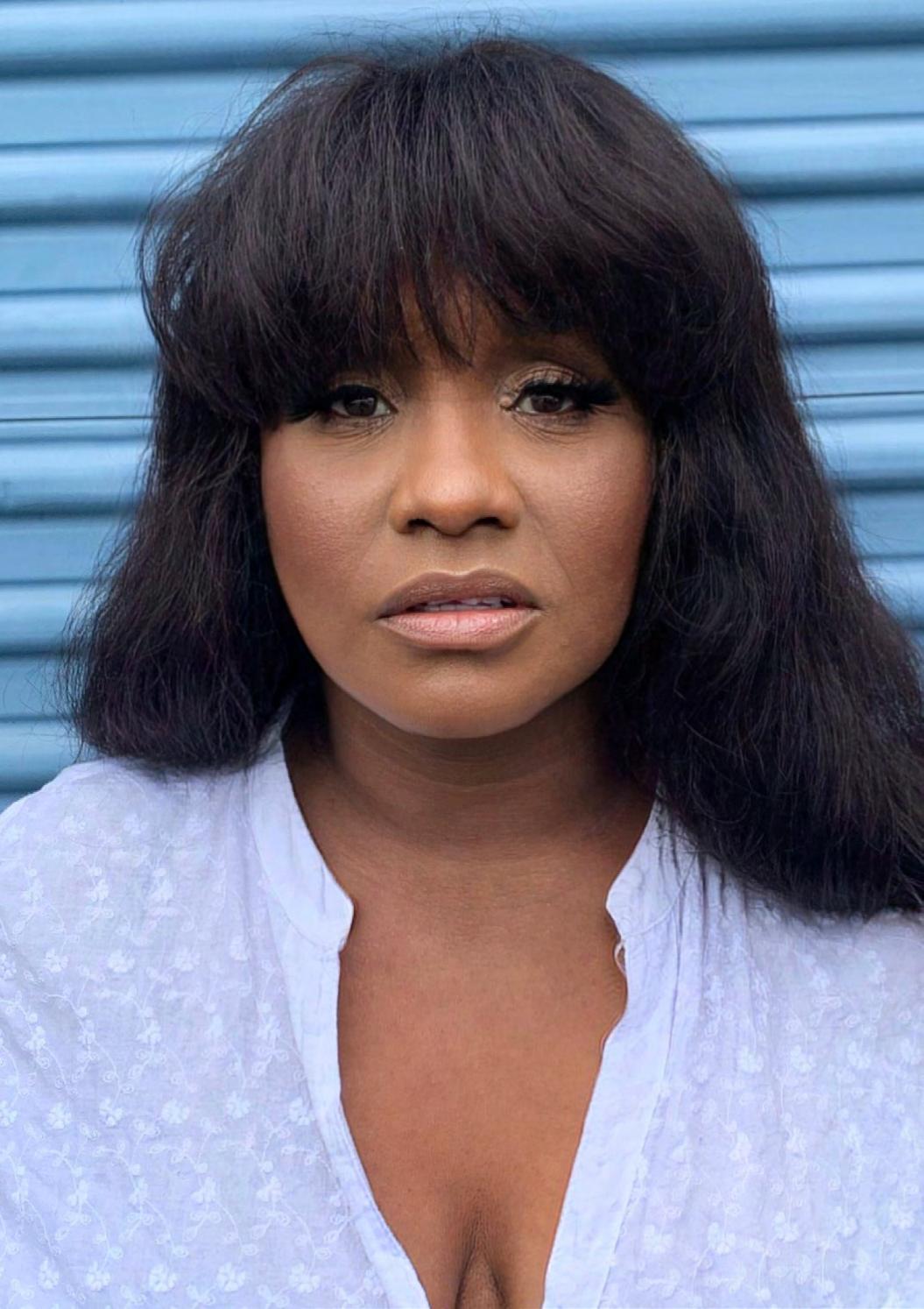
MENTAL HEALTH CARE
BY URSULA „MUNCHY“ MÜNCH
More than eight years after her last album singer and lyricist Tanya Stephens is ready to present another full-length record this summer - her “favourite album” thus far, as she affirms. Turning the negative effects of depression as a result of lockdown and quarantine into a positive source of inspiration and also actual possibilities, she created Some Kinda Madness, a broad variety of music and sounds, emotions and thoughts that touched our author Munchy deeply. She spoke to Tanya Stephens about the production, the musicians and her family. She also spoke about turning 50 next year, and about independence, freedom and rights.

How do you feel about your
new record?
I’m actually excited and as we get more into promotion, I get more excited because sharing what’s on it really means a lot to me. Watching people react to the songs when they listen to them feels good, because we put a lot of work into it. I am looking forward to sharing.
How long have you been working on the album?
We have spent all of this quarantine and lockdown time. All of the last two to three years went into making it.
How was producing an album during these challenging times?
It worked out fine. It was actually the best time to do it. Because obviously we were available. The time that I would have normally been on the road, I was home. And Tads was available, too. It made it all much easier for us to work.
You mentioned Tads, Tad Dawkins Jr., who is the producer of the album. Your work, your lyrics are very personal. How important is the producer and the connection you have with that person?
It is really important to connect with somebody who understands or is open to understanding and I find that Jr. Tads really is. Because I am very peculiar. You say I’m personal, I am peculiar. I want things just the way I hear them in my head. Because they are like my children. My thoughts, my expressions are very dear to me. They are intimate and I want them to come out correctly, so that I don’t get misunderstood, and he allows it. When we’re in the studio working, there is no ego, there is no boss, it’s just a bunch of people, myself, the producer, musicians. We come together and try to find the best way to bring the idea to life. We work at it until we get it right. Some tracks were laid maybe twice or three times until we got the right expression of the idea
INTERVIEW TANYA STEPHENS 143

144 INTERVIEW TANYA STEPHENS
in my head. And then sometimes he would have an idea that if a sound wasn’t very specific, then he’d say “What do you think about this?”. He has added stuff that I never thought of like steel pans, flutes, violin…
Prior to this album, except for my Swedish release, I don’t think I have had so many different sounds in the production.
Speaking of sounds, what will we be hearing on the album?
Everything from acoustic to hardcore dancehall. I don’t believe in separating the music. I am an artist and I express my creativity in whatever genre, whatever form accommodates it the best. I don’t separate, I don’t segregate, I don’t believe in it in any facet of life. My music encompasses everything I hear and feel inspired by. Acoustic will always be my thing, because the more sensitive, sensual sounds of the guitar really bring out emotions from deep inside of me. Of course, there is roots rreggae because that is my foundation and it will never go anywhere. The hardcore dancehall that is still me. So I am going to express me with every kind of sound we could cram. We couldn’t cram everything, but we did our best to cram as much as we could. 20 tracks on one album! And we tried to get variety.
So it’s going to be 20 tracks?
Boy, that’s the toughest process ever! We did about forty-odd tracks in total and we both have different favourites. Every single song is one I love. There is no filler, there is nothing I would call a waste-song we put in to make up numbers. In fact, we could have made the album with 15, 16, 17 tracks, but there are some songs I just felt like they have to go on. Tads had his have-to-go-on and I had my have-to-go-on and we put them together and it’s 20. The album is titled Some Kinda Madness. We were playing with other names before but really Some Kinda Madness is the most appropriate title because putting all of what we did together results in a collection of some kind of madness, I think.
What was the madness about this record?
To begin with we created the album in a time of madness (laughs). A time of house arrest, when we were all getting depressed and that alone inspired some kind of madness. I think the formal side of music tries to put people in boxes. It says “ This one is a roots artist ” and “ That one is a lovers rock artist ”, “ That one is a badman artist ” – I take all of these things and I put them together in an album. I believe that to some parts of the audience it would be madness but when you hear the things together, you realise it’s just a complete individual. Too many of us have been labelled mad because we dare to be unique and complete individuals and I celebrate that. I don’t care what people think. My “some kinda madness” is actually displayed in full colour and celebrated by me and introduced with pride. I hope that it connects with the kind of madness that other people have.
Who helped you create this madness? What musicians played on the record? The lucky thing for me making this record is that so many people were home because of the period that we are going through. I really had a good time being able to find people that I normally would not have been able to find. Mr Glen Browne is on the album, Kirk “Kirkledove” Bennett is on the album playing drums. Danny Bassie is on the album and guitarists Mitchum Khan and Monty Lamont Savory . There are so many people, it’s hard to list. I don’t like to list because I forget people and it really sounds bad because every single solitary musician on my work is very important to me, that’s why I invited them in the first place. We were able to get people like Steven Stanley almost exclusively to mix a lot of the tracks. As well as I have to big up Sherieta Lewis , who put on a lot of the background vocals. She is an amazing artist, people, if you haven’t heard her before, check her out! She’s bad!
INTERVIEW TANYA STEPHENS 145
How was the vibe in the studio actually like?
Studio is vibes! We connect like family because nobody on this is a stranger to me. We have worked together before, whether in recording or live. So it was really comfortable and I only work with people I am comfortable with. I don’t place myself in uncomfortable situations. Being in the studio really was therapy. You know, the first part of 2020 when I had to cancel my tours and I had to go home and stay home, that was really depressing. When I started going to the studio and reconnecting with family – my music family is really my main family, because I spent the majority of my adult life in music – it really was a big relief. Just to get out of the house and go work and be a complete human again, do things which are normal to me. That brought me up out of a deep. I was really deep some of the time. And it brought me up out of it.
You mentioned family and your real family, your daughter is on the record as well. Please tell me a bit about the history of you making music for and with your daughter, and your relationship?
Yes, my daughter is on the record. We have a track together called Damaged. It really means a lot to me because it sums up our relationship. We don’t pretend to be perfect people. We don’t try to live up to any stereotype of any public figure. I have one child, this one daughter. Going through all the places with her… I remember one time living in Sweden, before she moved to Sweden with me, she was living in Jamaica and I was in the studio working on the album Sintoxicated. I went to the studio to work and I just couldn’t do anything because I felt lethargic, I was very homesick, I missed my daughter. I really wanted to be home. My producer said “Well, since you can’t work, you wanna talk?” and I was like “Sure” and I told him I was missing my daughter. He said “Since you miss your daughter, you want to make a song about that?” and I think that was the first time I made a song directly speaking to her and even mentioning her name saying
“I want to be home, where Kelly is”. Since then every phase of our relationship I have actually put in song. When she reached teen age, that was really rrrrrrough. I can’t pretend I’m a perfect mother. I don’t get a manual. I don’t know how to do this thing. I’m just trying my best. And it was rough sometimes, when she felt like “I’m big now and I don’t have to abide by your rules, lady, I’m a sovereign being”. That didn’t work because obviously it’s my job to protect her and sometimes it felt like she was sabotaging my efforts to protect her. So that, I put in a song, too. So we’ve had this relationship and we’ve always talked. I encourage openness and expression and I don’t have a problem with words like some people do, so we speak openly. If you sit with us, you will hear her using curses and stuff, which people call curses, we just call it communication, because it expresses how she feels at the moment and I am comfortable with that. Through all of that we got to the point now, where we’re comfortable. We’re just two adults chilling together, comfortable, we burn a spliff and we talk about life. We look at the environment around us and we realise, we’re lucky. We’re very lucky! To have found each other in this space that is so damaged, we found something that is so perfect because our relationship is perfect for us. And that’s what we sum up on this record.
And it was really an odd way to find out that she wants to sing. Because I know that she can sing. I didn’t know exactly what she sounded like until I heard her in the studio. But I have heard her singing in the shower, so I heard that she has the basic voice. I never forced her to try and sing. I don’t feel like because I sing, she has to. She’s a professional make-up artist. And then she came to the studio with me at Tad’s and she heard a riddim and said “I’m kinda hearing something on this. You think you would let me sing on it?” and I was like “Sure, why not?”. She did and boy, I was blown away! “Ratid! I didn’t know you had this!” Since then, over a year and odd, she has really blossomed
146 INTERVIEW TANYA STEPHENS

and she writes. I didn’t know, she writes. And I am actually impressed. I’m not easily impressed either. It doesn’t matter that she is my daughter. I’m not a biased person. When I listen to it, I have even asked her to help me with some of my writing when I get stuck. Now I’m lazy because I realise “You can write?! Come pay me back for these nine months in my belly” (laughs). It’s actually cool and she has been involved in this process, too, putting on some background vocals on some of my songs, putting on ad-libs and stuff. She is really creative with that, even putting on some kids voices. I’ve enjoyed this process a lot. Yes, she is singing and her name is Kelly Shane and she is on the album on a track called Damaged.

The release is set for July 2nd. It’s going to be your 49th birthday, which marks the start of your 50th year on your earth. Tell me a bit how you feel about those numbers and this special day?
Man, I love it. It kind of makes me a bit annoyed when I have to explain to people that I actually do love my age, because nobody believes. When I say “I’m happy getting older”, I am comfortable, I am very excited to turn 50. To me this is a monumental milestone. Many of my loved ones didn’t make it to 50. I lost some of my friends. I am at the age now, I am going to my friends’ funerals. It is not lost on me that I am fortunate to still be here, you know, because I want to be here and I am celebrating that. So at the dawn of my birthday, I’ll begin living as a 50 year old because this is my goal for the last few years. I had to get to 50 and I am declaring 50 as my complete independence. I’m free from every shackle, free from everything that ever bound me, free from me. It is my year to get out of my own way, to not hang on to many of the pre-sets that I work with. Even as open as I am I still have a few hang-ups and I want to let go of everything. So the 49th birthday marks my journey into
148 INTERVIEW TANYA STEPHENS
me, painstakingly and meticulously looking for things that are relicts and remnants from the past and throwing them out. And it is not that I am unhappy with me, I’m not. I really am comfortable and happy with me. But I feel like there are things that should be thrown out, things I hang on to from birth, all of the traditions, things that passed down from my grandmother. I can love my grandmother without becoming her. I don’t have to be her. I don’t need any kind of material tie or traditional tie. I’m tied to them with love and that’s enough.
Was it a process to reach a point in life, where you can say “I am 50 and that’s just it. I free myself from other people’s opinions”? What did it take to get to that state of mind?
Definitely, it was a process. I think it began at birth, as far back as I can remember. I don’t like the box. That’s how I have always been. I don’t like boxes, I don’t like to put people in them and I don’t want anybody to
put me in any. I don’t feel like I have to live within the confines of my skin colour, my origin geographically, the confines of my social upbringing by my family. I’ve always rebelled against every bit of that. I don’t think people should tell me who should be my friends. It’s my life, my feelings, my emotion. I know how comfortable or how happy I feel. It’s my me. I decide how I live. And I have always been like that on one level or another. Of course, when I was a child I had to abide by rules of my household. But I broke them, as much of them as I could. Of course, I kept getting in trouble. School was the same thing, it’s on my report cards: “Too argumentative, she talks too much”. But it was never wasted talk. I challenge things which don’t make any sense. I feel like, if it doesn’t make sense we should discard it or we should improve or fix it. So this process which started as far back as I can remember culminates at 50 and here I am!
On your social media, which I am personally a huge fan and passionate follower of, you’re also always very open about things like your internet provider, the vaccine,… all the issues you want to talk about, you just talk about it. But of course, on the internet a lot of people talk also and talk back, sometimes not in a very pleasant way. How do you feel about that? Is it really “I don’t care and it doesn’t hurt me” because that’s the internet and people you don’t know, or does it still hurt you or make you angry? Yes, I get a lot of push back. I express everything, well, everything that’s not intimate or personal. Just to be clear, I don’t want anybody to think that I’m trying to use my platform to dictate anything to anybody. It’s the exact opposite. I want to object to all dictatorship. I believe in body and mind autonomy and the sovereignty of each individual, and I really don’t believe in intrusions and stuff like that. I share my thoughts on my social media and of course people come there with all different kind of responses including very rude, very aggressive, even sometimes violent responses. But the fact

INTERVIEW TANYA STEPHENS 149
is that none of that can alter my thought process. My thoughts belong to me. Nobody outside of me has any franchise in me at all. So if people hear me express an opinion that they don’t like and it makes them not want to listen to my music anymore, that is tragic – on their part. Because for you to need to be in agreement with everything an artist says to be able to appreciate the music, that’s really sad. I’ve never demanded anything of the artists I listen to. I listen to their music and understand that they’re not a part of my life and I am not a part of theirs. I share some very strong opinions in my music, too. I understand that if it’s not something that you can relate to or if it’s something that goes against your principals, then of course discard it. Don’t pick it up, it’s not for you. Everything is not for everybody. We need to stop feeling like we need to be included
and this is the problem I’m having on social media with people: people see something I say, that they don’t like, that fundamentally goes against what they believe in, and they feel compelled to stop and argue with me. It’s not something that’s doing anything to them at all. I’m not stealing from them, I’m not encroaching on their rights and liberties. The fact that they feel compelled to stop and try to change my mind is indicative of a sadder thing that’s happening in society. That we don’t think we are all equals. That we cannot co-exist peacefully. That we cannot disagree in a civil manner. I’m not saying only people who agree with me should respond, no. I welcome people who disagree with me. Because the only way I can possibly learn or correct something that I think is right which is actually wrong, is if somebody disagrees with me. So I need people to disagree with me but not in certain ways… oh Munchy, they said some things… people offer me gunshots (laughs)! I’m like “Really, dude?!? Gunshots?”. Because I said I don’t agree with you or the politician that you’re a minion of? I mean, they’re politicians, they’re elected public officials, public servants. We are their bosses, we have the right to say “Dude, this doesn’t work for some of us. You have to find the middle. You have to find some kind of a common ground between the people, in the best interest of the people.” And if a large enough group of people says “This thing doesn’t work for us”, you have to stop and be mindful. We have a responsibility and an obligation to speak. And it is sad, when I look at how the world is now, that when people speak they get beat up. Jamaica has this little hypocrisy I don’t celebrate. We pretend to be out of many one people. But we segregate, we are very segregated. When I say things like this, they tell me I try to make Jamaica look bad. No, I’m trying to make Jamaica look at itself and fix the problems. For years and years we have the hypocrisy of Bob Marley as our icon and weed being illegal. I never understood it. This is madness! You’re using Bob Marley to sell Jamaica and you’re appeal-

150 INTERVIEW TANYA STEPHENS
ing to the people like him, who almost all smoke marijuana and they come to Jamaica thinking it’s free and you can smoke, and they smoke and they get locked up. It was madness. Finally, because the rest of the world moved in that direction, now we are starting to follow. We have all of these little hypocrisies, when we say we want freedom of speech but every time somebody speaks freely, we beat them up. You can’t say you want freedom of speech and beat up somebody you disagree with. Freedom of speech is just that: freedom of speech. So it means that you have to respect every single idea even if you disagree with it, but you have to disagree respectfully. You can’t just say “Shut up!”. And then all of these regulations that are coming in now. How many times I have been banned, channel-banned, blocked, restricted, I have less permissions on my social media than regular people because I share my opinions. Even when I share things which are copied from government websites. I had stuff removed which I posted from the WHO, NIH, CDC, FDA, from government bodies. I copied texts and made them into memes and posted them, and they were removed for misinformation. These are the things which are happening, which we are allowing to happen. This place where we’re at in our evolution or lack thereof where we cannot abide with anything that doesn’t celebrate or cheer us. That we feel like every single human has to walk in line with us, for us to be able to share space. It is crazy but it is also extremely dangerous. I don’t feel no kind of threat when I see people coming on to me, in fact I take it as an opportunity to show a different side of the reasoning. Sometimes, yeah, I answer them with aggression, sometimes, because if they persist and they feel like they can beat me up, me haffi mek dem know seh “Man ah badman! Me nuh fraid ah unnu.”. I’m not afraid of internet people, come talk to me in front of my face like a man, if you have the balls for it. But you don’t get to come on my Instagram and tell me to shut up. Scroll to somebody else! There are many artists who
are sharing sexy pictures and other things, jokes and laughter, go follow them. You don’t have to follow me. And if you come here, engage in civil, peaceful, respectful conversation or move and come off my thing. Me nuh beg no friend.

Is there a limit to freedom of speech?
With freedom comes responsibilities, obviously. But if we work under the premise that my freedoms or my rights have to end where your rights begin, then we don’t have a problem. That’s the only rule we need to actually observe. The things I talk about are not encroachments on anybody else. I am saying “Do not do this to me. I don’t want that.” All I’m doing is rejecting. I’m saying “I’m fine with you doing that to yourself. But none for me, thank you.” This is like me saying “No Sir, I don’t like you and I don’t
INTERVIEW TANYA STEPHENS 151
want to engage in coitus with you.” And he is still coming with the penis. This is rape culture. We have made it systemic. We have actually created an entire social structure centred around rape culture that we no longer give each other the right to reject us. It is madness! I don’t have the right to enforce my opinions on anybody – and I don’t want it. What kind of boring world that would be if we were all the same. This is how the world becomes an interesting and dynamic place for us to live in. Because we’re different! That is what makes our relationship so rich and fruitful because each one of us has something unique to bring to the table.
You mentioned rape culture. You are very active in women’s rights and the first single you released from the album entitled Diamonds In The Sun that you did with Diana King and Cedella Marley is also about that. How did the link with these two women and the single come about?
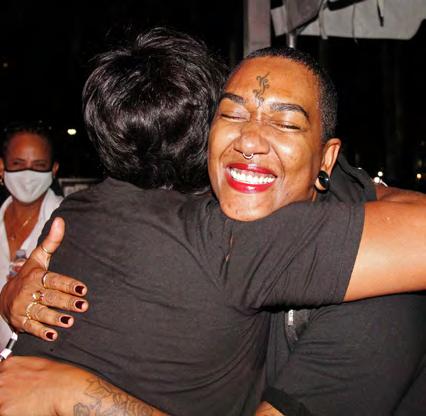

This song isn’t even a song for me, it’s just where I am in my head. I think by now everybody who knows of me and my music, knows I am survivor of sexual violence because I am not quiet about it. I am a two-time survivor of sexual violence. Even though I don’t live my life as a victim and I do not live my life centred around the
fact that I experienced that, it influences everything that I do. It makes me paranoid, it makes me sometimes antisocial, weary of people. And I accept that. But it also forces me to express it. The moment I started talking about it, I just can’t stop. In speaking about it I have connected with Diana King, who also has had similar experiences. We have discussed this in many occasions. We discussed also making music together and we really wanted to talk about this in our music. When I started writing this song I was in discussion with Cedella’s personal assistant. I introduced her to the song. She is somebody who mothers and mentors and is a really warm soul and good therapist. We were talking and she said “Cedella wants to know if you let her sing some background vocals on the album.” and I’m like “Background vocals?!? If you come on the album you have to sing lead and this would be the perfect song.” I only knew Cedella in passing but over the last few years I started looking more closely at her mother and from my feminist perspective I started noticing Cedella. She does a lot of work creating space for females, especially what she has done with the Reggae Girlz. It’s more than just sports. She has invested in them her time, money, her efforts. She had vision and she is using it to create an environment for
DIAMONDS IN THE SUN [SINGLE]
152 INTERVIEW TANYA STEPHENS
TANYA STEPHENS & DIANA KING @ BEST OF THE BEST 2021
© STEVE JAMES
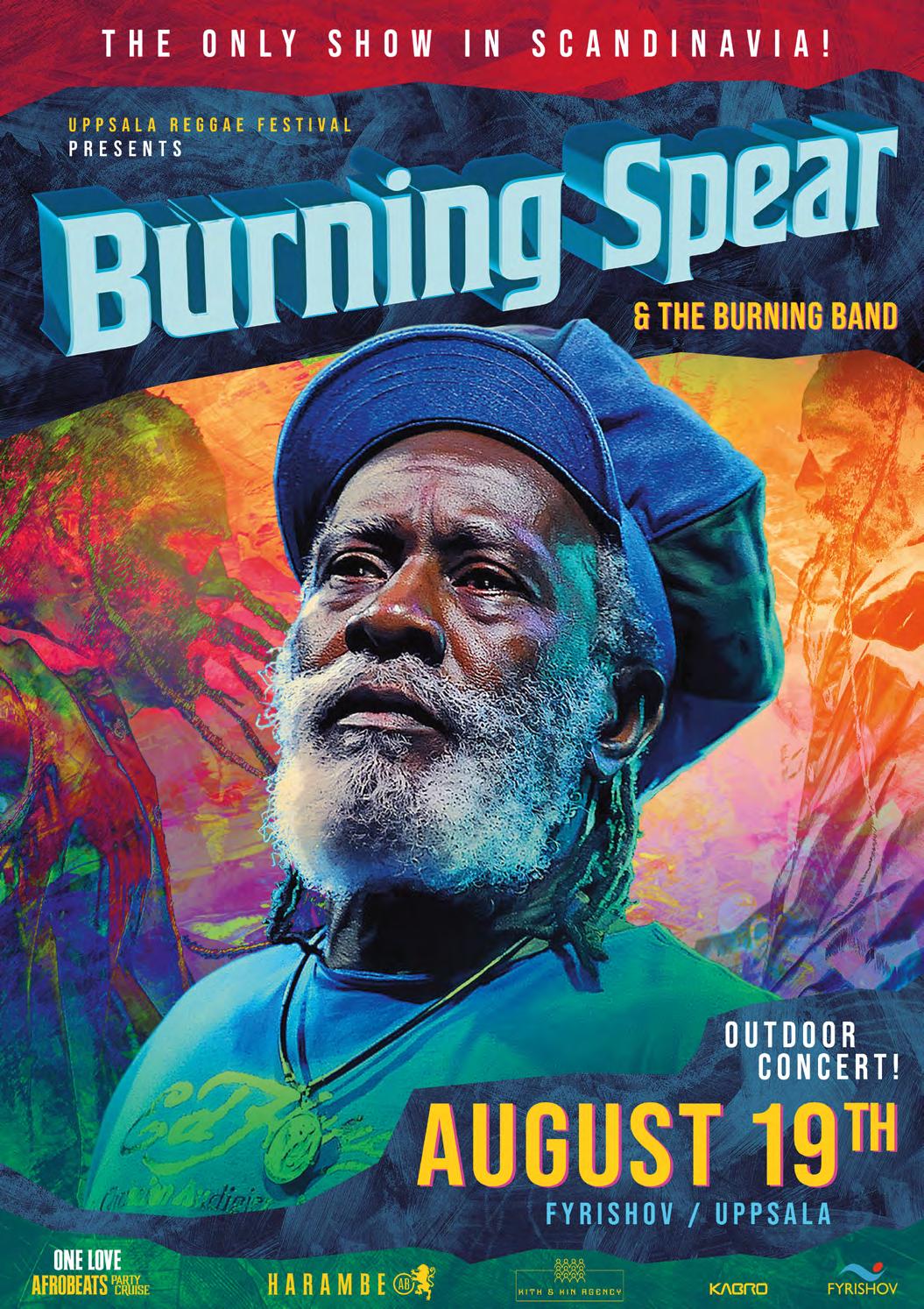
females, especially disenfranchised females. I realised she’s doing all that stuff but she just doesn’t take any praise. She’s not saying “Look, I am charitable!” That is what made me feel like she belonged on this. She’s been helping people with all different kind of hurt to make sense of their lives and get back on track. And then Diana is just a powerhouse of everything. She has defied logic, because it’s not logical that a Jamaican says and does the kind of things that she does. When she gets up as a Jamaican woman and says “I identify as male and I’m gonna perform top surgery”. Things like this make me more connected to her – and now I have to get used to saying “him”. Just being able to defy what is imposed on us as logic but is really a set of biases being handed down to us through generations. She has broken all of that glass just by standing up and saying “I am”. And there is no way under the sun we could possibly not connect and this is how this record came to be.
Every time I listen to it, I get goosebumps and I feel like it’s perfectly done. For me it’s not a record, it’s a testimony, a call to action, a reassuring, it’s speaking to the child in me saying “Your life is not over! This is not the end of you, this is the beginning of you.” This is what we want to reassure.
It goes to just being a humanist. I grew up in Jamaica. So first let me be clear that there was a time when I too was taught and raised to think that to be normal or acceptable, you need to behave in a particular way. That gave me a lot of cognitive dissonance but I went along with that for quite a while. Like most Jamaicans who eventually break away and say “This is foolishness”. There was a time when I almost defended the Jamaican stands, which is that “normal” is this one

With Diana being “them” and not “she” anymore and also beyond that you have always been very active in the rights of the LGBTQ community. What motivated that?
154 INTERVIEW TANYA STEPHENS
specific thing. It couldn’t sit with my adult self. It made no sense. At one point in my late teens I actually saw a gay man being beat up on the street. It didn’t matter what I believed in then, seeing somebody being beaten for no reason that really messed with my head. It was painful but I had to uproot that upbringing, the thought process that said “normal” is a specific way. Plus, I have loved ones, both family and friends, that identify openly as LGBTQ. You can’t tell me that a person that I love so much and is one of the very few people that I love this closely, I have to now divorce myself from them, because of something that has no bearing on me at all. I wasn’t always at this point and in all fairness and for transparency and clarity: there was a time when I too used the words. I wasn’t antigay but when a soundman came to me who wanted a dubplate and asked me to say “battybwoy” and so forth, I did that for years without even thinking. There was no connection to LGBTQ in that word for me. It was just a curse word. I did that and it’s embarrassing but it’s also humbling and maturing. I am grateful and relieved that I am and have been for quite a while, for the last 15 years at least, I just stood up and said “Hey, that I’m not doing any of that and I don’t think it makes sense.” I’m not a hero, I am somebody who likes to think and think critically, and if something doesn’t make sense I throw it out and change that. This is where I am now proudly and resolutely. For those who haven’t got here yet, I don’t beat them up, because I know growing up with this kind of teaching, if this is all you know from your mother, your father, your grandparents, your church circle and your school said it, then you think it is reality. So it takes some work to get rid of all of that. We have to be more gentle with each other, including the LGBTQ community. They need to be more understanding of people’s backgrounds.
What other topics are on the album?
I take on division: classism, racism, departure from norm, coming out of the box.
These are things which are always near and dear to me. Everything that opposes individuality, freedom and rights. I like to hold up a mirror to people and show them themselves. Just the way I stand in front of my mirror, too. I have daily introspections and I invite people to do the same.
song
me about this feature!
I have known Big Youth’s music since as far back as I can remember. He fascinates me: his personality, the way he acts. He’s never been in any box and that means a lot to me. He would come out in a mink suit in the middle of summer in Jamaica, just stylish and don’t look silly. “Look, I am a fashion icon, I dress to express!” He’s funny, he’s full of jokes. I saw him perform only once in London. His movements, he is so sensual, he is different and I love him. When I started working on this album and I did this song I told Jr. Tads I wanted Big Youth on it. He laughed because it was the furthest thing from what he would expect as a collaboration. But he called him and he came in and oh my God he is the warmest, warmest person. I couldn’t stop hugging him. I think he might think I’m a little bit of a creep because every time I see him I put my arms around his waist and squeeze him so tight. I really love him (laughs)! Being able to do a record with him, the little girl inside of me was just so happy. This song is one of my favourites.
I am very much looking forward to hearing this one and the other 19 songs on July 2nd when Some Kinda Madness drops!
I present it as a body of work that represents me where I am right now and I invite people to check it out. I don’t obligate anybody who likes me to like the album. Listen to it and if you like it, it’s great. And if you don’t, it’s still love. But this is where I am, this is the music I have made for now and hope you all enjoy it!
INTERVIEW TANYA STEPHENS 155
One
I am particularly looking forward to hearing is a combination you did with someone who is very special to you: Big Youth. Tell
INTERVIEW BURNING SPEAR
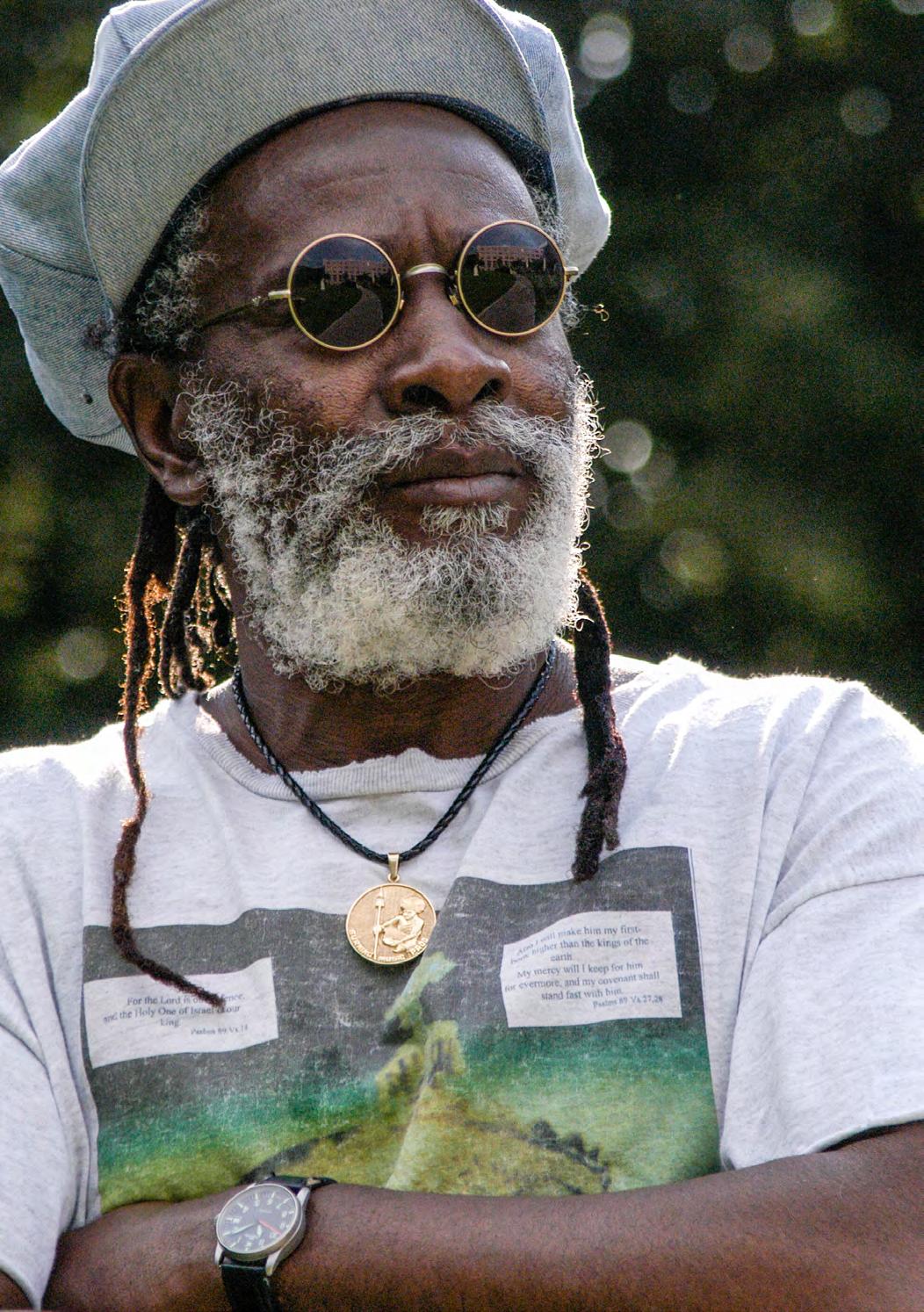
RISES AGAIN!
BACK ON STAGE
BY GERRY MCMAHON PHOTOS BY JULIAN SCHMIDT
The decision of Burning Spear to return to the stage is the best news that the reggae community has had in a long time. After a long time in the musical wilderness – this ‘man from up in the hills’ who has lived in Queens, New York for many years - Winston Rodney (aka Burning Spear), has recently been coaxed out of retirement by his sister-inlaw Marcie and his attorney. The end result is that he is now scheduled to undertake a slew of live performances across North America and Europe, including headlining festivals in the Netherlands, France and the Rototom Sunsplash in Spain.
Back in January, Spear promised via his Facebook page “10 concerts in 10 cities”. However, this promise has now mushroomed into a full-blown tour, with a host of concerts including the UK, France, Spain, Germany, The Netherlands and Sweden. He has also committed to performing at the Welcome to Jamrock Reggae Cruise in December, with Shabba Ranks and Damian Marley also on board.
Times have been turbulent of late for reggae music. Between a pause on live shows and the passing of far too many of the genre’s leading lights, reggae enthusiasts could be forgiven for falling into a deep depression. However, the prospect of seeing a bastion of the music’s ‘golden era’ live – 12 times Grammy nominated and 2 times winner – is enough to raise the spirits and get the adrenalin flowing.
Put plainly, there is no show like a Burning Spear show. For those who have never had the privilege of a Burning Spear live experience and are planning to take in one of his
forthcoming appearances, rest assured, you are in for the trance-like treat of a lifetime. Strap on your seat belts, as a helter-skelter, whirlwind, almost orgasmic-type adventure awaits you.
Rodney has devoted his life to music. Since kicking off in 1969 – on the direction of his St. Ann’s neighbour, the late great Bob Marley – he has worked tirelessly honing his art. Relentless touring has taken him to all corners of the world, where his bass-baritone voice is perfectly pitched, accentuating the (always on-board) brilliant bass trio’s input, whilst the mesmerising percussion fits handin-glove with the accompanying guitar riffs and organ effects.
On this tour Spear is accompanied by a crack team. It’s comprised of James Smith on trumpet - a longtime member of Spear’s Burning Band/Young Lions. Clyde Cummings on saxophone is another Burning Band/Young Lions stalwart, having worked with Spear for almost a quarter of a century. Timothy Robinson takes on the trombone duties, which he has been doing ably since he was 8 years old! Vinnie Hamilton will tinkle the ivories at the keyboards, whilst the accomplished Justin Martin takes up the rhythm guitar duties. David Reichley (of the Nashville-based hardcore punk band Thirdface) on bass guitar, resumes a relationship with Spear that dates back to the 2005 album Our Music. Florida-based Cecil Ordonez is another long-time Spear associate, and he returns to lead guitar duties, leaving Jeremy Clemons – a Carolina University music graduate and occasional bandleader, composer and producer - to drive the set as drummer.
INTERVIEW BURNING SPEAR 157
Of course, life hasn’t all been plain sailing for Mr Rodney since 1969, when he struck out for Coxsone Dodd’s Kingston-based Studio One. Constant touring is tough work and entails (often too many) personal sacrifices. The passing of his stepson Kevin Thompson (from a brain tumour/cancer) in 2010 took a toll, whilst Spear’s ongoing war with bootleggers and pirates – together with some cutthroat legal shaves - has been a source of considerable and constant agitation to him. But it was still a big surprise when he took the Greta Garbo route into exile in 2016. However, it is an even bigger surprise that –at 77 years of age – he is back. This return is augmented by his decision to release the long (11 years!) awaited No Destroyer album, from which the Mommy single surfaced last November. The album’s release was originally scheduled for 2022, but the world eagerly awaits a post-tour decision as to whether the album’s actual release date will be later this year. Notably however, the title track has been in circulation since February 2011, with the opening line aptly announcing that: “I man is blooming again!” Too true Mr Rodney

So, given the imminent prospect of an exhilarating (if not exhausting) tour, Mr Rodney (eventually) agreed to sit down with Reggaeville’s Gerry to address some serious issues:
SPEAR’S MESSAGE TO HIS FANS...
Well, the message to my fans is that I will always remember my fans, the people who are always there in my time, supporting over the past years. And to be honest, the few shows I’m going to be doing is because of the people and the fans, that’s why I’m going to be doing that.
SPEAR ON COMING OUT OF RETIREMENT...
Well, to be honest, my sister-in-law she always say: “You know, Mr Rodney, I think you can go back out there and do something for the people”. And including my attorney and I, I always tell them let me think about it, if it can happen, you know. By they talking to me about it, I started to think about it and I think the time is right to do it. It’s not like it’s a tour. It’s not a tour, and I think the peopleespecially the fans - they are going to be very excited about it.
158 INTERVIEW BURNING SPEAR
SPEAR ON THE TOUR...


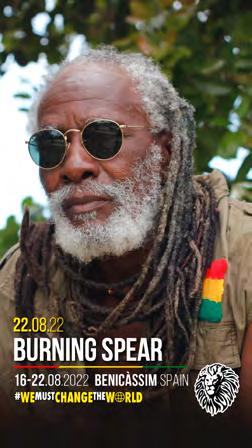


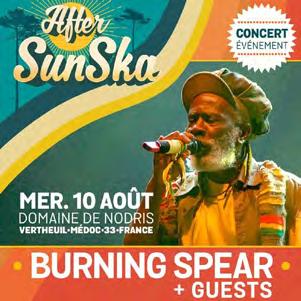


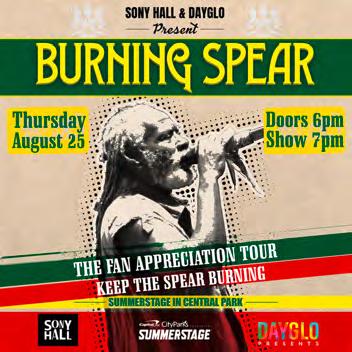
Well, I feel (good) about doing a few shows in the USA and a few shows in Europe. I feel strong about it, positive about it. And we are going to go there and have a nice time and - you know - be happy! The rehearsals are going good, you know. We’ve done three days already and the dress rehearsal is coming
up in July. We are going to be doing another three days rehearsals and then we are going to push out and start the ball rolling. Oh yeah, I’m always happy with the musicians I work with. They have been working with me and we try to maintain that happiness, the oneness we feed off each other for, it’s our work and we are going to get it done together.
INTERVIEW BURNING SPEAR 159
SPEAR ON ENJOYING RETIREMENT...

Well, I’m enjoying it, you know? There is no calls, no interviews and that. I can do what I want to do, when I want to do it. So, it’s very enjoyable. Retirement is very enjoyable. There’s no difficult part in my retirement, everything is running smooth.
SPEAR ON THE NEW NO DESTROYER ALBUM...
Well, the No Destroyer album, it’s an unreleased album, going on about eleven years now. I myself just don’t know when I’m going to be releasing it. But I know at some time that it will be released. This album was done in the Magic Shop you know. It was recorded in the Magic Shop and it was mixed in the Magic Shop and mastered at Sterling Sound, New York. So, the people, especially my fans, they just have to have a little patience and they will receive this album when the time is right. Oh yeah, it’s a mixture, a mixture of songs, you know, each track carrying a different message, and it’s an album that the people will enjoy. They will listen and they will feel comfortable about the album and the lyrics and the arrangement and what I did with my vocals and it’s a very strong, outstanding unreleased album.
SPEAR ON HIS RECENT SINGLE RELEASE...
Oh yes, I am always happy about my work, a single or an album. It’s a strong single, you know. It came out at the right time. But - as I said - these tracks exist for many years before I even think about releasing a single and the single Mommy is a very strong interesting track. You know, one what people can relate to, especially at a time like now. Listening to what has been going on throughout the world.

160 INTERVIEW BURNING SPEAR
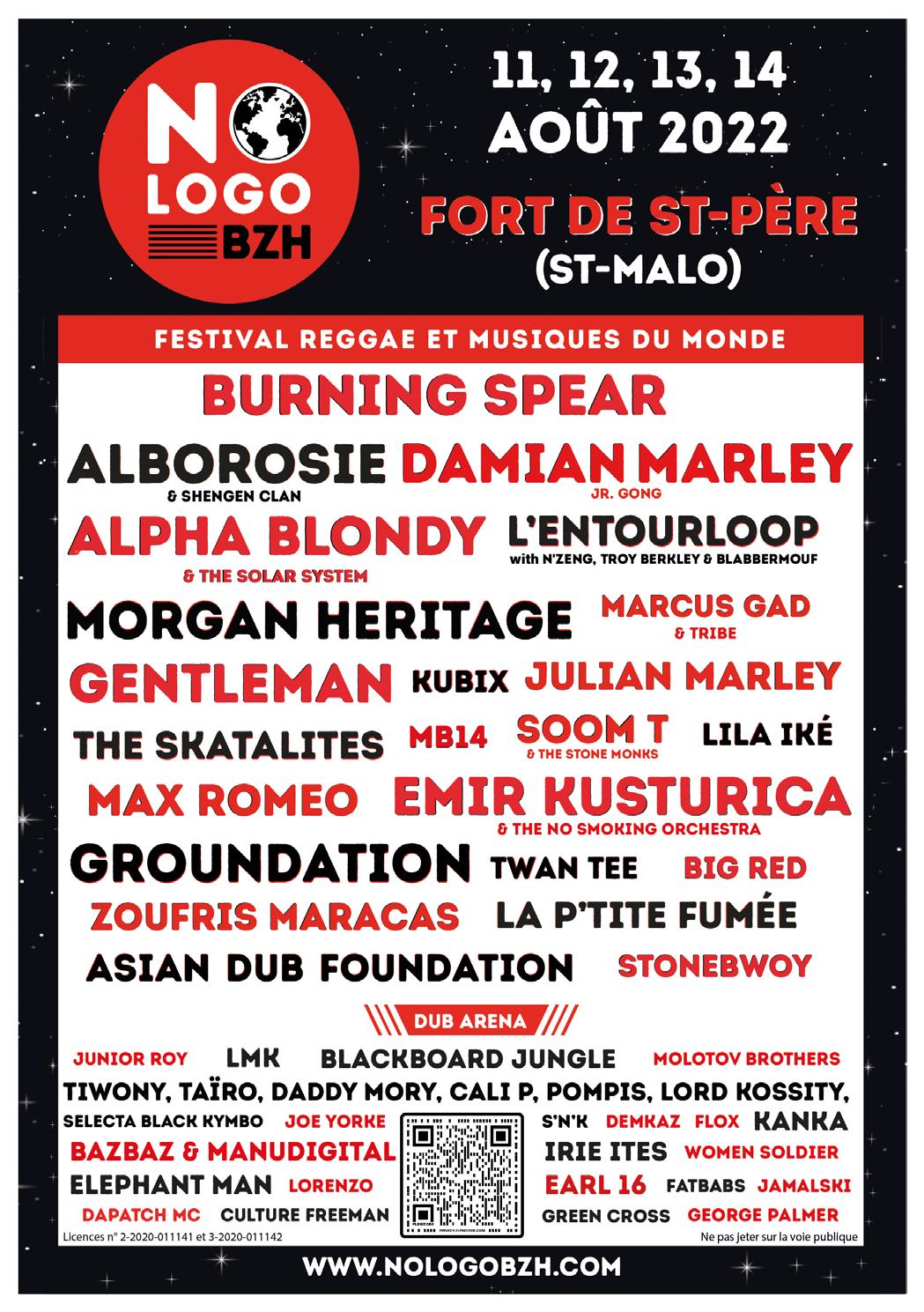
SPEAR ON HIS CHARITY WORK IN JAMAICA...
It’s very important. I always think that a person who needs something, that’s the person you should really try to help. The person who wants something. You might come to me, because if you ask, you will get it. But did you really need it? No, so I try to find the people who really need something. And I try to help. You know, you don’t have to be a rich person to help somebody, or to give something. So, I have been dealing with a lot of people, you know. I help the infants’ school, so that they have a nice Easter. And I help the infirmary, and other places back in St. Mary’s, like the hospital and the children. And it’s going to continue to go on and on and on. But that is what I see and that is what I would feel to help in that kind of situation. But those who think because they might know Mr Rodney, or the name might ring a bell, they are going to ask for something where they just don’t need it. So, I’m here to deal with the people back home who really need something.
SPEAR ON WHY HE WENT PUBLIC ABOUT HIS COVID VACCINATION...
Well, there was nothing to hide. It’s not a secret. And it’s not like I’m going to get into something where I’m going to hurt myself and look how many people - great people, celebrity names - they all took it and are still alive. So, I don’t see the reason why I shouldn’t take it. If there’s a virus you have to protect yourself. Your health comes first.
SPEAR ON HIS GREATEST ACHIEVEMENT IN LIFE...
It’s ‘Life’. You know, without life, you can’t do anything. Without life, you can’t say anything, without life you can’t go no place. My greatest achievement from that time until this time is life. I’m alive. You know good things can happen! And my happiest memory in life is when I wake up in the morning and I’m alive!
SPEAR ON HIS GREATEST ACHIEVEMENT IN MUSIC...
My greatest achievement in music is [ha-
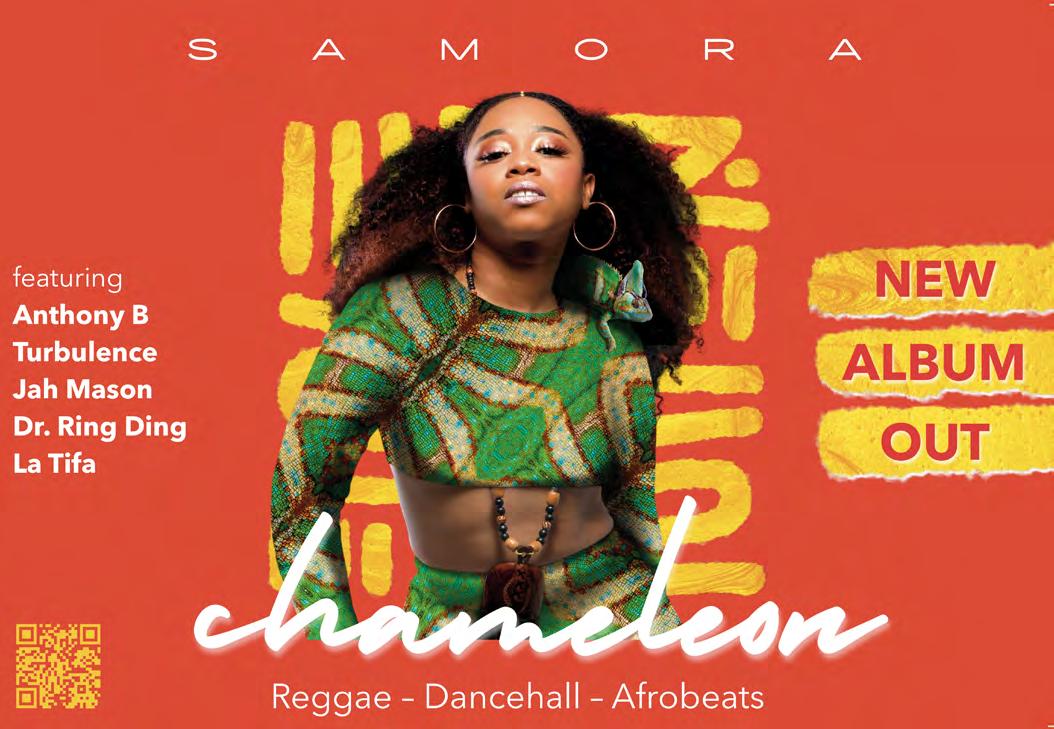
162 INTERVIEW BURNING SPEAR
ving] the people who always be there for me. You know, even when I’m not touring or working, they always be there and they never stop listening to Burning Spear. And what I appreciate about my fans [is] they always pass the music on to their children, because their children grow up in this kind of music situation. And when they reach their age, they are going to pass it onto their children and children and children. So it’s moving on you know, generation after generation will be listening to Burning Spear music. Oh yeah, you can never forget. I can never forget the music you know. Music is what I is. Music is what I present, music is what I give, so I can never forget the music. You know, you have to remember, I get started in the business in 1969. And you know from 1969 until this time, I still remember music, even when I’m not touring. It’s the way it goes. I will never forget where I’m coming from musically, or where I get started from musically, and what happened. I will never forget that.
SPEAR ON THE ROAD FROM POVERTY TO SUCCESS...
Well, I wasn’t thinking about being successful, to be honest. You know, I see it as a work, you know? I know, I identify that this is more like a gift that was given to me by the Most High [Jah Rastafari]. You know, with my creativity, and since that gift was given to me from that time until this time, I still maintain my creativity, even when I’m not going into the studio or doing anything musically. The most enjoyable part in my success is to see what I have been doing and [being] appreciated by the people on a worldwide level.
SPEAR ON THE HARDEST PART OF HIS JOURNEY TO SUCCESS...

Well, you know, the journey is not an easy journey. I’m standing up as an independent artist. It’s not easy. When working with a record company you would have difficulties. So, I have had ups and downs, but nevertheless, I get through! Some time ago, before I really understand about independence, I thought it was easy. But it’s not easy. It’s not like the cotton what were sowed and picked, what was before with the people, or before us, you know? It’s a journey. So I learn a lot.
SPEAR ON WHO HAS HAD THE GREATEST INFLUENCE ON HIS LIFE...
Well, to be honest, it’s Marcus Garvey Marcus Garvey was one of the outstanding persons I would be looking on at all levels, knowing that he has done so much good work outside Jamaica and at the same time, doing it for Jamaica. I think that - right now - the time is right for the Marcus Garvey record to be free, and the time is right to have a public holiday for Marcus Garvey. And the time is right to have a subject in school on Marcus Garvey, starting from the infant school upwards. And the time is right for the people to come together and to make sure that it takes place.
INTERVIEW BURNING SPEAR 163
SPEAR ON HIS GREATEST DISAPPOINTMENT/ REGRET IN LIFE...
My greatest disappointment? No, there were no disappointments in my life. Coming up as a young man you know, you have to learn. So, I wouldn’t say, coming up in my life, there were at some time a disappointment. No, there was no disappointment in my life. What happened, it had to happen. And that is how we get wise. That is how we grow up. That is how we start to understand and get the fullness of life as a young man coming up. No, you cannot (have) regrets in life. You know, “the weak make few and the strong make many” [Note: This quote is attributed to Moses in his exchange with the Pharoah]. So, there is no regrets. I’m alive. I have to give thanks and appreciate that.
SPEAR ON CONTEMPORARY MUSIC/ARTISTS...
Oh! The music business is different now. A lot of artists [from] originally is not here like before. Do I listen to the ‘up and coming’ young people? I don’t listen much to the ‘up and coming’ young people. But nevertheless, the music will continue. I know from these ‘up and coming’ people there will be someone who is standing up for something what makes sense in the music. No, to be honest I’m not so familiar with the young artists right now. I’m more like listening to blues and jazz maybe. That was my main man, listening to Toots and [the] Maytals and many other artists like the Heptones and the Mighty Diamonds They are the people I would be listening to when I feel like listening to music. Of course, if I heard something that makes sense, from the up and coming artists, I will be listening to it (and) I would give my view about what I heard.
SPEAR ON THE WORLD TODAY...
Well, in my understanding, I know that from the first time Africa was invaded. That’s when we start to feel our pain –which is Mama Africa. I know that they work us and they chain us, I know that. I
know what they did during the days of slavery, but the drum it still beat during the days of slavery. I know that. I know [that] Marcus Garvey say “Africa for Africa, those abroad and those at home”. Martin Luther King too – he said “We have a dream”. You know, we push that wheelbarrow with the big, bowed wheel and the mud was so thick and it was built by slaves. They beat us with whips - not free.
SPEAR ON REMAINING IN NEW YORK...
The world is my town. Any place I go, that’s my town. You know, who is made to say I will be here for the rest of my life or where am I going to be for the rest of my life?
For the rest of my life, I’d like to just live, you know. Nobody knows what’s going to happen.
SPEAR – STRICT OR LIBERAL RASTAMAN?
I’m a Rastaman you know. I was born a Rastaman. You know, I’ve been living as a Rastaman. I’ve been doing things as a Rastaman. I talk like a Rastaman. So, what more could I ask for, what more could I really talk about, you know? People is very important in every country, the people come first. The people is the foundation of every country, cities, towns, districts, villages. You just watch and see and see what’s going on and how the wheels are going to turn in what direction and when. And keep living your life and live it the best you can. Be reasonable with yourself and be reasonable with people.
SPEAR – FINAL COMMENT - ANYTHING THE INTERVIEWER OMITTED?
That’s a nice one. Yes, you know I would like to say you know … (Spear starts to sing) “Reggae artists, singers and players of instruments, we are they who feel reggae pain, no matter what they say about you and I, we got the strength to stand up strong. Reggae music put food on them table, I pay my reggae price and I know my rights”. Keep the Spear Burning. One Love. Be safe. Jah is real. Thank you for thanking me.
164 INTERVIEW BURNING SPEAR






























































 BY GARDY STEIN PHOTOS BY AUGUSTO STAHLKE
BY GARDY STEIN PHOTOS BY AUGUSTO STAHLKE



























 DON CORLEON COPELAND FORBES TONY FISHER
DON CORLEON COPELAND FORBES TONY FISHER

























































































































































































































